


























On Motzei Shabbos, we felt punched in the gut when we heard the news of the deaths of six hostages, Ori Danino, Carmel Gat, Hersh Goldberg-Polin, Eden Yerushalmi, Alexander Lobanov, and Almog Sarusi, Hy”d. It was a sharp, personal loss, piercing and strong. And that loss wasn’t just felt by those in the Jewish community. These hostages had been on people’s minds and consciousness. They had become part of their world, symbolizing the suffering of so many who had been kidnapped and dragged into Gaza by Hamas terrorists on October 7.
Hersh was by far the most prominent hostage who was being held in Hamas hands. It wasn’t because he was an accomplished professional or a businessman. Hersh was just 23 years old. He loved traveling the world and dreaming about visiting far-flung places. His room was adorned with maps and atlases. He loved music. He loved to play soccer.
Although Hersh wasn’t frum, he was respectful towards his parents’ religious way of life. When he came home, he made sure to follow certain halachos, accepting upon himself certain things that he knew his parents followed. He was a good friend; he went to the Nova festival to celebrate his friend’s birthday. He was brave; during the massacre, Hersh threw grenades back at their attackers. Ultimately, his arm was blown off, and he was captured and brought into Gaza with his arm mangled and bleeding from the elbow down.
Most of us picture Hersh with floppy hair and a luminous smile on his face. That is how his parents wanted the world to know him: as a happy-go-lucky, sweet boy. They campaigned the world-over to teach people about who Hersh was. And sadly, that is how his parents will forever remember him: as a sweet boy. A sweet, young boy who never had the chance to grow up. Never had the chance to follow his dreams. Never had the chance to become something other than a sweet, young boy.
Rachel, Hersh’s mother, who had been the ultimate advocate for her son, made her final farewell to Hersh on Monday. “Now you will be forever our beautiful boy,” she lamented. “You will stay energetic, kind, patient, curious, funny, irreverent, pensive. Forever handsome. Forever young. Forever my sweet boy.”
Hersh is one boy who was murdered by Hamas terrorists 330 days after being taken captive. But there are so many others – hundreds who were massacred on October 7 and others who were murdered while in captivity – who will remain forever young. They will never again speak with their mothers and fathers and sisters and brothers. Their children will never be able to hug them and kiss them good night. Their friends will never be able to spend time with them. They will never be able to actualize their dreams and hope for a better tomorrow.
This week was a hard week for all of us. As Rachel said on Monday, standing before her son’s lifeless body, “Amidst the inexplicable agony, terror, anguish, desperation and fear, we became absolutely certain that you were coming home to us alive. But it was not to be.”
We all shared that certainty. We believed, with full hearts, that all our prayers and mitzvos would help to bring Hersh – and all the other hostages –back home. And our hopes were dashed on Motzei Shabbos.
But that is not to say that our prayers and efforts were for naught. We know – with certainty – that Hashem, our Father, is supporting us and guiding us. He hears our prayers and sees our deeds. And it is our fervent hope that He will answer our prayers and bring the Ultimate peace to our nation, when we will all be brought to our rightful Home. Please, let it be soon.
Wishing you a wonderful week, Shoshana

Yitzy Halpern, PUBLISHER publisher@fivetownsjewishhome.com
Yosef Feinerman, MANAGING EDITOR ads@fivetownsjewishhome.com
Shoshana Soroka, EDITOR editor@fivetownsjewishhome.com
Nate Davis
Editorial Assistant
Nechama Wein
Copy Editor
Rachel Bergida Shana Brecher
Lani White
Design & Production
Gabe Solomon Distribution & Logistics
P.O. BOX 266
Lawrence, NY 11559
Phone | 516-734-0858
Fax | 516-734-0857
Classified Deadline: Monday 5:00PM classifieds@fivetownsjewishhome.com text 443-929-4003
PAYMENT VIA CREDIT CARD MUST BE SUBMITTED ALONG WITH CLASSIFIED ADS
The Jewish Home is an independent weekly magazine. Opinions expressed by writers are not necessarily the opinions of the publisher or editor. The Jewish Home is not responsible for typographical errors, or for the kashrus of any product or business advertised within. The Jewish Home contains words of Torah. Please treat accordingly.








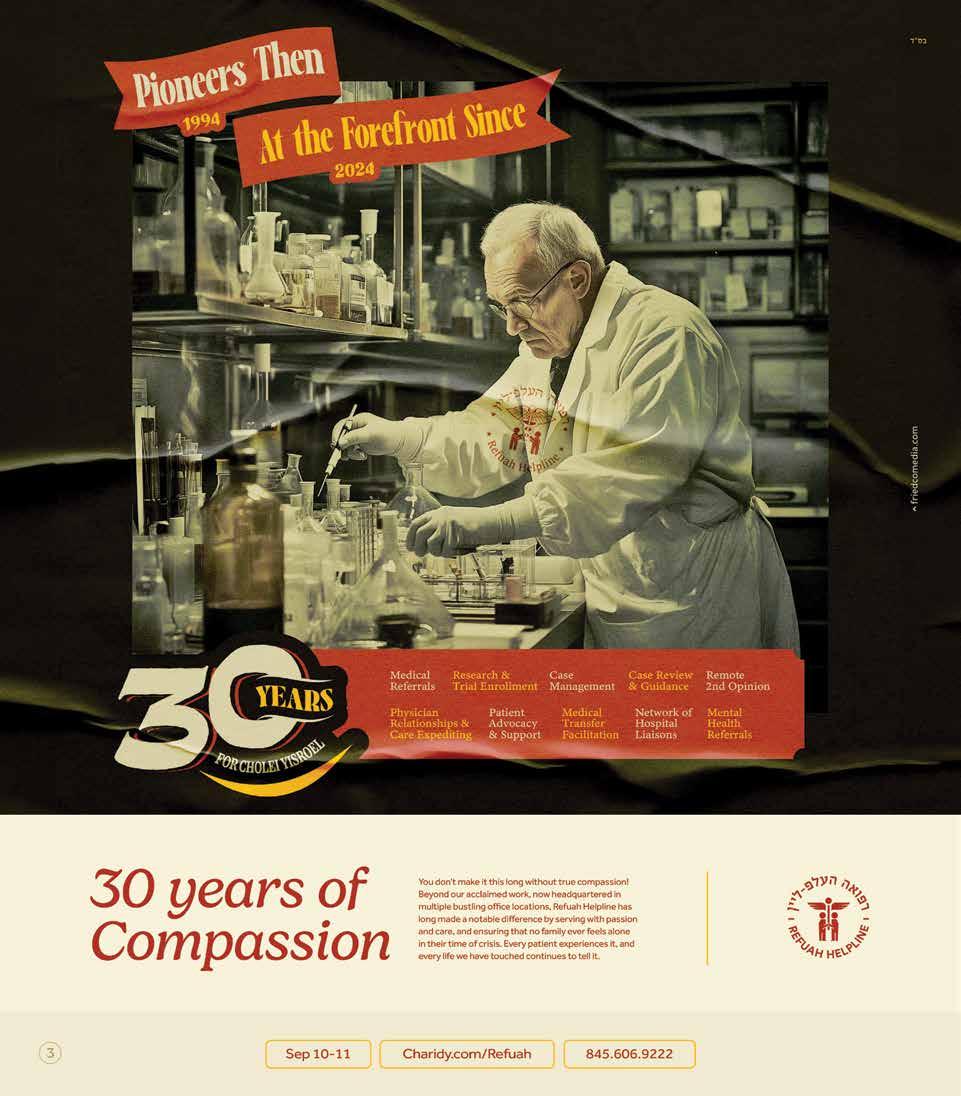


Dear Editor,
There was a well-known personage from Back Lawrence by the name of R’ Mordechai Kriger, zt”l. He supported yeshivas, had a great tennis game and loved Torah. He put out his own sefarim on Chumash entitled Chasdei Hashem. The sefarim are endorsed by all of the gedolim of our time. What stands out is that in many of the endorsements by the gedolim, they highlight the fact that R’ Kriger’s greatest pleasure was telling them over his chiddushei Torah, which they all enjoyed. One could say that the chiddushim were his lifeline. In probing the name of the sefer, Chasdei Hashem, it becomes clear that a primary chesed G-d gives us is the ability to study His Torah and share novelties with others. Where do we find an allusion to this? One place could be from the Friday night words in Eshat Chayil penned by Shlomo HaMalech, (Mishlei 31:26), “Piha patcha bechachma, VeTorat chesed al leshona.” In this verse, Torah is clearly referenced as a chesed, but more importantly, as relating to R’ Kriger, “it is on the tongue.” R Kriger’s tongue was his divrei Torah, that were constantly relayed to all that came in contact with him.
Steven Genack
Dear Editor,
The day after it was announced that Hersh Goldberg-Polin was murdered, my son told me, “I now understand that if you are an American hostage anywhere in the world, America won’t be able to rescue you.” I sadly had to tell him that this is nothing new. I don’t recall America rescuing any hostages except for a few “famous” or “important” hostages, such as
Britney Griner, usually by prisoner swaps that freed dangerous terrorists. Former president Jimmy Carter did try a rescue attempt to free American hostages in Iran in the late ‘70s, but that failed.
President Biden made a horrific statement by stating that Bibi Netanyahu hasn’t been doing enough to free the hostages. For the point of this argument, I’m focusing specifically on American hostages such as Hersh, and none of the solely Israeli hostages. Bibi has tried to directly negotiate with Hamas, and IDF has tried to physically rescue hostages. Sometimes, they were successful; at other times, they failed. But actual concrete efforts have been made. Biden has done zero other than pressure and blame Bibi. We can argue regarding the specific efficacies of Bibi’s thinking, reasoning and tactics. But Biden and anyone else who has done zero is not qualified to blame someone who has done “not enough.”
Everyone is talking about an “immediate ceasefire.” Let’s be realistic, while perhaps, forgoing the past. Hamas has outrightly vowed that their goal is to eliminate Jews and Israel. They’re not hiding this and it’s not empty, doubtful, confusing rhetoric. Hamas is absolute evil – a concept that Israel understands far better than America ever has. There is no compromise or deals made with evil. I understand that we want our hostages returned. (Incidentally, we have to question why dead people are called “hostages,” as they consistently have been regarding who Hamas possesses). But recall that the current Hamas leader, Sinwar, was released in exchange for Gilad Shalit, in 2011. Can you imagine the escalation of violence in Israel if they released
Continued on page 12

more terrorists to Hamas in exchange for hostages and IDF withdrawal from Gaza? I don’t have a great solution on how to safely and effectively release hostages. But I know that if I’m not placing any effort to do it, I’m not one to tell Bibi that he’s not doing enough. That comment should be left to the hostage families, I think, not even other Israeli citizens.
Daniel Feldman
Dear Editor,
I had the honor last week of meeting with five soldiers who recently served in the Israeli army. They spoke about their time in Gaza and mentioned that they had been in the West Bank too. One of them told us about being in the north and the struggles of the soldiers serving in the north. After reading your article, “The Forgotten War,” about the war in the north, I was able to feel more and understand more of the battles they faced in the north. Although much of the country and the world is focused on Gaza, Israel is facing a huge threat from Hezbollah in the north of the country. Much of the people there are still not able to return to their homes; many of their homes are damaged and they are under constant rocket threat. This is a huge crisis which
is largely ignored.
Alan Gershon
Dear Editor,
One of the fastest and most effective ways of creating a shortage of goods or services in the economy is through price controls – the scenario in which the government artificially lowers the price of a good to make it cheaper to consumers. The fatal flaw of price controls is that by artificially lowering the price of a product, consumers will demand more of that product, since it’s cheaper now than before. Since the supply of that product hasn’t increased to meet the rise in demand, the government has created a shortage.
Let’s use bread as an example to demonstrate this point further. Suppose the price of a loaf of bread rises from $3 to $7, and the government decides that since the current price of $7 is too expensive for consumers, it requires the grocery store owner to lower the price to $4. Since the government has made the price of bread artificially cheaper, consumer demand for bread increases, and since the amount of bread available to consumers hasn’t increased, there’s now a shortage of bread.
There is, of course, a very simple fix to

this problem, and that is to have suppliers increase the supply of bread to meet the rise in demand, so now supply and demand are exactly equal and the shortage has been alleviated. But they won’t do that. Why? It’s because there’s very little profit to be earned when the price of bread is low. As a general rule, suppliers produce more of a product when prices are higher and less when prices are lower. In our present example, suppliers would prefer to allocate their money and resources to products whose prices are higher because the potential profits to be made are higher as well.
The primary reason the topic of price controls is so obscured is because people aren’t looking at the whole picture. It’s human nature to consider only the immediate consequences, or short-term effects, of an economic policy, and ignore the long-term effects of such a policy. The same is true with price controls. It seems as though people have forgotten that the economy is like two sides of the same coin; there’s the demand side or consumer side of the economy, and then there’s the supply side or producer side of the economy. Discussions of price controls tend to only consider the demand side of the equation. People see the government lowering prices on a product that would otherwise be very expensive, and they cheer such a move. But their analysis stops there. They fail to recognize that such a move only artificially stimulates demand – it doesn’t increase the availability of that product, which now brings us to the supply side of the economy. Since prices are relatively low, and thus potential profits are low as well, suppliers won’t increase production to meet the increase in demand. They’ll simply take their money elsewhere where there’s a profit to be made.
This is why it’s imperative that when we consider the merits or demerits of any economic policy, we look at the whole picture; that we consider both the shortterm and long-term effects of such a policy. This is the definition of a good economist.
Rafi Metz
Dear Editor, Kamala Harris’ DNC campaign message was one of “freedom and joy” but no
substance on how to resolve key issues facing the country that the Democrats had created. These issues include an open border with 10 million-plus unvetted migrants, a surge of crime in cities and heartland, and an unprecedented inflation with wildly high food and gas prices Instead of focusing on these issues, the Harris/Walz campaign pretended that Donald Trump had been in office with allusions to having four more years of chaos should he regain the presidency.
These brainwashing statements were brought to you by the key purveyors of the past “smoke and mirror” policies: Michelle and Barack Obama, Hillary and Bill Clinton, Nancy Pelosi, Chuck Schumer and Oprah Winfrey, all personalities, but short on policy objectives as well as results. Unlike the Republicans who brought everyday Americans in to discuss their issues at the RNC, Democrats had to turn to the past to infuse the Harris/ Walz campaign with life. They couldn’t defend the policies of the Biden/Harris administration that oversaw: the fiasco withdrawal from Afghanistan, the overrun borders of the United States, the loss of life due to the fentanyl crisis with over 100,000 deaths, the trafficking of over 300,000 unaccompanied children, as well as “cooking the books” by not including major cities such as Chicago and L.A. in crime statistics, as well as phony job number creation that the Department of Commerce had to correct by almost one million (818,000 jobs).
Americans are underinformed and misinformed because of the mainstream media. What most Americans don’t understand is that a campaign built on freedom and joy was used by the Nazis and Communists to get their people to go along with their propaganda. The Nazis had a sign over the entrance to their concentration camps “arbeit macht frei” or “work shall set you free.” The Communists had a saying that “Mao’s words bring joy!” In both cases, millions of people were sacrificed to the politics of freedom and joy. Let’s be sensible and not fall for that again!
Jan Henock Woodmere, NY





The United States seized a plane belonging to Venezuelan President Nicolas Maduro to Florida on Monday after it was determined that its acquisition was in violation of U.S. sanctions, among other criminal issues. The plane had been in the Dominican Republican.
Tensions have been rising between the two countries. The seizure only tightens the pressure as the U.S. continues to investigate what it regards as corrupt practices by Venezuela’s government.
“This sends a message all the way up to the top,” one U.S. official said. “Seizing the foreign head of state’s plane is unheard-of for criminal matters. We’re sending a clear message here that no one is above the law, no one is above the reach of U.S. sanctions.”
According to officials, the plane is equivalent to the U.S.’s Air Force One and had been pictured in previous state visits by Maduro around the world.
The Dominican Republic’s President Luis Abinader said the plane seized by the U.S. on Monday was not registered under the name of the Venezuelan government nor Maduro, but rather under “the name of an individual.”
Foreign Minister of the Dominican Republic Roberto Álvarez said the country’s Attorney General’s Office received an order last May from a national court to “immobilize” the plane. The U.S. had requested it be immobilized so they could search it for “evidence and objects linked to fraud activities, smuggling of goods for illicit activities and money laundering,” he said.
U.S. Attorney General Merrick Garland said that “the Justice Department
seized an aircraft we allege was illegally purchased for $13 million through a shell company and smuggled out of the United States for use by Nicolás Maduro and his cronies.”
It was purchased from a company in Florida and was illegally exported in April 2023 from the United States to Venezuela through the Caribbean. It was used for Maduro’s international travels and flew “almost exclusively to and from a military base in Venezuela,” according to the Justice Department. The last registered flight was in March, flying from Caracas to the Dominican capital of Santo Domingo.
The Venezuelan government described the seizure as “piracy” in a statement on Monday and accused Washington of escalating “aggression” toward Maduro’s government following a contested presidential election this July.
“Once again, the authorities of the USA, in a recurring criminal practice that could not be labeled anything but piracy, have illegally seized an aircraft that has been used by the president of the Republic, justifying its action in coercive measures that, illegally and unilaterally, they impose around the world,” it said.
“The United States has already demonstrated that it uses its economic and military power to intimidate and pressure states such as the Dominican Republic to serve as accomplices in its criminal acts. This is an example of the supposed ‘rules-based order,’ which, disregarding international law, seeks to establish the law of the strongest,” it said.
Maduro has been in power since 2013. Poor economic conditions, food shortages and limited access to health care have compelled more than 7.7 million people to flee Venezuela, marking the largest displacement of people in the Western Hemisphere.

The Alternative for Germany (AfD) became the first far-right party to win a state election in Germany since the Nazi era. The party won in Thuringia on Sunday under Bjorn Hocke. In Saxony,

it finished just behind the mainstream center-right Christian Democratic Union, which leads the national opposition. The victories dealt a blow to Chancellor Olaf Scholz’s fractious government with a year to go before the next federal election. Now, Scholz’s government needs to find a way to govern these two regions without involving AfD.
In another worrying development for Germany’s mainstream, the fledgling Sahra Wagenknecht Alliance (BSW) – a far-left party that has questioned the country’s support for Ukraine and shares some of the AfD’s anti-immigration sentiment – came third in both states, despite only being founded earlier this year.
Scholz’s center-left SPD coalition slumped to a dismal fifth in both states. If federal elections were held now, recent polls show the AfD could become the second-largest group in the Bundestag, with the SDP trailing in third.
Scholz described the results as “bitter” and, calling on the European principle of the “cordon sanitaire,” urged mainstream parties in Thuringia and Saxony to exclude the AfD from any state governing coalitions.
“All democratic parties are now called upon to form stable governments without right-wing extremists,” Scholz said in a
statement. “Our country cannot and must not get used to this. The AfD is damaging Germany. It is weakening the economy, dividing society and ruining our country’s reputation.”
Alice Weidel, co-leader of the AfD, told German public broadcaster ARD that the results were a “requiem” for Scholz’s coalition and questioned “whether it can continue to govern at all.”
At a campaign rally, Weidel said that Germany has become “a country without borders, where anyone can come in and we do nothing about it.”
AfD’s goal is “the immediate expulsion of all illegal immigrants from our country. All criminals, all extremists must leave,” she said.
AfD was founded in 2013. Since then, it has doubled down on its economic grievances and its opposition to immigration.
The king of New Zealand’s indigenous Māori people, Kiingi Tuheitia Pootatau Te Wherowhero VII, died on Friday at the age of 69.
“The death of Kiingi Tuheitia is a moment of great sadness for followers of Te

Kiingitanga, Maaoridom and the entire nation,” spokesperson Rahui Papa said in a statement.
The king had been in the hospital recovering from heart surgery just days after celebrating the 18th anniversary of his coronation. He had been suffering from cancer and diabetes in recent years.

The position of Māori monarch originated in 1858 during a movement known as Kiingitanga that aimed to strengthen indigenous resistance to colonialism. Considered the chief of several tribes, the monarch does not have judicial or legal authority but plays an important ceremonial role.
The Māori community, which accounts for nearly a fifth of New Zealand’s more than 5 million population, often faces discrimination that results in poorer health and education outcomes and higher rates of incarceration.
In January, Tuheitia hosted more than 10,000 Māori for talks on how to respond to government plans to cancel reforms that were seen by many indigenous people as undermining their rights. New Zealand’s government has proposed dissolving the country’s Māori Health Authority, rolling back the use of the Māori language and ending limits on tobacco sales – a move Māori leaders had sought to cut high rates of smoking in their community.
The King was crowned on August 21, 2006, following the death of his mother, Te Arikinui Dame Te Atairangikaahu His body will lie in state for five days before being buried in a sacred burial site.
New Zealand Prime Minister Christopher Luxon led tributes to Tuheitia and said the country would mourn the king’s death.
Britain’s King Charles said in a statement he and Queen Camilla were “profoundly saddened” to learn of Tuheitia’s death and referenced a Maori proverb, saying that “a mighty Totora tree has fallen.”
Māori monarchs are not hereditary by right. Leaders of the tribes associated with the Kiingitanga appoint a new monarch on the day of the previous monarch’s funeral and before burial.
Eleven people were killed on Tuesday morning in Tai’an city in China when a bus slammed into them as they waited at the gate of the middle school. Thirteen others were injured.
The bus, specially customized for transporting students, “lost control” when it drove into an intersection, the public security bureau in Dongping county said in a statement.
Five students and six parents were killed, it said. One of the injured was in critical condition while the others were stable, according to police.
China has seen a spate of car-ramming and stabbing attacks targeting schoolchildren in recent years, as well as deadly road traffic accidents involving school buses.
In March, a car careened into a group of students in Dezhou, killing two people and leaving six others severely injured. Later in the month, a bus carrying students collided with a dump truck in the city of Nantong in the eastern province of Jiangsu, killing one person and injuring eight others.

Russian President Vladimir Putin arrived in Mongolia late Monday for his first state visit to a member of the International Criminal Court since it issued a warrant for his arrest in March 2023.
The court accused Putin and his commissioner for children’s rights of being personally responsible for the “unlawful deportation” and transfer of Ukrainian children to Russia.
In advance of Putin’s trip, the ICC stated that Mongolia was obligated to arrest Putin, but Mongolia is heavily dependent on Russia for fuel, and an arrest was considered extremely unlikely. Russia has shrugged off the possibility.
“There are no worries. We have a

20 great dialogue with our friends from Mongolia,” Dmitry Peskov, the Kremlin’s spokesperson, told reporters Friday, noting that “all aspects of the visit have been thoroughly prepared.”
Putin was greeted by what appeared to be a Mongolian military guard at the airport and was spending the night in the capital, Ulaanbaatar, a sign that he is comfortable being in the country.
Putin’s visit Tuesday, at the invitation of Mongolian President Ukhnaa Khurelsukh and in defiance of the ICC arrest warrant, serves as a reminder that Russia still commands strategic sway over its southern neighbor despite efforts to hedge.
With the visit, “Putin gets a symbolic win for sure,” said Alexander Gabuev, director of the Carnegie Russia Eurasia Center in Berlin. For Mongolia, he said, the visit shows that the need to maintain the relationship with Russia outweighs the country’s pledge in 2002 when it signed the Rome Statute ratifying its membership in the ICC.
The international court, based in The Hague, issued a warrant for Putin’s arrest last year, accusing him of committing war crimes with the abduction and deportation of Ukrainian children.
The ICC has no enforcement mech-
anism. Countries that have signed on to the court are supposed to detain those who are subject to its arrest warrants. Russia is not a signatory to the court and has consistently rejected its authority.
A Western diplomat who spoke on the condition of anonymity said the Mongolian government summoned Western envoys to explain their reasoning behind Putin’s visit. Among them was the need to secure more supplies of fuel and electricity from Russia to prevent a repeat of the shortages the country faced last winter.
(© The New York Times)

There are around 4 million stray dogs roaming the streets of Turkey. This summer, parliament passed a law to regulate
these animals. Some of what’s required includes rounding up the strays and placing them in an overcrowded shelter network along with euthanizing the dogs that are feral.
Animal rights activists, fearing a mass culling, have dubbed it the “massacre law.”
The measure was introduced by President Recep Tayyip Erdogan’s ruling party, mostly due to dog attacks that have taken place, particularly against children. But not everyone is happy with the proposed measures. Some mayors belonging to the political opposition have said they will not implement it, under threat of incarceration.
Activists say they fear that the killing of dogs is already underway. In a neighborhood on the outskirts of Ankara, Turkey’s capital, they recently filmed what they said were the corpses of canines dumped in plastic bags in dirt ditches. Haydar Ozkan, deputy chairman of the Animals’ Rights to Live Confederation, said he witnessed “a terrible scene” in the neighborhood, called Altindag. The government has said that those dogs were not killed by the government and that the site was a graveyard for dogs who “died of natural causes, traffic accidents or infections.”
The first draft of the legislation, circulated in May, proposed killing stray dogs that were not adopted from shelters within a month. After a backlash, including protests, Erdogan’s ruling Justice and Development Party presented a watered-down version in July. The government defended the measure as the only solution to dog attacks, traffic accidents involving the animals, and outbreaks of disease, including rabies.
The amount of stray dogs roaming the country has increased exponentially each year, according to Erdogan. They “attack children, adults, elderly people and other animals,” he said.
“Do not compromise,” he urged, referring to the measure’s passage. “G-d willing, we will finish this.”
Dogs have been a part of Turkey for many years. In fact, one writer described late-19th-century Istanbul as “one huge dog-kennel.”
“They are the masters of the road,” he wrote.
In 1910, during the rule of the Ottoman Empire, in an effort to curb the canine population, more than 80,000 dogs were transported to Sivriada, a small island off Istanbul, and left with no food or water.


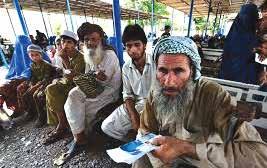
Last Friday, Germany deported twenty-eight convicted Afghan criminals, sending the nationals back to Kabul, Afghanistan, by plane. This deportation, which the government found necessary due to recent terrorist attacks in Germany, is Berlin’s first since the Taliban regained control of Afghanistan.
Der Spiegel, a German news company, reported that €1,000 ($1,100) was given to each of the deported criminals. An interior ministry spokesperson for the German state of Saxony would not confirm the report’s validity, however. All the deportees were male. Berlin opted to deport the criminals after months of diplomatic negotiations and preparations, Der
Spiegel added. Steffen Hebestreit, a German government spokesman, clarified that Germany had no direct talks with the Taliban, but rather, reached the decision with help from regional meditators.
According to flight trackers, the airplane used for the deportation flight was a Boeing 787, which flew with Qatar Airlines and departed from the Saxony city of Leipzig at 6:55 a.m.
Following a knife attack by Afghan and Syrian nationals last May on residents of the city of Mannheim, the government of Germany has made “intensive efforts” to deport terrorists and dangerous criminals, said Hebestreit. During that particular attack, a police officer was killed and a number of others were wounded. According to officials, the attackers, including a 25-year-old refugee from Afghanistan, were motivated by an Islamist extremist ideology.
On August 23, Germany saw another knife attack. An ISIS-affiliated 26-yearold Syrian man purportedly murdered three people in Solingen, a city in the western state of North Rhine-Westphalia. According to officials, the suspect surrendered to police and confessed.
Recent attacks by migrants have prompted many to condemn the government and Chancellor Olaf Scholz for

their failure to address the problem. In an attempt to fix the issues, the government announced last Thursday that it would implement new security measures, including strict weapon laws and the deportations of refugees and illegal immigrants.
“We will have to do everything we can to ensure that those who cannot and are not allowed to stay in Germany are repatriated and deported,” Scholz said during a visit to Solingen.
In 2015, amid the European migrant crisis, Angela Merkel, the then-Chancellor of Germany, implemented an “opendoor” immigration policy, allowing hundreds of thousands of asylum seekers from Syria and other places to migrate to Germany. Some hailed Merkel’s decision; others condemned her actions.

Last Saturday, Brazil banned X, a social media platform that was acquired by Elon Musk. Now, people in Brazil are blocked from using X’s app and website, as Musk and a Brazilian judge continue to quarrel. If someone in Brazil tries to access the platform, an error screen appears.
The ban was implemented a day after the Supreme Court of Brazil ruled that the platform must be blocked, citing the company’s refusal to publicly appoint a legal representative. In Brazil, all companies are forced to name a legal representative.
Before August 17, X had a legal representative. However, after Supreme Court Justice Alexandre de Moraes threatened X’s legal representatives with legal action if they refused to block certain users from the platform, the company closed its representative offices in Brazil. The move came after months of fighting between X and the Brazilian Supreme Court, which was triggered after the court began demanding that the social media platform ban certain far-right accounts that allegedly spread misinformation.
Although Brazilian officials allege that X refuses to block accounts that promote lies, hate speech, and anti-democratic, Musk maintains that users should enjoy freedom of speech on his platform and
has condemned de Moraes for trying to force X to censor content based on the Brazilian government’s personal preferences. Last Wednesday, de Moraes officially warned Musk, informing him that X would be blocked from Brazil unless he names a representative within twenty-four hours. According to de Moraes, Brazil’s ban on X will continue until Musk follows the order.
“Any and every citizen from any part of the world who has investments in Brazil is subject to the Brazilian constitution and Brazilian laws,” Brazilian President Luiz Inácio Lula da Silva said. “[Musk] can’t go around insulting presidents, insulting deputies, insulting the Senate, insulting the Chamber, insulting the Supreme Court. Who does he think he is?... That guy has to accept the rules of this country, and if this country made a decision through the Supreme Court, he has to comply. If it applies to me, it applies to him.”
The financial accounts of Starlink, a satellite internet company owned by Musk and used by over 250,000 people in Brazil, were frozen in Brazil last Thursday in order to make sure that X pays its legal fines. On Friday, the Supreme Court refused to unfreeze the accounts, despite Starlink’s insistence that it has no connections to X’s legal issues.
“This order is based on an unfounded determination that Starlink should be responsible for the fines levied – unconstitutionally – against X,” Starlink said in a statement on X, adding that although the judicial order doesn’t significantly affect the company as of now, it “prevents Starlink from conducting financial transactions in that country.”
“Many remote schools and hospitals depend on SpaceX’s Starlink!” Musk posted on X, announcing that Starlink will, for the time being, be free in Brazil, since the company is unable to receive payments.
According to Emarketer, a market research company, around 40 million Brazilians used X at least once per month.
For months, tensions have been building in Mexico over the president’s plans to overhaul the judiciary, shaking the country’s political system and straining diplomatic ties with the United States. Last week, those tensions exploded into the open.

President Andrés Manuel López Obrador of Mexico said that his government was “pausing” relations with the U.S. Embassy in response to criticism by the U.S. ambassador over the president’s push in the final weeks of his six-year term to make changes to the judiciary, potentially forcing thousands of judges from their jobs.

“Hopefully there will be a statement from them that they are going to be respectful of the independence of Mexico,” López Obrador said of the United States during his daily news conference. “As long as that doesn’t happen and they continue with that policy, then there is a pause with the Embassy.”
“‘Pause’ means that we are going to take a break,” he added, saying it would also extend to the U.S. State Department. But López Obrador said that overall relations would not be affected, seeking to allay concerns over a potential effect on trade.
It was unclear what such a pause would mean in practical terms. López Obrador did not specify how the pause would play out. But Mexico’s foreign affairs minister, Alicia Bárcena Ibarra, said on social media that the relationship “with our friends and neighbors in North America is a priority and fundamental, and on a daily level remains fluid and normal.”
The president’s remarks came after comments made last week by Ken Salazar, the U.S. ambassador, calling the proposed judicial changes, which include electing judges by popular vote, “a major risk to the functioning of Mexico’s democracy.”
Salazar asserted that the measures could threaten Mexico’s trade relationship with the United States by eroding confidence in Mexico’s legal framework and emboldening drug cartels to “take advantage of politically motivated and inexperienced judges.”
The criticism was a sharp departure from his long conciliatory approach to his relations with López Obrador.
In a statement on Tuesday, the U.S. Embassy affirmed its “utmost respect for
Mexico’s sovereignty” and its “desire to continue its close collaboration with Mexico,” but said that it had “significant concerns that the popular election of judges would neither address judicial corruption nor strengthen the judicial branch.”
(© The New York Times)

On Monday, Britain said it would suspend dozens of arms export licenses with Israel because there is a risk the equipment might be used to commit serious violations of international humanitarian law. The suspension was effective immediately.
British Foreign Secretary David Lammy said the decision to suspend 30 of 350 arms licenses did not amount to a blanket ban or an arms embargo; it only involved items with concerns over their use during the ongoing war between Israel and Hamas in Gaza.
“It is with regret that I inform the House [of Commons, the lower house of parliament] today the assessment I have received leaves me unable to conclude anything other than that for certain UK arms exports to Israel, there does exist a clear risk that they might be used to commit or facilitate a serious violation of international humanitarian law,” Lammy said.
“The UK continues to support Israel’s right to self-defense in accordance with international law,” he added.
Soon after the Labour Party won an election in July, Lammy said he would update a review on arms sales to Israel to ensure these complied with international law.
Unlike the United States, Britain’s government does not give arms directly to Israel, but rather issues licenses for companies to sell weapons, with input
from lawyers on whether they comply with international law.
Responding to the announcement, Foreign Minister Israel Katz said Israel was “disappointed” with recent decisions made by the UK government relating to the war in Gaza.
“Israel is a state of law that operates in accordance with international law and has an independent and respected judicial system,” Katz said. “We expect ally nations like Britain to recognize that every day, and especially mere days after the execution of six Israeli hostages by Hamas terrorists.”
He said that “a step like the one taken now by Britain sends a problematic message to the Hamas terrorist organization and its handlers in Iran,” but that he hoped the relationship between Israel and the UK could remain strong in the future.
Defense Minister Gallant said in a statement that he was “deeply disheartened to learn of the sanctions placed by the UK” and that he stands by the IDF and Israel’s security agencies.
British exports amount to less than one percent of the total arms Israel receives.
The export licenses pertain to components for Israel’s aerial systems, including fighter jets, helicopters, and drones. It does not pertain to the F-35 program, which is a multinational project that pools parts before disbursing them to participating countries, including Israel.
British officials have not said that Israel is violating humanitarian law, but believe there is a serious risk, according to a two-month assessment. The suspension could be lifted in the future if the UK assesses that the risk of violations has diminished.
Britain’s center-left Labour government has repeatedly called for a ceasefire in the Gaza war and for the speeding up of aid deliveries into Gaza since taking power on July 5.
From the tragic day of October 7 to the end of July, approximately 146 square kilometers of vegetation near the Israel-Lebanon border and eight square kilometers of vegetation near the Israel-Gaza border have been burnt, largely due to fires started by rockets sent by Hamas, Hezbollah, and other terrorist organizations, according to a report released last Thursday by the Environmental Protection Ministry.
All bushfires in Israel are man-made, as there are no summer storms in the Jewish state to naturally spark them. Since October 7, Gazan terror groups have fired 13,000 rockets at Israel, while Hezbollah, which is based in Lebanon, has fired around 8,000 projectiles. That number doesn’t include Lebanon’s drones and anti-tank guided missiles, as well as projectiles launched from Yemen and Iraq.

In all, the environmental ministry believes that 145,000 tons of dry vegetation have gone ablaze from October 7 to the end of July. The fires have also reportedly taken a toll on the environment, making up 44% of carbon monoxide emissions during the time, as well as 13% of fine particulate matter (2.5 microns or less), 12% of particulate matter (10 microns or less), seven percent of non-methane volatile organic compounds, and one percent of ammonia and nitrogen and sulfur oxide emissions. Because of the ongoing war in Gaza, nine out of forty big companies based near the northern and southern borders have gotten away with not reporting their emissions, although the law requires them to do so.
However, Israel made some environmental improvements in 2023 compared to 2022. According to the ministry, in 2023, the emissions’ indirect costs, which were mostly accrued from transportation, electricity generation, and industry, would be around NIS 38 billion ($10.3 billion), which was NIS 1.3 billion ($353.5 million) lower than in 2022.

Since October 7, more than 29,000 new immigrants have arrived in the Holy Land from various countries, according to new data released by the Immigration and Absorption Ministry last week.


Immigration and Absorption Minister
Ofir Sofer (Religious Zionists) said the “growing desire to make aliyah right now may lead to tens of thousands of olim in the coming years.”
Thousands of the olim who arrived during the war came during the summer months.
According to the Jewish Agency‘s Global Aliyah Center, more than 30,000 people have opened aliyah files with the Immigration and Absorption Ministry
and agency since October 7.
Data shows that there has been an increase in aliyah inquiries from people in Western countries over the same period last year. For example, France registered a 355% increase over the same period last year with more than 5,500 aliyah files opened. More than 6,000 files were opened in the U.S., a 62% increase. Canada recorded an 87% spike with more than 800 files opened. The UK showed an increase of 63%.
chase tax for the purchase of an apartment, extensive rent assistance in the Negev and Galilee, dedicated programs in academia, significant grants for doctors making aliyah, and an immigrant support system.”
Jewish Agency Chairman Doron Almog said, “These fill the heart and strengthen us in these difficult days. The presence of the olim alongside the State of Israel symbolizes hope.”
World Zionist Organization chairman Yaakov Hagoel sees aliyah as the “fulfillment of the vision of generations before.”
He said, “Even after the October 7 massacre and the continued war for our security, we are witnessing an exciting influx of about 25,000 new immigrants to our country. This is a strong message of determination, faith, and deep love for the Land of Israel. This wave, along with the opening of many other immigration cases, shows the world that the Jewish people are determined to continue building their future here, in the land of their ancestors. We will continue to absorb, build, and strengthen together, even in the most difficult times.”

The bodies of Hersh Goldberg-Polin, 23, Eden Yerushalmi, 24, Ori Danino, 25, Alex Lobanov, 32, Carmel Gat, 40, and Almog Sarusi, 27, were recovered from the southern Gazan city of Rafah by the IDF on Saturday, according to the military. Aside from Gat, who was abducted from Kibbutz Be’eri, all the other recovered abductees were taken hostage at the Supernova music festival.
“Many Jews decided to make aliyah during a trying war, to strengthen the State of Israel, express solidarity, and take part in the Zionist story,” Sofer said.
“I congratulate the new olim who arrived, thank them for the important decision they made, and call on Jews from all over the world: join and immigrate right now.”
He explained that throughout the past year, the Aliyah and Absorption Ministry announced various special programs and benefits for olim, “such as reduced pur-
As per autopsy reports, all six of the hostages suffered from several gunshot wounds and were likely murdered by Hamas last Thursday or Friday morning, around forty-eight to seventy-two hours before the autopsies were conducted.
The six hostages were “brutally murdered” by the terror group, according to IDF Spokesman Rear Adm. Daniel Hagari, just one or two days before their bodies were recovered by the military.
“According to an initial assessment…


they were brutally murdered by Hamas terrorists a short while before we reached them. They were abducted alive on the morning of October 7 by the Hamas terror group,” Hagari stated. “Their bodies were found during the fighting in Rafah, in a tunnel, about a kilometer away from the tunnel from which we rescued Farhan al-Qadi a few days ago.
“Since Farhan was found, troops were given an emphasis on operating carefully even more than usual, because of the understanding that additional hostages may be in the area. We did not have information on the exact location of the hostages,” Hagari added.
The hostages were found in the afternoon around twenty meters underground in a tunnel complex. Overnight, they were brought to Israel to be identified.
After hearing news of the six hostages’ deaths, President Joe Biden said he was “devastated and outraged.” He added that he was especially saddened by the death of Hersh, an Israeli-U.S. citizen, whose mother, Rachel Goldberg, campaigned endlessly for her son’s release, making connections with world leaders, taking part in interviews, and speaking frequently.
“It is as tragic as it is reprehensible. Make no mistake, Hamas leaders will pay for these crimes. And we will keep working around the clock for a deal to secure the release of the remaining hostages,” Biden said. “I have worked tirelessly to bring their beloved Hersh safely to them and am heartbroken by the news of his death.”
Kamala Harris, the U.S. vice president and Democratic presidential nominee, also condemned Hamas and expressed her condolences to the parents of Hersh Goldberg-Polin.
“The Goldberg-Polin family is devastated to announce the death of their beloved son and brother, Hersh,” Hersh’s family said in a statement after Hersh’s death was announced. “The family thanks you all for your love and support and asks for privacy at this time.”
Israeli President Isaac Herzog said that the “heart of an entire nation is crushed into pieces,” following news of the six hostages’ deaths.
“In the name of the entire State of Israel, I hold their families in my heart and ask forgiveness. Forgiveness for not being able to return your loved ones home safely,” Herzog said.
Herzog’s words were echoed by Prime Minister Benjamin Netanyahu, who also apologized for not bringing the six hostages home alive in time.
Amid news of this unspeakable trage-
dy, some have condemned Netanyahu for allegedly sabotaging hostage release and ceasefire deals by insisting on maintaining a military presence in the Philadelphi Corridor.
There are currently 97 hostages remaining in Gaza, thirty-seven of whom have died or were killed in Hamas captivity, according to the IDF.
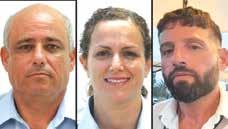
On Sunday morning, three Israeli police officers were shot dead by a Palestinian terrorist on Route 35 in the West Bank, near the southern Idhna-Tarqumiyah junction and a checkpoint between Israeli and Palestinian territory. The fallen officers were identified as Ch. Insp. Arik Ben Eliyahu, Command Sgt. Maj. Hadas Branch, and First Sgt. Roni Shakuri. Officials declared Ben Eliyahu and Branch deceased at the scene of the attack. Shakuri passed away while on the way to the medical facility.
The terrorist, who was named as 31-year-old Muhannad al-Aswad from Hebron, is said to have shot at the police car while in another vehicle, after which he ran away on foot. It is currently unclear if he acted alone. Later, the terrorist was killed in a building in Hebron after exchanging fire with troops from the Duvdevan Commando Unit, who found him thanks to intelligence from the Shin Bet and Military Intelligence Directorate. Al-Aswad, an ex-guard for the Palestinian Authority’s president with connections to the PA’s Fatah movement, was killed after the building he was in was hit by a series of shoulder-launched missiles; he was found dead with an M-16 assault rifle on his body.
Ben Eliyahu, 37, was a husband and a father of three from Kiryat Gat. Branch, 53, was a wife and mother of three with one granddaughter. Shakuri, 61, was a husband, father, and grandfather. According to Danny Levy, the police commissioner of Israel, all three worked in the West Bank district.
Shakuri’s daughter, police officer Mor Shakuri, was tragically killed on October 7 while fighting Hamas terrorists who

were attempting to take control of the Sderot police station.
Since the horrific day of October 7, when Hamas killed 1,200 people and abducted 251 others, 29 Israelis have been killed in the West Bank.

According to a Tel Aviv University study published in July, homeowners who advertise their houses on free platforms tend to lose more money in the sale than those who sell their homes with paid services.
As part of the research, Prof. Danny Ben-Shahar and Dr. David Ash, the director and research associate of Alrov Institute for Real Estate Research at Tel Aviv University’s Coller School of Man-
agement, respectively, analyzed more than 15,000 real estate listings published on classified ad website Yad2 from 2014 to 2016, when the service used to be free.
The study compared houses sold using free advertising platforms and those sold with paid services. Homes advertised on paid real estate websites ended up selling for, on average, 3.5% to 3.8% (or, on average, $12,000 to $13,000) more than houses listed on free websites. Additionally, houses listed on paid websites sold 10% to 15% faster and received 130% more clicks.
This research highlights the “zero price effect,” an irrational psychological phenomenon wherein people prefer paying nothing, even in cases where some spending could save more money in the long run.
“Zero is a special number. People feel and think that a service or product that they get for free has better qualities, even if you give them the same product or the same service for a difference of one cent,” Ash explained. “The ‘free’ is the problem. When someone sees free, it’s hard. If you see a free service, you think it’s better, even though the premium service that costs money is much better.”
“The tendency is to be attracted to a zero price; one needs to be very cautious,”

Ben-Shahar added. “Generally, we do a cost-benefit analysis, but when things come to a zero price, we don’t do this analysis in the same way.”
Despite the fact that something may be free, “there is a cost,” maintains Ben-Shahar.

The U.S. Department of Justice is charging six leaders of the Hamas terror group with seven charges over the October 7 massacre. This is the first criminal step by the Justice Department to hold people accountable for the heinous attack in Israel.
The six defendants – Ismail Haniyeh, Yahya Sinwar, Mohammad Al-Masri, Marwan Issa, Khaled Meshaal and Ali Baraka – are facing several charges, including terrorism charges, conspiracy to murder U.S. nationals and conspiracy to use weapons of mass destruction resulting in death.
The complaint, which spans across several decades of alleged terrorist acts from Hamas, focuses in part on the October 7 attack against Israel.
“On October 7, 2023, Hamas committed its most violent, large-scale terrorist attack to date,” the complaint says, detailing how “in the early morning hours … Hamas sent more than 2,000 armed fighters into farms and towns in southern Israel, where they carried out the massacres of over a thousand people and the kidnappings of more than 200 others.”
It added, “As of the date of this Complaint, at least 43 American citizens were among those murdered, and at least ten American citizens were taken hostage or
remain unaccounted for.”
The charges were originally filed on February 1, 2024, but kept under seal in case the Justice Department had the opportunity to arrest any of the defendants, a Justice Department official said on Tuesday, when the indictment was released.
“Following Haniyah’s death and recent developments in the region, it was no longer necessary to keep those charges under seal,” the official said.
Three of those charged are dead.
Sinwar was named leader following the assassination of Hamas political leader Ismail Haniyeh in Tehran in July. Sinwar is widely believed to have planned or been the mastermind behind the October 7 Hamas massacre on Israel. He was sentenced to four life sentences by Israel in 1989 for the abduction and killing of two Israeli soldiers and four Palestinians he believed were collaborators. He served 22 years of that sentence but was released in 2011 in the Gilad Shalit deal.
Mohammad al-Masri is better known as Mohammed Deif and is the head of the Izzedine al-Qassam Brigades, which is the military wing of Hamas. Israel says that they killed him in an airstrike on July 13; Hamas denies those claims.
The announcement comes on the heels of the confirmed death of Israeli-American hostage Hersh Goldberg-Polin in Gaza, which prompted President Joe Biden and other top U.S. officials to vow that Hamas leaders would be held accountable.
Biden said over the weekend that Goldberg-Polin’s death was “as tragic as it is reprehensible.”
“Make no mistake, Hamas leaders will pay for these crimes,” Biden said.
In a recorded statement, Attorney General Merrick Garland said that the Justice Department is investigating Hersh’s murder.
“We are investigating Hersh’s murder, and each and every one of the brutal murders of Americans, as acts of terrorism. We will continue to support the whole of government effort to bring the Americans still being held hostage home,” Garland said.
Did you know?
The city of Naples, Florida, is the pickleball capital of the world. It hosts the U.S. Pickleball Open Championships every year.

Hersh was killed by Hamas terrorists mere days before Israeli troops found his body – along with the bodies of five other hostages – in a tunnel dug by Hamas. Nearly 1,200 people were killed on October 7, including over 40 Americans. Hundreds of civilians were kidnapped.

Hotel union workers went on strike at hotels across nine U.S. cities early Sunday morning. More than 10,000 workers
walked off the job at 25 hotels over the Labor Day weekend. At least 840 of them returned to work on Tuesday, as planned. In Baltimore, 200 workers in the Unite Here union at the Hilton Inner Harbor went on strike on Tuesday morning.
“I walked out today because we just cannot keep working paycheck to paycheck, not able to pay our bills,” Jerome Roberts, a dishwasher at the Hilton Baltimore Inner Harbor, said. “Going on strike is hard, but not nearly as hard as trying to get by on what we are getting paid. We told the bosses in our negotiations how much we are struggling right now but they didn’t care. We are on strike to make them pay.”
Workers want higher pay, better conditions and more staff to help. The union is asking for a restoration of many of the pandemic-era cuts that hotels made, including daily room cleaning. The union says the travel and hotel industries have recovered from the pandemic, but worker salaries have not reflected the comeback.
Hotels are still open, although they are dealing with less staff and may not be able to provide full services to guests.
“We’re on strike because the hotel industry has gotten off track,” Gwen Mills, International President of Unite Here, said in a statement on Sunday morning.

“During Covid, everyone suffered, but now the hotel industry is making record profits while workers and guests are left behind. Too many hotels still haven’t restored standard services that guests deserve. Workers aren’t making enough to support their families. Many can no longer afford to live in the cities that they welcome guests to.”
The hotel chains facing striking workers include Hilton, Hyatt and Marriott. The hotels have 23,776 rooms between them in the cities of Baltimore, Boston, San Diego, San Francisco, San Jose, Seattle, as well as Honolulu and Kauai in Hawaii, and Greenwich, Connecticut, according to the union.
Unless their voices are heard, the union is threatening to expand the strike to 65 hotels in 12 different cities.
Last year, 15,000 members of the same union went on strike during the Fourth of July holiday weekend at 65 hotels in Los Angeles and Orange counties in Southern California. They returned to work a few days later but staged a series of rolling strikes in the months that followed, sometimes tied to major tourist periods.
These strikes are set to end after three days.

Hate your commute? It seems that a lot of workers are shunning traditional 9-to-5 work hours and avoiding the rush hour commute by working 10-to-4 in the office.
This conclusion came about through a 2023 Global Traffic Scorecard released in June by INRIX Inc., a traffic-data analysis firm.
“There is less of a morning commute, less of an evening commute and much more afternoon activity,” said Bob Pishue, a transportation analyst and author of the report. “This is more of the new normal.”
Now, there is a “midday rush hour,” the INRIX report found, with almost as many trips to and from the office being made at noon as there are at 9 a.m. and 5 p.m.
Additionally, commuters are avoiding public transportation. Ridership decreased during the pandemic, and many workers are finding other ways to get to work, resulting in a surge in traffic congestion throughout the peak midday and evening hours.
“Pre-Covid, the morning rush hour would be a peak and then the evening peak would be much larger,” Pishue said. “Now, there is no valley.”
“Employees have become accustomed to the flexibility of working from home and may only come to the office when absolutely necessary,” noted David Satterwhite, CEO of Chronus, a software firm focused on improving employee engagement. “That means they may jump out early to catch a train home, come in late or pop in for one meeting and then leave,” Satterwhite added.
Also known as “coffee badging,” the habit of only going to work for a few hours a day has become widely accepted, or at least tolerated. More than half — 58% — of hybrid employees admitted to checking in at the office and then promptly checking out, according to a separate 2023 survey by Owl Labs, a company that makes videoconferencing devices.
These days, employees are more likely to consider work/life balance, flexible hours and mental health support over career progression, other reports also show And fewer want to spend any more time at the office than they already do. If the ability to work from home was taken away, 66% of workers would immediately start looking for a job that offered more flexibility, Owl Labs found — and a bulk of those employees, roughly 39%, would promptly quit.

A new bipartisan bill, known as Assembly Bill 2316, made it through the California Legislature on Thursday. If signed by Governor Gavin Newsom, the bill would, starting on December 31, 2027, ban schools in the state from giving students foods or drinks with six particular ingredients that are commonly found

in popular treats and beverages: red dye No. 40, yellow dyes Nos. 5 and 6, blue dyes Nos. 1 and 2, and green dye No. 3.
A 2021 study by the California Office of Environmental Health Hazard Assessment found links between the consumption of those six chemicals and the development of learning disabilities in children. The U.S. Food and Drug Administration, however, currently maintains that “most children have no adverse effects when consuming foods containing color additives, but some evidence suggests that certain children may be sensitive to them.”
The bill, which was introduced in February by Jesse Gabriel, a Democratic Assemblyman, makes California the first state to pass a bill that could ban certain food chemicals from schools. September 30 is the deadline for Newsom to choose whether or not to sign the bill.
The bill is “important to me as a parent, it’s important to me as somebody who’s struggled with ADHD as a child, and it’s important to me as a parent of a child who is struggling with ADHD,” Gabriel said. “We know that the synthetic food dyes that are targeted by this bill can cause harm for all kids, but we know that there is a specially pronounced impact on a lot of our young people with ADHD and
other challenges.”
Gabriel and the Environmental Working Group have said that the FDA’s current assessment of the chemicals stems from old research and that “new science is available.” The FDA, however, maintains that, recently, JEFCA (Joint FAO/ WHO Expert Committee on Food Additives) found the chemicals to be safe. With that being said, this month, the FDA is expected to hold a public meeting to analyze current data on the chemicals.
“It’s unfortunate that scientifically proven, safe ingredients have been demonized for the purpose of advancing a political agenda,” said John Hewitt, the Consumer Brands Association’s senior vice president of packaging and sustainability and state affairs, lamenting the bill’s passage.
“No industry is more committed to food safety than the consumer packaged goods industry. It’s why we have urged the FDA to aggressively acknowledge its responsibility as the nation’s food safety regulator. The passage of this bill could cost schools and families money, limit choice and access, and create consumer confusion,” added Hewitt, whose association represents over 1,700 brands.
According to state Superintendent of Public Instruction Tony Thurmond, who
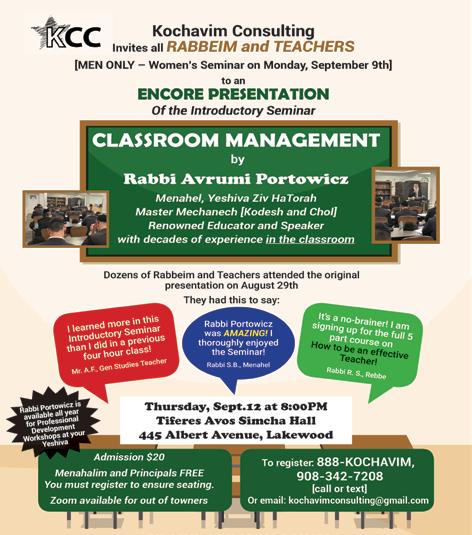
cosponsored the bill, California, with over 10,000 schools and 6.3 million students, boasts the biggest public school system in the United States. Thurmond, in endorsing the bill, noted the tremendous risk of promoting chemicals that could cause harm to children. Gabriel also noted that money could be potentially saved by banning these chemicals in schools, as, without these additives, fewer children may require extra learning resources.
In October 2023, California banned brominated vegetable oil, an ingredient primarily found in sodas, although the FDA, at the time, said it was safe. Nine months later, the FDA followed suit, revoking its regulation of the product.

Boeing’s Starliner space capsule, which brought two astronauts up to space on June 5, is expected to autonomously return to Earth on September 6, following a twelve-week stay in outer space, which was extended because NASA was concerned about the craft’s gas leaks and propulsion issues.
The spacecraft is expected to detach itself from the International Space Craft at around 6 p.m ET. After maneuvering towards Earth for six hours, it should land in White Sands Space Harbor in New Mexico at around midnight. According to NASA, although the spacecraft will hopefully operate fully autonomously, “teams on the ground are able to remotely command the spacecraft” if need be.
Notably, Starliner will be returning without astronauts Butch Wilmore and Suni Williams, who are expected to return home in February 2025 or later, on a SpaceX Crew Dragon capsule. Until recently, NASA hoped to bring the crew home on the Starliner craft. Although Boeing, the manufacturer of the craft, rejected NASA’s safety concerns, the company said on August 24 that it ”continues to focus, first and foremost, on the safety of the crew and spacecraft. We are executing the mission as determined by NASA, and we are preparing the spacecraft for a safe and successful uncrewed return.”
If the Starliner can successfully return home without malfunctioning, NASA may choose to award the craft its human spaceflight certification, despite the fact that it was unable to bring the astronauts home, as was initially intended. A failure for the Starliner would be a major embarrassment for Boeing, which is already reeling from a series of PR disasters. To repeat this mission would cost Boeing millions of dollars in addition to the approximately $1.5 billion it has already lost as part of this current program.
The Crew Dragon craft, which is expected to bring Williams and Wilmore home, received certification to participate in crewed missions from NASA around four years ago. Since then, it has brought around a dozen crews to space. In order to make it possible for Williams and Wilmore to fit on the craft, NASA was forced to cancel the planned flights of two other astronauts: Stephanie Wilson, who has traveled to space several times, and Zena Cardman, who has yet to participate in a mission. Alongside Williams and Wilmore, pilot Nick Hague and Russian astronaut Aleksandr Gorbunov will also be on board the Crew-9 mission.

Earlier this summer, a lower U.S. court paused the implementation of a student loan forgiveness plan spearheaded by President Joe Biden after several Republican states brought forth legal action. In response, the Biden administration asked the Supreme Court to allow the plan to resume, a request that the court rejected last Wednesday. Instead, the Supreme Court will allow the 8th U.S. Circuit Court of Appeals to make the final decision, which it expects “will render its decision with appropriate dispatch.”
Alaska, South Carolina, and Texas also requested that the Supreme Court enforce a partial block on the program, which the court similarly rejected.
The 8 million people enrolled in the SAVE (Saving on a Valuable Education) Plan, which began around a year ago, will not be immediately affected by the

Supreme Court’s Wednesday decision. A few months ago, the Education Department implemented a temporary measure amid the legal fights, wherein borrowers will be allowed to skip monthly student loan payments without incurring interest.
On the day of the Supreme Court’s decision, the Biden administration pledged to “continue to aggressively defend the SAVE Plan,” which has thus far decreased the payments for 4.5 million borrowers to “zero dollar[s]...each month.”
“We won’t stop fighting against Republican elected officials’ efforts to raise costs on millions of their own constituents’ student loan payments,” said Angelo Fernández Hernández, a spokesperson for the White House.
According to the Congressional Budget Office, the SAVE Plan will cost $276 billion. The plan was implemented after Biden’s more ambitious, one-time student loan forgiveness program was eliminated by the Supreme Court. Student loan forgiveness has been one of Biden’s priorities since he was elected in 2020.
Two people died from West Nile virus in Wisconsin and Illinois recently. Those
deaths were the first such deaths in those states this year.
The U.S. Centers for Disease Control and Prevention said last week that it has received reports of 18 deaths from West Nile across the country this year, according to preliminary data. There were 182 such deaths in 2023.

The deaths in Wisconsin, in addition to the hospitalization of another person with West Nile, were the first human cases there this year. The Illinois case involved a person in their 80s who lived in Lake County. Nine other West Nile cases have also been reported in that state this year.
Overall, the CDC has received reports of 289 West Nile cases in 33 states for 2024; 195 of those cases have been neuroinvasive, in which the virus invades the brain and nervous system. This can lead to complications such as brain
swelling, brain damage, or death.
There is no vaccine or specific treatment for West Nile, which is spread through the bite of infected mosquitoes. Most cases are mild and may involve flulike symptoms and a rash. About 1,000 Americans are hospitalized each year with the most severe form of the virus.
Most cases of the virus are seen in August and September.

In an antitrust lawsuit filed last week, Yelp, a website that features local business reviews written by users, accused Google of abusing its power as a monopoly, deliberately altering search result pages to hide Yelp reviews and only show users Google content.

“In other words, Google abuses its monopoly power in general search to keep users within Google’s owned ecosystem and prevents them from going to rival sites,” Yelp stated in the federal lawsuit, which was filed in San Francisco.
“Our case is about Google, the largest information gatekeeper in existence, putting its heavy thumb on the scale to stifle competition and keep consumers within its own walled garden,” the company added in a blog post.
Last month, Amit Mehta, a U.S. District Judge, labeled Google an illegal “monopolist” in a scathing decision that threatened to split up the big tech company. Mehta took issue with the fact that Google, in an anti-competitive manner, spent billions of dollars ensuring that it is the default search engine, including in a controversial deal with Apple, thus unfairly harming other search engines such as Bing, Yahoo, and DuckDuckGo. Google plans on appealing the court’s decision and will likely cite Mehta’s concession that Google is the best search engine as grounds for the big tech company’s actions.
“Yelp’s claims are not new. Similar claims were thrown out years ago by the FTC (Federal Trade Commission), and recently by the judge in the DOJ’s (Department of Justice’s) case. On the other aspects of the decision to which Yelp refers, we are appealing. Google will vig-
orously defend against Yelp’s meritless claims,” a spokesperson for Google said. According to Yelp, Google has impeded its growth by deliberately failing to fairly cater content on search pages since 2009, when Yelp refused to be acquired by Google, which offered to buy the company for $500 million. Yelp claims that, for example, when one searches for information about a local business, Google will unfairly provide all information, including directions, hours, and reviews, directly on the search page, which makes it so that users don’t need to click on links from Yelp. Thus, Yelp sees far less traffic than it should.
“Google, which was late to market in this respect, has never been able to develop a high-quality local search service to rival that of Yelp and other local search platforms,” Yelp declared, citing an FTC report that all Yelp reviews have text, while 32% of Google reviews have no text at all.
Yelp seeks monetary damages, as well as an “injunction prohibiting Google from continuing to engage in the anticompetitive practices.”

Joey Chestnut is still the king of the hot dog. On Monday, he demolished his record by beating longtime rival Takeru Kobayashi in a showdown billed as “unfinished beef” between the two biggest global stars in professional competitive eating.
Chestnut devoured 83 all-beef hot dogs and buns in 10 minutes. Kobayashi managed to consume 66 hot dogs and buns in the Netflix Labor Day event at the HyperX Arena in Las Vegas.
Eighty-three franks is a huge accomplishment. In fact, three years ago, Chestnut downed a then-world record 76 hot dogs and buns in 10 minutes.
“It’s amazing. I’ve been trying to hit 80 hot dogs for years, and without Kobayashi I was never able to do it. He




drives me,” the 16-time Nathan’s Hot Dog champion said after the event.
“We were not always nice to each other,” he admitted. “We’ve pushed each other to be our best.”
This was the first time the two nemeses have faced off in 15 years.
“I feel like I did everything I could,” Kobayashi from Japan said via his interpreter.
With the victory, Chestnut earned $100,000 in prize money, a hot-dog shaped trophy, and a World Wrestling Entertainment-designed championship title belt.
Hot dog!

Ever have a nightmare that you show up to work in pajamas? 2,052 employees at an Ikea store in Sweden lived that dream last week when they showed up to the world’s largest pajama party.
The record took place at the store in Almhult, where hundreds of people showed up in two-piece matching blue and yellow pajamas. The PJs featured veggie balls with lingonberry jam and gravy motifs — a tribute to Ikea’s iconic Swedish meatball.
Company officials said the record attempt was part of Ikea’s initiative to create bedroom décor designed to improve sleep.
“We’re thrilled about this collective effort, coming together to highlight the importance of sleep,” Fredrika Inger, managing director of Ikea of Sweden, said in a news release. “Good sleep benefits everyone, and we believe that by prioritizing it, we can genuinely make a big difference. Small adjustments, like choosing the right pillow or lighting, can lead to big improvements. Our goal is to make these
improvements accessible to everyone because good sleep should be something everyone can achieve.”
You know what they say: if you snooze, you lose.

Hiking the Great Wall of China? If you get hungry, don’t worry. There is food available for delivery – from the air.
Chinese food delivery giant Meituan says its new drone service will bring food, drinks and other goods such as medical supplies to customers at a far-flung section of the ancient monument on the outskirts of Beijing.
The Great Wall drone route extends from a nearby hotel rooftop to a watchtower on the southern extension of Badaling, the most popular section of the massive fortifications snaking across northern China.
Opened last year, the extension, which has preserved the ruined state of the ramparts on the wall, typically experiences sweltering summer temperatures and has no commercial facilities.
“Through drones, we can make trips that take 50 minutes on foot in five minutes and deliver heat relief items and emergency supplies to visitors,” Yan Yan, public affairs director of Meituan’s drone business, said.
Getting food flown in won’t break the bank, with a service fee of around 56 cents. The service will take orders from 10 a.m. to 4 p.m., after which the drones will be tasked with carrying trash to recycling stations.
The drones deliver the food to a watchtower, where a worker receives it and gives over the package to customers.
Speedy delivery.
you know? California has the most pickleball courts in the nation.


In the heart of Far Rockaway, amidst the hushed anticipation of the approaching Elul, K’hal Nesiv Hatorah eagerly unveiled the inception of a new full-day community kollel. Shepherded by the towering figure in halachic scholarship, Rav Isaac Kresch, and guided by the venerable Rav Binyomin Forst, shlita, this illustrious kollel is bustling with fervor as it establishes its new home in our community.
Introducing the kollel to the community, K’hal Nesiv Hatorah hosted a captivating Labor Day Learning Program. The focal point of this gathering was a riveting exploration of the challenges posed by the community Eiruv of Far Rockaway and the Five Towns. The esteemed Rosh Kollel, Rav Isaac Kresch, graced the event with his enthralling and intellectually stimulating shiur, an event that garnered unwavering support from numerous local rabbanim.
Rabbi Kresch, a luminary in the world of halachic jurisprudence who received semicha from Reb Hershel Ausch of the Karlsburg Bais Horaah, is renowned for
his erudition and dedication. His encyclopedic knowledge and profound insights make him a sought-after authority, providing guidance on a plethora of complex topics through numerous venues, including our Halacha Hotline. With his expertise in the intricate laws of mikvaos and knowledge of community eiruvin across the United States and Europe, Rabbi Kresch stands as a steadfast pillar of wisdom.
The fledgling young scholars training under Rav Isaac Kresch’s tutelage also garnered well-deserved attention. These fervent Bnei Torah, poised to become luminaries in the realm of halacha, are set to lay the groundwork for the upcoming full-day kollel in Far Rockaway. Many of these dedicated scholars, accompanied by their families, are preparing to integrate seamlessly into the fabric of our neighborhood, promising to elevate not only the shul but the entire community as well.
As the kollel prepares to embark on its journey this zman, it eagerly turns to sugyos of hilchos eiruvin, delving deep


into the intricate tapestry of relevant dalachos during the afternoon seder. And for the community at large, a separate study session in the afternoon has been meticulously tailored, offering a compelling opportunity for baalei batim to
engage actively with the kollel from 4:456:15 p.m. For further details or inquiries regarding sponsorship opportunities, kindly reach out to frkollel@gmail.com. Join us as we rally behind this profound and transformative Torah initiative.

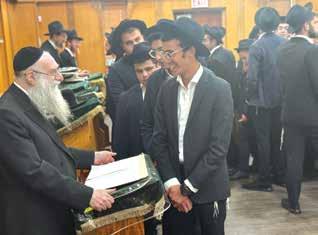
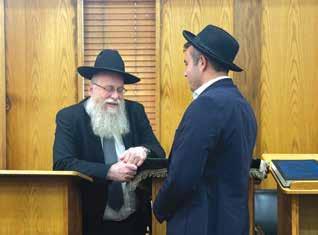

Photos by MHB



The children at the Five Towns Special Children’s Center enjoy their new building while also spending their last few days in the post-camp program! To get involved, please contact the Center at 917-780-5012

New York State Assemblywoman Stacey Pheffer Amato’s months of hard work with dedicated community members and government agencies has led to success! The efforts to expand the Far Rockaway Eruv was recently completed as a way to better serve the local Jewish community by expanding the Eruv boundaries. The process was initiated by Pheffer Amato after concerns were brought forward by several commu-

nity rabbanim regarding Shabbos observance along the boardwalk.
Pheffer Amato, the only Jewish elected official in South Queens, hosted an on-site meeting, which included the NYC Parks Department and members of the Eruv Committee. There, the committee outlined the proposed expansion while Pheffer Amato conveyed the need for this expansion. It was Assemblywoman Pheffer Amato who made the issue resonate

with the City agency and obtained the approvals from several government agencies, including the New York State Department of Environmental Conservation and the U.S. Army Corps of Engineers. The expansion was officially approved and completed by the Eruv Committee the other week. Through this work, the Eruv extends along the Far Rockaway Boardwalk to Beach 24th Street and is checked before every Shabbos.
“This was an important issue that needed to be addressed and fixed – and I wasn’t taking no for an answer,” said Assemblywoman Pheffer Amato. “I greatly appreciate the work of the Eruv Committee and the agencies who worked expeditiously to get this updated and fixed. Now we can all enjoy the beauty of the ocean from the boardwalk and have a great Shabbos.”

Synagogues across Long Beach and Lido Beach joined together to honor the brave officers of the Long Beach Police Department (LBPD) and Nassau County Police Department. This year’s event took on new significance amid rising antisemitism globally.
This year, Benai Asher Sephardic Congregation hosted the event over Labor Day weekend. The event brought together police department members, their families, and Jewish community members from nearby synagogues.
“The events of October 7th and the protests which have ensued in support of Hamas and sought to normalize its atrocities, shook the global Jewish community – and indeed many members of our communities here on the Barrier Island – to the core,” said BACH spiritual leader and Long Beach Police Chaplain Rabbi Benny Berlin. “Yet through it all, the officers of the Long Beach and Nassau County Police departments have continued to provide an envelope of safety around our communities.
“From the early moments of October 7 when no one could fully understand what was transpiring, these heroic officers stepped up their patrols of our communities and synagogues and kept our congregants updated throughout the holiday with breaking news. In the 10 months since, they have done everything possible to help us feel safe. We are extremely thankful for their efforts to not only keep us safe but for their determination to maintain a constant feeling of safety for us all,” he added.
It was a beautiful day, and families could be seen choosing from the selection of hotdogs, hamburgers and chicken wings while engaging in lively conversation with one another and members of the police departments.
“We’re extremely thankful to the synagogues of Long Beach and Lido Beach for coordinating this barbecue for the third consecutive year,” said Long Beach Police Commissioner Richard DePalma. “Synagogues, along with our other faithbased communal partners, play an inte -

gral role in our community. We are one community – the Long Beach community – and this barbeque is a generous gesture that reinforces that.”
Founded in 1946, Bachurei Chemed –BACH Jewish Center is one of Long Island’s most prestigious and oldest synagogues. Members hail from Long Beach, Lido, Atlantic Beach and Island Park. For more information, please visit https://www.bachlongbeach.com/.


By Moshe Greenwald
Derech halimud is a topic that provokes much thought and debate among bnei yeshiva – how fast, how slow, how to balance iyun and bekius, how much time to devote to each...
HaGaon HaRav Yitzchok Sorotzkin, shlita, Rosh Yeshiva of the Mesivta of Lakewood and Telshe, has been delivering shiurim to bochurim for more than a half century. He has also written his magnum opus, Gevuras Yitzchok on Shas and Sefer Rinas Yitzchok Tanach.
Rav Yitzchok received the mesorah from the previous generation of great European roshei yeshiva and serves as a transmitter of that hallowed mesorah to our generation. We had the zechus of sitting down with him for a comprehensive conversation on this vital topic.
What is the right balance for a ben Torah to divide his time between learning iyun and bekius?
Rav Yitzchok Sorotzkin: Before we discuss this very important topic in general terms, I think it is important to understand that no yeshiva is exactly alike. Each yeshiva functions in its own unique way, and the roshei yeshiva and hanhala of each yeshiva knows and understands what is best for its talmidim In addition, very often, a yeshiva caters to a certain type of bochur. Therefore, there cannot be an ironclad rule when it comes to learning iyun and bekius. It is possible that what is good for one yeshiva or one type of bochur is not good for another. Rav Shach, zt”l, writes that that not all bochurim are alike, and each bachur needs to learn according to his own inclination, as long as they don’t spend too long on one line.
Thus, it is important to stress that although there are general ground rules on this topic, they cannot always be universally applied. Each mossad and each rosh yeshiva has to make the final determination as to which exact balance is appropriate for his talmidim
What then is the general rule? For
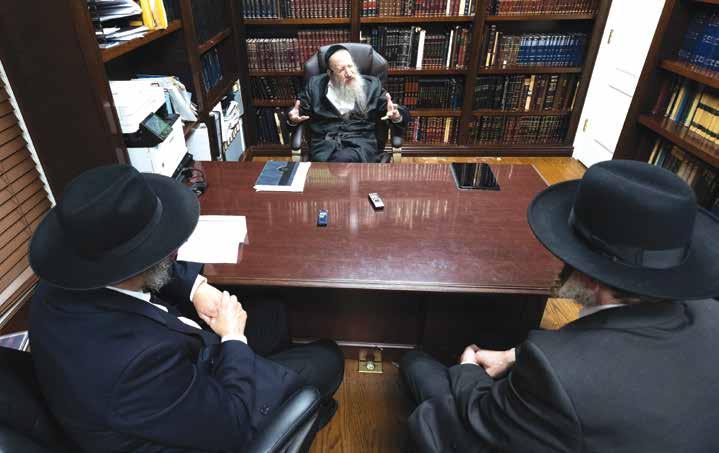
example, virtually everyone agrees that morning seder is dedicated to learning b’iyun. What about second seder or night seder?
Again, with the introduction that there is no ironclad rule, we can relate what Rav Elchonon Wasserman, zt”l, said. Rav Elchonon explained that he had a kabbalah from the Chofetz Chaim, zt”l, who heard directly from Rav Yisroel Salanter, zt”l, that there is a chiyuv of yedias haTorah. That means that aside from the chiyuv of havanas haTorah, there is a chiyuv of yedias haTorah. He said that these two chiyuvim should be split into the two main sedarim of the day, one seder dedicated to havanas haTorah, what we call iyun, and one seder for yedias haTorah, what we call bekius. This was the model established in the Olam HaTorah, one seder for each. Parenthetically, I must say that Rav Shach did not like the term “bekius.” He felt that the connotation was just learning many dafim without really understanding. Perhaps he would have termed it “iyun kal.”
So, the Rosh Yeshiva is saying that morning seder should be iyun and second seder bekius?
When I was a bochur, that was the way we learned. The European roshei yeshiva who came to America and Eretz Yisroel brought this mesorah with them.
During my first tekufah in yeshiva gedolah, we learned one blatt every day during second seder! Not only did we learn a new blatt every day, but during that time we also chazered the previous day’s blatt. At the end of the week (on Friday and Shabbos), we chazered everything that we had learned that week. At the end of each perek, we chazered again, and at the end of the zman, we chazered everything we learned throughout the zman. The roshei yeshiva held that we needed a minimum of four chazaros. In this way, we learned five blatt every week and chazered each one at least four times.
In truth, during morning seder, we also learned much more than what is learned today. For example, during morning seder throughout a winter zman
Hamfkid (more than 40 blatt)!
Is that the pace that should be learned today during morning seder?
No. Even forty years ago when I became a maggid shiur, the roshei yeshiva realized that they could not demand so much. They told me that I should cover two and a half blatt per week…and even that amount I was not able to cover in a week. As time went on, they allowed me to lower the amount to one and a half blatt per week.
What is the reason why things changed?
One of the primary reasons is that we have so many seforim, and they had almost no seforim. So, let’s say, you are learning Rabi Akiva Eiger, you might notice that the only rishonim he mentions are the Ran and Rosh that were printed in the back of the Shas. He simply didn’t have access to other rishonim. In the
yeshivas in Europe as well, they had almost no seforim. Rav Gifter, zt”l, would say that in Telshe, a yeshiva with nearly 500 bochurim, there was only one Rashba and you had to wait your turn to look in the Rashba. Rav Shach would say that one of the reasons people are learning slower and slower is not only because of the many achronim that we have but also because of the rishonim. In Europe, if you learned the Rashba or the Ramban, that was considered a lot. Today, every bochur’l has an entire Kovetz Meforshim containing all the rishonim and many achronim. This can slow people down tremendously.
In addition, today most bachurim hear a daily shiur and spend time reviewing the shiur. Thus, there is less time to acquire yedios
Rav Chaim Brisker, zt”l, and Rav Elchonon (Wasserman) would generally say shiur on approximately one blatt per day. Looking at Rav Elchonon’s shiurim, you can say that he generally said just a bit on every daf. It wasn’t like it is today. Similarly, even later, if you look at the shiurim of Rav Shmuel Rozovsky, zt”l, you see how in the early machzorim he was able to say shiurim on many more blatt. Then, as the years progressed, he covered less and less ground. I think the reason is because as time went on, the rishonim and other seforim became much more available, thus, the bochurim got bogged down more.
The same transpired in Lakewood by Rav Aharon, zt”l (Kotler). Every machzor they covered less.
Rav Moshe Shmuel Shapiro, zt”l, Rosh Yeshiva of Be’er Yaakov, once gave a different reason for the change in pace. He said that in the past almost no one had the luxury to learn in kollel. Once they married, they had to find a source of parnassah and were not able to learn all day. Today, however, boruch Hashem, kollel is a fact of life. In the past, they had to learn quicker because otherwise they would never be able to achieve yedias haTorah. Once they had the yoke of parnassah, it was nearly impossible. Today, however, a bochur can learn slowly because when he is a yungerman he will be able to pick up speed and achieve yedias haTorah.
The Rosh Yeshiva has been referring to morning seder. What about second seder? What should the balance be today?
Let me quote you what Rav Aharon says in Mishnah Rav Aharon (volume 3). He says, “The yetzer hara makes a person learn the wrong way. He causes him to be ‘medayek’ more than is necessary.”
There are two negative byproducts. Firstly, he learns very little, even though he has a chiyuv to know the entire Torah. Secondly, if a person learns this way, he also loses whatever he learned. He relies on his own seichel and is missing yedios
This is not usually the case in yeshiva gedolos. Many yeshivos learn the limud of second seder with the same iyun (and sometimes more) than they do in the morning, thus they only cover a few blatt every zman. Even if you justify this with Rav Moshe Shmuel’s klal that we can wait for after marriage to enrich their yedios, we see that if a person learns this way as a bochur he will not find a geshmak in learning a few blatt a week when he is a
“Rav Elchonon Wasserman explained that he had a kabbalah from the Chofetz Chaim zt”l, who heard directly from Rav Yisroel Salanter zt”l that there is a chiyuv of yedias haTorah.”
and, therefore, even what he does learn is incorrect. When we are relying on our own seichel as opposed to the seichel haTorah that we only get from learning a lot of Torah, we will make mistakes. The Gemara says that divrei Torah are “poor” in some places and “rich” in others. In other words, if you don’t have wide-ranging yedios, it is not possible that what you are learning in seder iyun is going to be correct. You are simply missing the yedios needed to know if a chiddush that you are saying has truth to it and if it is consonance with other sugyos in the masechta. Rav Chaim Brisker would say that it is important to have wide-ranging knowledge, because a person that says a chiddush without having yedios all over has no idea if his chiddush contradicts a Gemara somewhere else.
So second seder should be utilized to enrich yedios?
Yes, I think in yeshiva ketanos (high school age yeshivos), many are learning the correct way. Many mesivtos are learning two blatt during second seder and some even more. Many give tests that encourage the bochurim to chazer, really locking in their yedios.
Previously, the Rosh Yeshiva said that it is wonderful that many yeshiva ketanos cover ground during second seder and have tests to strengthen their yedios. What does the Rosh Yeshiva hold about tests?
Rav Shach would say that chazara does not only apply to what you are learning that year. He says that bnei Torah should constantly review masechtos that they have learned in previous years. That, he says, is the main chazara. When a bochur chazers the four or five masechtos he learned in mesivta and continues chazering even in yeshiva gedolah, whether during bein hasedorim or other free time, he acquires that masechta.
Does the Rosh Yeshiva consider it below the dignity of a bochur or a yungerman to be tested on what he learns?
yungerman. He will nebach spend his life kvetching on a few blatt each zman. I remember Rav Mordechai Gifter, zt”l, bemoaning this, saying, “They are learning a lot about nothing.”
Rav Shach writes that in second seder one daf should be learned daily. In a footnote at the bottom of that shmuess, he writes, at a minimum, three blatt should be learned every week. If a bochur would learn three or even two and a half blatt every week (an amud per day) and chazer a few times, he would find tremendous satisfaction.
One thing seems to clear: the Rosh Yeshiva is saying that learning b’iyun the entire day is not the right derech.
I am not saying that. Rav Aharon Kotler is saying that! Rav Shach is saying that! The Brisker Rav is saying that! It is clear that in most cases, second seder should be devoted to what we call iyun kal learning, covering ground and many chazaros. That is how one achieves yedias haTorah. Of course, each rosh yeshiva knows what his talmidim need, but I am talking in general terms.
Once it was considered below the dignity of a bochur or a yungerman, but in our times, this has changed. We see how bochurim and yungeleit take tests and are paid for good results. We see how tests empower a person to learn and retain in a way that they would not have done as well without the mechayev of a test. I do, therefore, think that it is not considered a lack of kavod to give a test in today’s world.
In addition, we find that gedolei olam would prepare to be tested. I remember hearing about a talmid of Rav Raphael of Volozhin, zt”l, who asked Rav Raphael to test him because he must prepare for his “big farher” after 120 years. Even closer to our time, Rav Avigdor Miller, zt”l, was seen constantly chazering and would say, “I am preparing for the ‘big test’ after 120.”
One last question. Bekius, or better put, iyun kal – is that Gemara, Rashi with Tosafos, or just Gemara with Rashi?
Rav Shach writes that there is not clear klal when it comes to this. There are bochurim who can get stuck on a Tosafos that is not relevant to the sugya. Tosafos often brings questions from other places in Shas, and this can hold up a bochur One doesn’t have to learn every Tosafos This is dependent on each bochur and his level of learning. One has to use one’s own seichel to know when a Tosafos will unnecessarily delay a person and when it won’t.
Touro University announces the launch of the Touro Dental Honors Pathway, a groundbreaking educational initiative designed to provide a direct route to dental school for highly qualified high school graduates. The Touro Dental Honors Pathway is a collaboration between Touro’s undergraduate divisions – New York School of Career and Applied Studies (NYSCAS) and the Lander Colleges – and Touro College of Dental Medicine (TCDM).
This innovative pathway program guarantees conditional admission to Touro College of Dental Medicine upon acceptance directly from high school, easing the educational journey for aspiring dental professionals.
The new Dental Honors Pathway offers two options. For students who choose to begin immediately after high school, the 3+4 BS/DDS program offers an opportunity for students to earn both a Bachelor of Science (BS) degree and a Doctor of Dental Surgery (DDS) degree

in just seven years. They can take their prerequisite courses at any Touro undergraduate campus (Touro NYSCAS, Lander College for Men, Lander College for Women, Lander College of Arts & Sciences), enter Touro College of Dental Medicine after three years and earn their BS degree after their first year of dental

school. The 3+4 BS/DDS program not only accelerates the timeline to a DDS degree but also provides significant financial benefits by saving a year of tuition.
Students who choose to take a posthigh school gap year of study in Israel will enter Touro College of Dental Medicine after earning a BS degree at a Touro undergraduate campus and will still take only three years of prerequisite courses at the undergraduate level.
Opportunity for High Achievers to Begin Training
”This program reinforces Touro University’s pioneering leadership in healthcare education and our commitment to providing high-quality, accessible professional training that meets the evolving needs of students and the healthcare industry. It’s an exciting opportunity for high-achieving students to begin the pathway toward their chosen career early on and benefit from the cutting-edge technology and training at Touro College of Dental Medicine,” said Dr. Alan Kadish, president of Touro University. “By streamlining undergraduate and professional studies, Touro is paving the way for the next generation of dental professionals.”
Participants in the Touro Dental Honors Pathway Program will be nurtured and guided by dedicated faculty
and staff from both Touro University and Touro College of Dental Medicine. The comprehensive support system includes academic mentoring, Dental Admissions Test (DAT) preparation assistance and access to clinical or research opportunities at TCDM during undergraduate studies.
“The Touro Dental Honors Pathway is an amazing opportunity for those gifted students who have a sense of career direction while still in high school. We have created an exceptionally strong, professional, cutting-edge academic program with a warm and nurturing environment,” said David J. Katz, D.D.S., F.A.G.D., F.A.C.D., Vice Dean, Professor and Director of Halachic Dentistry at Touro College of Dental Medicine. Cutting Edge Academic Program with a Focus on Public Health Touro College of Dental Medicine (TCDM) incorporates the hallmarks of Touro – a top quality education with a focus on public health and serving the local community. TCDM students benefit from the latest technology and its graduates are expertly trained, compassionate dentists, equipped to practice in the 21st century.
“The Touro 3+4 BS/DDS program saves the well-prepared student a year, both in tuition and in time, by focusing the curriculum on essential coursework, and allows a more rapid entry into the dental profession,” said Dr. Judah Weinberger, dean of Touro’s New York School of Career and Applied Studies. “The program enables students to network with future dentists from the first day in college. The combined 3-year BS and 4-year DDS program can be a great choice for highly motivated students who are certain about their career path and want to maximize their time and resources.”
For more information about the Touro Dental Honors Pathway Program, contact Dr. Brian Chiswell at brian. chiswell@touro.edu.
Did you know?

It is hard to imagine a world without Refuah Helpline. Whenever a medical issue arises, Yidden know where they can turn to and on whom they can fully rely to guide and support them until they see a refuah shleimah, b’ezras Hashem.
But it wasn’t always this way. Thirty years ago, a modest mission was launched, one that has over the years grown to become the extended family of every patient, moving heaven and earth to ensure the best available care and standing beside them diligently until their ordeal is complete b’ezras Hashem. This week, the organization is celebrating this milestone by recommitting itself further to Klal Yisroel and by inviting the community to step up and partake in its annual fundraising event towards this mission – donating millions
of dollars in support of these vital yearround efforts.
The cost of Refuah Helpline’s unparalleled and unyielding devotion is great, and it is wholly dependent on the community contributing their fair share. As one of the leading raisers told us, “This isn’t just Refuah Helpline’s mission; it belongs to all of us!”
This year’s campaign will also see the launch of a first-of-its-kind initiative uniting the many raisers in a way that will go even further on behalf of cholei Yisroel. Kapitel-A-Day will see each raiser take upon themselves a perek in Tehillim that they will recite every single day, and together see the entire Tehillim completed thousands of times throughout the year ahead.
The truth is that this has long been a part of how Refuah Helpline operates,
with the case workers and other staff complementing their far-reaching efforts with the power of tefilah. The organization has always gone all the way for every patient — whether it’s a transfer or a transplant, an emergency procedure or an experimental trial, or anything a patient may need — but truly powering impactful results requires the one tool that our nation has always been able to rely on.
The campaign organizers report that the community, from major philanthropists to grassroots donors, is already showing its eagerness to do their part during the pre-campaign period — with much more yet to come.
The campaign will culminate this upcoming Tuesday and Wednesday (September 10 and 11), with tens of thousands of individual donors helping the organi-
By Rabbi Yaakov Mintz
When your teenager comes back to school in September and sees his or her classmates, the odds are that someone will be missing. While the numbers are proportionally small, in the Jewish community as a whole, the number of kids who do not return to high school each year is significant. Hundreds of kids drop out of school each year, and even more will leave during the course of the school year. The unfortunate reality is that these precious souls often get overlooked in the sea of successes experienced by so many. Yet, for the children and families of those who are not able to continue from year to year as all of their peers, the implications can be devastating.
Why did these children leave? There are many factors that can cause a teen not to return to school. For some, it is a health issue, physical or mental, that prevents school from being a reality for them. For others, some sort of life circumstance such as an illness in the family or financial constraints might be making regular schooling impossible. And there are those for whom the rigor of the school day is just a terrible fit with their personality and the conventional school system causes them great difficulty and
aggravation. For these kids, the choice to leave school is never an easy one and there are inevitable hurdles that must be dealt with along the way. Of course, there are times when the choice to leave is not their own, but the child is not allowed back into school for whatever reason, and they may not have been able to find a new school that is suitable.
Why is this so significant? We live in a community where our educational institutions are not simply the places where kids learn things, but they are part of the social identity that we form for ourselves. The schools we attend are part of our identity, and much of a child’s developmental and religious growth happens in school. For those children who leave the system, their path will have to be different from the well-charted path of the majority of their peers. They will have to make important decisions at a young age as to how to best deal with a situation in which they are unable to continue along the path of most of their peers. Often, they will have the feeling of rejection and depression that can come from such difficult circumstances. When you feel excluded from your natural environment, the pull of technology and just lying in bed become very strong.
What can be done for these children who leave school? Fortunately, there is

zation reach its multimillion dollar goal so that they can meet their annual budget demands.
To do your part, visit Charidy.com/Refuah or call 845.606.9222 and submit your donation.
much to be done if people focus time, energy, and understanding toward these young people. Schools can prioritize making a place for all teens within their community. While we certainly value standards and accomplishments for good reason, at the same time, raising our standard of care for young people who do not fit into our educational system is vital for so many. There are many opportunities for success in the community that can be given to those who leave school. Employers can offer internships and jobs to these young people, and organizations can make it a priority to look out for their wellbeing. Community leaders can reach out to families to see what resources their child needs now that they are not in school.
For your child who is wondering what he or she should do about that child who did not return – let’s use this as an opportunity to teach them about the value of each and every neshama in Klal Yisra-
el. Encourage them to maintain their relationship and make them feel that while they may have left school, they are still a treasured member of our community. Make sure to include them in simchas and events, and even Shabbos get-togethers, to make sure that they know that they are cared for. No educational system has ever been the right fit for all children; human beings are too complex and diverse for that. Nevertheless, we certainly can make a place even for those who do not return to school to feel like they are valued members of the Jewish community.
Rabbi Yaakov Mintz serves as Educational Advocate for Work At It, a Brooklyn-based organization dedicated to working with young people who have been marginalized in the educational system and supporting them in finding their best path forward.
Pickleball was named after one of the inventor’s dog, Pickles, who would chase the ball while his owners played.
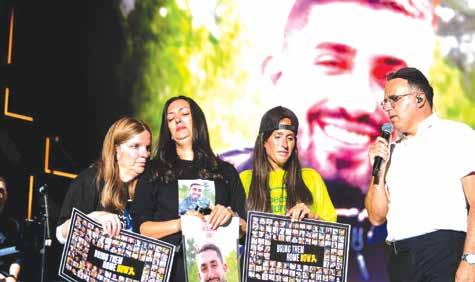
The Special Children’s Center mourns the loss of the six hostages that were murdered this past week. Einav Danino, the mother of Ori Danino, HY”D, became close with Chaya and Jenine a short while after October 7 when her son got kidnapped as a hostage. Since then, she has brought chizuk and strength to the entire center family and the entire klal Yisroel. During Einav’s
time In America, she gave and received chizzuk to continue begging Hashem for his return. On August 31, Hashem took Ori back along with the other five precious souls that were with him in Gaza.
HY”D.
May Hashem bring strength to the entire Danino family and all those families who suffer this terrible loss. Bring them home now!

The Village of Cedarhurst recently hosted an evening filled with Jewish music and cultural celebration. The event, held on August 20, featured a captivating magic show by A David Funn Experience, followed by a dynamic concert by the well-known artist Aryeh Kunstler.
The night kicked off with A David Funn Experience, who entertained the crowd with his unique mix of humor and magic tricks. His performance was a hit with both kids and adults, setting a joyful tone for the evening.
After the magic show, Aryeh Kunstler took the stage and captivated the audience with his unique musical style. Blending modern sounds with his own
creative flair, Aryeh delivered a heartfelt and uplifting performance.
During the concert the Village hosted Police Appreciation Night to honor the dedicated officers from the 4th Precinct.
Thank you to our great sponsors New Horizon Counseling Center, Inc., Cedarhurst Trustee Myrna Zisman, U.S. Congressman Anthony D’Esposito, The Marion and Aaron Gural JCC, Presiding Officer Howard J. Kopel, Mittman Electric, Electric & Beyond, John F Capobianco Architect, GS Shell, Maidenbaum, Hempstead Town Clerk Kate Murray, Senator Patricia Canzoneri-Fitzpatrick, Andrew Lock Menswear, Central Galleries and Soxworld Plus.

Yeshiva of South Shore is thrilled to announce the appointment of Mrs. Adina Bollag, M.A. C.C.C.SLP as the new Director of the Hollander Early Childhood Center.
Mrs. Bollag’s extensive and celebrated background and experience is rooted in a commitment to chinuch and community and align perfectly with YOSS’s approach to education.
She will be focused on building a cohesive and nurturing atmosphere where every child can thrive, with strong and supportive relationships with both staff and parents.
Her personal connection to YOSS further strengthens her commitment to this new leadership role.
“As a parent in Yeshiva, I am truly inspired by the love and connection that the boys have for Yeshiva,” she expressed. “From my own experience, my son loves going to school. He really just loves everything about South Shore and being a part of it. And that’s one of the reasons
I am so excited about joining the staff at Yeshiva of South Shore. What draws me is the strong sense of family and the collaborative spirit among the hanhallah, moros, rabbeim, teachers, and of course, the students and parents.”
With years of experience as a speech-language pathologist, Mrs. Bollag specialized in diagnosing and treating communication disorders in children. Through creating therapy plans tailored to each child’s unique needs, she has helped young learners overcome challenges, develop strong communication skills, and thrive in classroom environments. She has collaborated closely with families and educators to ensure these strategies are seamlessly integrated into the classroom. Her further experience as a preschool teacher has equipped her with the skills to design and implement effective curricula, manage classroom dynamics, and build strong, supportive relationships with parents.
The Yeshiva is looking forward to Mrs.
Bollag’s leadership, as she brings her experience and expertise into the classrooms. “I am eager to build meaningful relationships and work together to create an enriching and supportive environment for the children,” Mrs. Bollag added.
Rabbi Mordechai Kamenetzky, Rosh Yeshiva of Yeshiva of South Shore, spoke highly of Mrs. Bollag’s qualifications, stating, “Mrs. Bollag brings a wealth of experience in her many years of dealing with individual children and addressing their learning modalities.” This sentiment was echoed by Rabbi Avraham Robinson, Menahel of the Toras Chaim Elementary Division, who remarked, “Mrs. Bollag brings professionalism and warmth to our Hollander ECC. Her genuineness and dedication to our youngest talmidim will propel them to even greater heights.”
Mrs. Bollag is originally from Brooklyn. After she and her husband, Dr. Raphi Bollag, settled in Queens, they moved to North Woodmere, where they are active members of BKNW, and enjoy a close re -
Hundreds of knapsacks, sneakers and bundles of school supplies were distributed last week by the Marion & Aaron Gural JCC in an effort to help ease some of the financial burden our Kadima single parents shoulder, facing the stress and expense of the new school year. Delighted children, ages pre-K through 12th grade, left our premises excited, feeling just a little bit like their classmates, equipped to enter
their new classroom with fresh school gear and confidence.
In addition, we invited twenty-five Kadima children to the National Council of Jewish Women’s amazing Back-to-School event where they “shopped” for school gear, new jackets, shoes, pajamas and other wardrobe essentials. Struggling single parents were gratified to be able to outfit their children for fall at no-cost in a friendly, non-judgmental atmosphere.

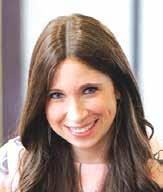
lationship with Rabbi Aryeh Lebowitz. With her unique blend of professional expertise in both speech therapy and education, Mrs. Adina Bollag is poised to create a significant impact on the Yeshiva of South Shore community, as she leads the ECC into an exciting new era. She is excited to introduce many new programs that will enrich the chinuch experience of the children and families of YOSS. The entire Yeshiva community eagerly anticipates the positive contributions she will bring to the Hollander Early Childhood Center!
The Kadima program at the Gural JCC strives to ease some of the pain, hardship and confusion single parents feel with the break up of their family unit. Whether it is helping them get ready for the new school year, providing a fun, free gap camp during those difficult days between camp and school, offering in person and virtual support groups for women, men and children, or the many relevant workshops and lectures featured throughout the year, we are always in touch and available to our clients and responsive to their needs.
The Marion & Aaron Gural JCC works closely with other agencies and resources to bring our clients relief and support. At our parties and gap camp Gourmet Glatt has generously provided the snacks for the children, and, recently, our friends at the Jewish Center of Atlantic Beach sponsored a delicious summer pizza dinner for forty-five Kadima families. Our wonderful friends at Merrick Jewish Center have frequently donated holiday gift cards, and our great supporters, The Ramer family, hosts a wonderful Chanukah party each year.
When a single parent joins our program – be they separated, divorced or wid-
owed – we assess their needs and where they are holding in this painful journey to help move them forward – Kadima – in the ways that are appropriate for them.
They might need financial guidance, to learn about government entitlements, to meet others in a similar situation, or simply a listening ear and a supportive shoulder to lean on. Every client is treated with dignity and respect and is welcome into our supportive family.
There are countless times in the course of the year where a single parent will feel particularly vulnerable and anxious.
With the start of the new school year and a month of holidays and related expenses, we recognize the needs of our clients may now be escalating. To that end, we will be hosting a boys’ and men’s holiday clothing event in the coming weeks.
A single parent should never feel alone. If you or anyone you know is a single parent, feel free to contact the Kadima program at the Gural JCC: Rachayle Deutsch (516)569-6733 ext.222, rachayle.deutsch@guraljcc.org.
The Marion & Aaron Gural JCC is a proud non-profit partner of UJA-Federation New York.







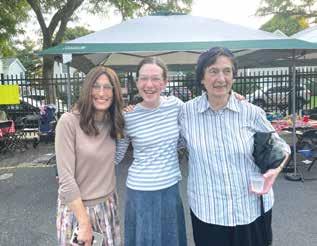


















As Israel grows ever closer to the one-year anniversary of October 7, the events of that horrific day and the ongoing war have changed Israeli society in so many ways. Undoubtably, the most affected are the hundreds of families dealing with the direct loss of loved ones, many of them young wives with small children who said goodbye to husbands before leaving for the reserve duty from which they would never return.
In response to the unique emotional and practical needs of this community, Colel Chabad, Israel’s longest continuously running charity in operation founded by the first Rebbe of Lubavitch in 1788, held a summertime retreat in Jerusalem, welcoming over 300 people.
While Colel Chabad has been running its Chesed Menachem Mendel Orphan Intervention Program for many years, the scope of need has grown exponentially over the past ten months. While welcoming orphan families of all types, about two-thirds of the attendees at the Jerusalem retreat were those who had lost fathers in the war.
Rabbi Efraim Duchman, Director of Development for Colel Chabad, said, “The goal of our events is not simply to help these families get out of the house

and gain some much-needed relaxation and enjoyment. But it’s more about knowing that they are part of a community that cares for them and will be looking out for them in the months and years ahead when they might think that they are alone. They become a family.”
As part of the retreat, the families enjoyed a trip to the Jerusalem Zoo and then returned to the Leonardo Hotel
Yeshiva University High School for Boys, MTA, is thrilled to welcome several new rebbeim to its already outstanding and dedicated team. Each one brings his own unique teaching style, and all are excited to meet their new talmidim next week!
Rabbi Yehuda Balsam is joining MTA as the Rosh Beis Medrash and a full-time Rebbe. He attended Tiferes Moshe, MTA, KBY, Mir, YU and RIETS and he received semicha from Rav Mordechai Friedlander (of Yerushalayim). Rabbi Balsam has worked in several camps and summer programs, currently a leading member of the chinuch staff at Camp Morasha and Morasha Kollel. Rabbi Balsam joins MTA from DRS, where he taught for the past 23 years. Rabbi Balsam lives in North Woodmere with his wife Chavie and their four children.
MTA is also pleased to have Rabbi Zaki Dayan join their team of rebbeim. Rabbi Dayan serves as the Assistant
Rabbi at Fleetwood Synagogue and is a member of YU Kollel Elyon, where he began his studies in the fall of 2023. Raised in Flatbush, he studied at Yeshivas Aish Gesher in Jerusalem for two years before earning his rabbinical degree from RIETS. Rabbi Dayan is married to Gabrielle, and they have two daughters. Rabbi Dayan is passionate about teaching Torah and is looking forward to joining the MTA team as a Bekius Rebbe.
Rabbi Yaakov Fuchs is joining MTA as a Tanach Rebbe. Rabbi Fuchs grew up in Woodmere, New York, where he graduated from DRS Yeshiva HS, and spent much time in his formative years learning under Rav Moshe Weinberger. After spending two years at Yeshivat Shaalvim, Rabbi Fuchs graduated from Yeshiva College majoring in History, while learning under Rav Mayer Twersky. He is currently pursuing Semicha at RIETS and simultaneously working towards his Master’s degree at the Azrieli Graduate
by a group of synagogues and individuals in Teaneck, New Jersey and West Hempstead, NY.
In an effort to provide even more support for the young children, each family was assigned a volunteer “mother’s helper” for the duration of the stay. “Every one of these volunteers are graduates of the Chessed Menachem Mendel program,” Rabbi Duchman added. “They came back here, for three days of their own vacation, to volunteer to help a new family. They have experience with it and know what it means to be here, connecting with other children in a similar situation.”
Among the volunteers at the fair was Sarah Greenblott of Woodmere, whose four children, aged three through nine, raised over $1,000 with a lemonade stand that went towards providing for the needs of the children of fallen Israeli soldiers.
where they were staying for a variety of art projects, shows, entertainment and meals. Participants were all invited to a “back to school fair” where the kids were able to choose all their new supplies at no cost. Each child was presented with a “Bag for Hope,” a brand-new backpack through a program founded by Menachem Traxler, Director of Colel Chabad’s Pantry Packers program, and supported
“We wanted to come for the summer, regardless of everything. A lot of people thought we were crazy because of the situation. But we love Israel, and we wanted to come to support. I’m proud to be here with my kids and showing that we can give something to these families who have lost so much.”
School of Jewish Education and Administration. Rabbi Fuchs has a lot of experience in the world of informal chinuch, serving as a Madrich on NCSY Kollel for two summers, as well as a division head, rebbe, and staff Maggid Shiur at Camp Mesorah. During the academic year, he has served as an Advisor Coordinator for NCSY and is currently one of the directors of NCSY’s new Pivot program for yeshiva high school boys.
Rabbi Yitzy Lanner is another young, relatable rebbe who was born and raised in Boca Raton, Florida. Rabbi Lanner graduated from Katz Yeshiva High School and then spent two years studying at Yeshivat Shaalvim in Eretz Yisrael. Rabbi Lanner then attended Yeshiva University, where he received an MS in Psychology and spent all three years learning in Rav Mayer Twersky’s shiur. Currently he is pursuing semicha and a master’s degree in education through the Azrieli graduate program. Rabbi Lanner will be joining
MTA as a Machshava Rebbe. Rabbi Yoni Sonnenschein is returning to MTA as a full-time Rebbe and Athletics Director. He grew up in Baltimore, MD, and after attending Yeshivat Shaalvim for two years, he came to study at Yeshiva University. He received his semicha from Yeshiva University’s Rabbi Issac Elchanan Theological Seminary, and a certificate in mental health counseling from the Ferkauf Graduate School of Psychology. He had the zechus to learn under Rabbi Zvi Sobolofsky, Rabbi Yaakov Neuburger, and Rabbi Baruch Simon. He is currently finishing up a Master’s degree in Social Work. Rabbi Sonnenschien lives in Teaneck with his wife and son.
With this illustrious group of young, dynamic Rebbeim, MTA is bringing their learning to new heights in The Heights!

U.S. Congressman Anthony D’Esposito honored, commemorated, and awarded nearly 50 first responders from several different agencies across New York’s 4th Congressional District for their service to the community. The ceremony took place at the David Mack Center for Training and Intelligence in Garden City, New York. Congressman D’Esposito was joined by dozens of members of the NY-04 community, colleagues in government, as well as the families of first responders.
“I was proud to honor so many first responders from New York’s 4th Congressional District for their heroic actions in service to our community. As a retired NYPD Detective, I’ve had the pleasure of meeting and working with
many of tonight’s recipients. They are, without a doubt, America and New York’s finest,” said Rep. D’Esposito. “As a member of Congress, I’ve fought diligently to advocate for our first responders at every turn. I will never stop giving a voice to the brave men and women who keep our communities safe.”
Congressman Anthony D’Esposito’s First Responder Awards Ceremony comes on the heels of several, high-profile and tragic deaths among first responders, such as slain NYPD Det. Jonathan Diller. Rep. D’Esposito led House Republicans in a string of touching tributes to Diller and other slain officers earlier this year.
The event was held Thursday, August 22, 2024.


This summer, Yachad (a division of the Orthodox Union) ran its epic annual Yad B’Yad program, creating an incredible community where teens with and without disabilities came together for five weeks for an adventure-filled, spiritually uplifting experience in Israel.
Yachad helps individuals with intellectual, developmental, and learning disabilities participate more fully in the community, via social, recreational, educational, and vocational programs in 10 regions across the United States, Israel, and Canada. Yad B’Yad is its one-of-akind summer program experience.
Whether hiking the stunning landscapes of Israel, singing under the stars, or bonding over shared interests, every moment was infused with energy, purpose, and a profound sense of belonging. Participants pushed themselves to new heights, forged lifelong connections, and embraced their diverse interests and capabilities.
The ruach was palpable throughout, as participants supported one another and created memories that will last a lifetime. From epic water activities to thought-provoking discussions, the Yad B’Yad experience empowered each individual to grow in remarkable ways.
Some highlights included waking up in Bedouin tents, camel riding, rock climbing, zip-lining, and rappelling. The trip was infused with spirituality, and staff led learning programs, chaburahs, and shiurim. Participants traveled via the “Bus Beis” – which was packed with sefarim – facilitating independent and chevruta learning everywhere they went.

Volunteering was also a focus of the trip, and the group packaged food for the needy, cleaned up national parks, and visited older adults.
The personal transformations and unbreakable bonds formed this summer are a testament to the magic that happens when we come together b’yachad, celebrating and supporting everyone. The Yad B’Yad community returned home inspired, empowered, and forever changed, with new friends and leadership skills.
As one Yad B’Yad parent put it, “What an incredible, fun and meaningful summer! Thank you thank you to everyone who went above and beyond to make this happen and give our kids such an amazing and impactful experience!”
Another parent said, “The connections forged and deep meaningful self-reflection my son experienced is nothing I ever expected. He feels so tethered to all the kids on the program and is so grateful for the opportunity. Everything was so


well executed, so intentional, and simply so perfect. We are grateful for his experience, the staff’s energy and hard work, and most of all for being a springboard for positive change in his development as a teenager.”
Participants are already counting down until their Simchat Torah reunion and getting excited to bring back all that Yad B’Yad taught them to their schools,
shuls, and communities. They are eager to get involved in Yacha’s year-round Shabbatons, events, and special programs. See the full schedule of national and international Yachad events at yachad.org/ events.
Pre-registration for Yad B’Yad 2025 is open at yachad.org/yby/pre-register/.





11 months. Over 330 days in operation. Hundreds of volunteers. Thousands of duffel bags of gear and equipment.
Since launching on October 8, the Israel Chesed Center in Hewlett has become the largest private supplier of humanitarian aid to Israel, enabling Jews (and some non-Jews) from all over the New York area and beyond to lend a hand in support of our brothers and sisters.
As an organization – perhaps the only one in the world – whose ultimate goal is to be able to shut down, the Israel Chesed Center is committed to continuing for as long as needed to provide support to soldiers and Israelis in need, while engaging individuals and enabling anyone with a desire to do Chesed to be an active participant in helping fellow Jews.
As the Chesed Center gears up for the beginning of the school year, the Yomim Tovim, and the first anniversary of the October 7 Simchat Torah massacre, let’s take a look back at the summer.
Together with our partners, Boots for Israel, Shiva Asar B’Tamuz saw Camp Morasha campers and staff pack over 500 pairs of boots, 300 tactical bags, 800 hydration packs and thousands of bags of beef jerky for Chayalim, and over 1,000 pairs of shoes for displaced families. Morasha Kollel guys made over 100 pairs of IDF green dri-fit Tzitzit, launching the period of the Three Weeks in a mindset of achdut and chesed
Local Day Camps
A number of local day camps focused their summer Chesed projects on the situation in Israel and partnered with the Chesed Center to engage their campers and parents! During the Nine Days, Camp Hillel hosted an A Capella concert with
the popular, and amazing, Jewish music group Six13. The next night, Camp Avnet hosted a pizza and packing event, attended by over 200 campers and their parents. While day camps do not ordinarily do night activities, our community of caring Jews recognized that this was no ordinary summer! Over 50 girls from Camp Revach visited the Chesed Center during their Chesed Week, helping us pack up hundreds of pairs of shoes.
Other Events
The ICC was privileged to host other important events and prominent speakers over the past few months, including:
Former MK Rabbi Dov Lipman, who inspired 200 people with amazing stories from the war, many of which will be featured in his new book, The Magic in the Tragic, which will be released on October 7.
Singles Events and Concerts –
Various events hosted by the Mashadi Youth Committee from Great Neck, local shadchanim, the Young Israel of Hewlett (Playing Dead concert) and Project Inspire raised over $35,000 for Israel, and provided opportunities for over 500 people to come to the Chesed Center and to volunteer for Israel.
Yonatan Ben Hamou, a wounded IDF soldier who was adopted by the 5 Towns community during his rehab, made a number of appearances at the ICC, including an evening program attended by over 200 members of our community which raised over $100,000 to help wounded soldiers.
Funeral of Hersh Goldberg-Polin
The summer of 2024 ended with the tragic news of the murder of six hostages – Carmel Gat, Eden Yerushalmi, Alexander Lobanov, Almog Sarusi, Ori Danino and Hersh Goldberg-Polin, HY”D. As a community, we were all shocked by their

brutal murders and saddened by their deaths. The deaths of Ori and Hersh hit particularly hard at the Chesed Center, as we had built relationships with their families since October 7. Einan Danino, Ori’s mother, spoke in many places around the Five Towns and inspired hundreds of people at the Chesed Center in March. Hersh’s parents, Jon and Rachel, have been the leading advocates for the hostages, speaking on their behalf all over the world, including at the Democratic National Convention a few weeks ago. The ICC partnered with the Goldberg-Polin family during the Week of Goodness in July, during which the Chesed Center hosted shiurim and other events, including a packing event on behalf of the family of Adina Zahavi z”l, an Oceanside native who perished in a house fire in her home in Israel while saving the lives of eight of her children. Rabbi Jonathan Muskat and the Young Israel of Oceanside spearheaded the donation and packing of over 25 bags of brand-new clothing for the Zahavi family, who lost all of their possessions in the fire.
On Labor Day, September 2, over 150 members of the community gathered in the Chesed Center parking lot to hear Divrei Chizuk from Rabbi Shalom Axelrod and to watch the livestream of Hersh’s funeral, mourning and crying together for the loss of Hersh and the other hostages, for the pain that their families are experiencing, and for the suffering that we, Am Yisrael, have experienced for the past eleven months. Recognizing that hundreds of thousands of IDF soldiers are still risking their lives every day, the program concluded with a very moving rendition of the Mi Shebeirach L’Chayalim by Chazan Sholom Jacobs and the singing of Acheinu
Coming Up at the Chesed Center Schools and shuls have been booking events at the Chesed Center for the coming school year (with the caveat that we hope to be out of business by the time the event rolls around), and a number of community events are planned: Israelis for Israel Family Fair on September 8
Sheva Brachot for Raylie & Yakov Tischler on September 11 (7pm), hosted by the Chesed Center and Crave! Raylie and her siblings launched the collection of goods for Israel within minutes after Simchat Torah ended, and her father, Moshe, together with Jeff Eisenberg have tirelessly dedicated their lives to helping Acheinu B’nei Yisrael for 11 months! Join the Sheva Brachot on September 11 to show your appreciation for individuals who have made Chesed their lives and to share in a community Simcha (to register go to tinyurl.com/ICCshevabrachot).
Pre-Yom Tov Shuk on September 15, featuring local food, wine and gift vendors (see ad on page 63)
Bake Sale – Sept. 28 and 29. To register - tinyurl.com/ICCbakesale.
Succah / Decorations / Lulav & Etrog depot with Naftoli Feitman and the Succah Spot
Community-wide October 7 commemoration and memorial art project
To receive up to the minute information on events and volunteer opportunities, join the Chesed Center WhatsApp chat at tinyurl.com/icc02, contact israelchesedcenter@gmail.com, or stop by the Israel Chesed Center at 1315 Peninsula Blvd., Hewlett, NY.
Adina Zehavi z”l event

By Monet Binder, Esq.
Awill is usually the first thing that comes to mind when thinking about estate planning. In fact, many people who contact me tell me they “don’t need anything complicated – just a will.” Wills are important, but relying on only a will is risky and actually forces your family into court, may result in your assets not reaching your intendeds, and does nothing for incapacity protection.
A will is a legal document stating who gets what of whatever you own and it allows you to appoint who will be in charge of those things. There are three parties to a will, the testator, that’s the person who makes the will – you. Then there’s the executor, that’s the person you choose and trust to manage what you own. Last are the beneficiaries which could be your loved ones or charitable organizations. This legal document must be submitted to
the Court to ensure it complies with state statutory regulations. If the will doesn’t meet the requirements, the court rejects it, and it’s like having nothing at all.
One of the biggest estate planning myths I hear from clients is the belief that by having a will, their loved ones won’t need to go to court after they die. Sadly, the opposite is true. If you use only a will as your main method of estate planning, you are actually guaranteeing that your loved ones will go to court after your passing because a will is required by law to go through the court system called probate before any of your assets can be distributed.
The three parties of a will all must be approved by the probate court. Until that full approval process happens there are NO distributions to anyone. This approval process does not happen quickly, by any stretch of the imagination. It typically takes 1-2 years, even without anyone contesting, and it is expensive – typically

it can be 5% of the total value of what you owned, and it’s public – there is nothing private about this court process. Once the will is submitted to the court for approval, everyone can see what you owned, who your beneficiaries are and what they are receiving. All of this is extremely difficult for families.
A will should be used as a piece of your overall estate plan, not as the entire plan itself. By using better tools like a Trust as your main estate planning tool, your family avoids probate court entirely and ensures the people you trust can step in and manage your assets immediately if you become incapacitated while you are living, and are in charge after you’re gone. Also, any assets you put into your Trust are entirely private; the court and the public will never know what you own or who will inherit those things. Your will should only need to serve as a backup and safety net to make sure
that any assets that are accidentally left out of your Trust at your death are added back into your Trust. And, even more important than both a will and a Trust is an inventory of your assets so your family knows what you have, where it is, and how to find those things when you lose capacity or pass away.
If you’re ready to see how having an estate plan for your family is different than having “just a will,” schedule your Estate Planning Design Session 718-5147575 or 732-333-1854. We’ll guide you and your family through every step of the process.
Monet Binder, Esq., has a practice Brooklyn, Queens, and in Lakewood areas, dedicated to protecting families, their legacies and values. All halachic documents are approved by the Bais Havaad Halacha Center in Lakewood, under the direction of Rabbi Dovid Grossman and the guidance of Harav Shmuel Kaminetsky, shlita, as well as other leading halachic authorities.
Estee Ackerman loved ping pong more than anything. But she also loved and honored the Jewish tradition of Shabbos. At eleven, she began to rise in the ranks of tournament players, making it all the way to the finals of the U.S. National Table Tennis Championships. She only had one player left to beat to win a gold medal-but the final match was set during Shabbos, and the judges said they couldn’t change it. How could Estee choose between her passion and her faith? This is the true story of a girl’s struggle between her love for her religion and her love of the game.
Ping-Pong Shabbat: The True Story
Did you know?

of Champion Estee Ackerman is written by Ann Diament Koffsky, a resident of West Hempstead. Estee also resides in West Hempstead and teaches in HAFTR. The book went on sale on September 10.
Pickleball was invented in 1965 by three fathers, Joel Pritchard, Bill Bell, and Barney McCallum, who wanted to entertain their children.


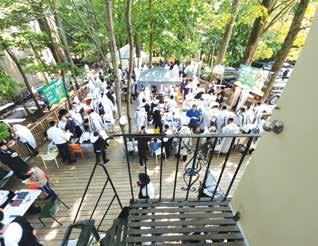

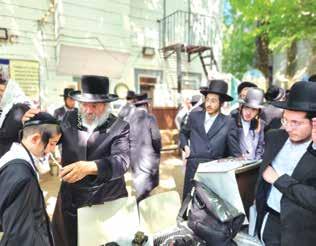


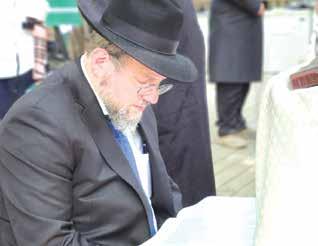

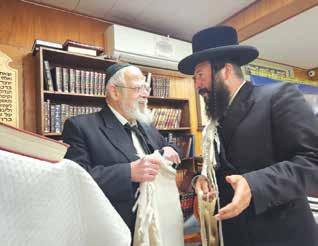





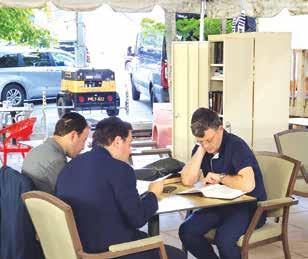










Dr. Shaul Schwalb
Alignsmile Multi-Specialty Group
For those who have not seen my ads in this paper, you know the one with the frog photographer, I can easily predict that this article will be uplifting and inspiring.
For those readers that did catch the frog wave, perhaps clarity will emerge from an explanation of what all this is about.
You see, sometimes, forty years of a dental career servicing the frum community results in more than a high dental IQ.
Sometimes, it teaches many lessons for both myself and the communities I have served faithfully.
An allure for me, of dentistry as a profession, has been its interaction with patients of all kinds and ages. Interaction with children, teens and adults both mature and almost mature, has really been a joy.
In providing family dental care to neighborhoods as vastly different as Williamsburg, Flatbush, Five Towns or more recently a northern village in Monsey called Pomona, common ground has been complicated to find. Yet each neighborhood offered much rich culture of its own, nuanced town meshugas, I would say that I picked up along the way. The jokes in yiddish to a Monsey teenage boy would fall flat on a Five Towns kid. The Flatbush bochur would just think I was weird if i offered him the advice I would a Monsey young chosson, aged 18.
What always got me through each day was a smile! That catchy flip of the lips and cheek that could not be denied, regardless of where I happened to be practicing.
What is it about a great smile that disarms your opponents, lights up a room, or clearly conveys in no uncertain terms that you are at peace with yourself?
There is a well-known Gemara that tells us to make sure you are not sad in public, as it reflects a sour disposition in
Did you know?
front of the king.
If we are all loyal subjects of the king of kings, Hakodesh Baruch Hu, and we seem displeased with our daily lot, it speaks volumes of our relationship with our Father in Heaven.
Nechemia, of the Babylonian kingdom, seems sad when he is delivering and pouring wine for the Persian monarch. He is distressed by the Jerusalem situation and that his brethren trying to build Bayis Sheini are in terrible straits; with Jerusalem’s gates torn down and burned! Yet Nechemia fears for his life, as the king will not be pleased with a cupbearer who is not smiling. Could the king be off with his head, thinking that Nechemia looks worried because he is trying to poison the king?
You see, a smile is sometimes a life saver, sometimes a necessity. When we allow worries or a bad dental issue to restrain our smile muscles, we appear unhappy with G-d’s kingdom, His rule of this world! We also bring ourselves down, we show no confidence of spirit, no assurance of our present or future!
What is worse, though, is this: we share that unhappiness with the world, bringing it down with us! That is the tragedy of the un-smile!
We could have lifted someone up, instead we brought him down. A smile is indeed catchy.
I have always been “into” cosmetics. Though some doctors love pain control, or as I bluntly put it, blood and guts, I have always been attracted to cosmetics in dentistry. Though the smile may be only a minor part of cosmetics, I have felt it is the most integral part.
Around 15 years ago, I began treating patients with aligners to create their new smiles. I had been certified in a new technique by a new company called Invisalign, some time before. I was hesitant to apply newfangled dentistry to real live patients. Would a plastic tray move teeth? Cannot be. Can the movements, if there were any, be controlled to produce predictable results? Would the treatment, basically moving teeth with plastic

trays that were switched every 2 weeks, be comfortable enough to wear 20 out of 24 hours a day? Could treatment be provided in an affordable way, both for the provider, myself, and the consumer?
Over the years, I found myself doing more and more of these aligner orthodontic cases, and each case I accepted was more complicated than the previous. I asked myself why I was so drawn to these treatments? Quotes for cases were even lower than necessary for a healthy profit! Why was I so excited to treat aligners?
I have come to the conclusion that for me, dental provider satisfaction was painless happy dentistry.
Every case starts with a patient who asks for a more beautiful smile. It is rare that these patients need prodding or pushing to get treatment. What starts out as a case for aligners to straighten the smile for beauty and aesthetics but that offers a twofer. Meaning, our alignment presents our teeth to a very interesting phenomena: self-cleaning teeth. The new alignment gives us very little sugar attack time, as straight teeth offer self cleaning teeth and gums. A patient getting aligners gets the bonus of less cavities and less gum disease. Less cavities means less fillings, crowns, root canal therapy extractions and implants. That is just the way it is!
Over the years as I was getting into aligner orthodontics, I came across one problem: labwork.
Every aligner case starts with an imprint of the full mouth, done the old-fashioned way with goo in the mouth or with a modern day very high speed scanner that is a camera. In about 8 minutes, a painless, gooless, computer file is created. This file is sent to a designer to create from that file a treatment plan and eventually many treatment models.
For any given case, these files turn into 3-D printed models which, in turn, turn into clear beautiful treatment align-
ers.
However, sending the case out to large companies began delaying treatment. Instead of happy doctor, happy patient, we were getting frustrated doctor, sad patient! To this very day, any case sent to a big lab creates a month’s wait!
I, therefore, took over all steps of production of aligners. Today I can boast that I can go from consultation to aligner trays in my patient’s mouth in 48 hours. Expenses are lessened, time to get a quote that is real is shortened, and doctor and patient are once again happy and thrilled. In the event a tray is lost, no biggy!
Replacement in no time!
Every patient with aligners is a happy patient. Every patient is in control as they are in charge of which 20 hours a day they wear the aligners!
Indeed, as cases completed patients eagerly show off the new smile they and I created together. They can even use the trays to whiten their teeth as well!
All in all, medicine in general and dentistry do not only require confidence, experience and skill. They also require a happy provider of that treatment. They necessitate an environment that fosters a trusting, warm, cordial and happy relationship.
In opening a new office in my hometown, in addition to my busy office in Pomona, NY, I am thrilled to have two other Five Towns longtime resident doctors working with me: Dr. Seth Maltz, a skilled and certified Oral Surgeon for over 25 years, and Dr. Eric Nussbaum, an Endodontist skilled in all aspects of root canal therapy, with over 25 years experience.
We are thrilled to work right here across the street from HAFTR High. We are equally excited about providing care to our friends and neighbors. Our philosophy is simple, provide very experienced professional care with the utmost of care in as affordable a way as possible. We would not do any less for our friends and neighbors!
Dr. Saul Schwalb has resided in the 5 towns for over 20 years and is proud to be bringing our community AlignSmile Multispecialty and in particular AlignSmile aligner orthodontics. The office is located at 650 Central Avenue Suite A. They can be reached at 516.218.2652 or at alignsmile650@gmail.com.
By Rabbi David Sutton
Hashem redeems the soul of His servants, and all those who take refuge in Him will not be condemned (Tehillim 34:23)
In this pasuk, David HaMelech offers us a glimmer of understanding regarding one of the big questions of bitachon. That is, why do the righteous suffer?
The commentaries, based on the Midrash, explain that Hashem sometimes punishes people in this world so that their slate will be clean and pure in the Next World, enabling them to enjoy the exquisite reward they deserve. The Midrash says that when the tzaddikim witness wicked people suffering in Gehinnom, they praise Hashem and thank Him for the suffering that they had in this world. This is reflected in a pasuk (Yeshayah 12:1) that says: “Odecha Hashem ki anafta bi yashov apecha usinachmeini — I thank You, Hashem, for You were angry with me, and now Your wrath has subsided and You have comforted me.”
After 120 years, b’ezras Hashem, as we bask in the Shechinah in Gan Eden, we will thank Hashem for all the difficulties that we endured in this world. Thus, when the pasuk says, Hashem redeems the soul of His servants… [and they] will not be condemned, it means that these two ideas are connected. He redeems their soul with suffering so that they won’t be condemned in the Next World.
However, the afflictions people suffer in this life are not an automatic soul cleanser. We have a part to play, and this is to seek refuge in Hashem in our time
of trouble. That is what brings a person to perfection.
There is another interpretation of this pasuk from the Meshech Chochmah (Vayikra 19:12), which deals with our efforts to do teshuvah. The Chovos HaLevavos (Shaar Teshuvah, Perek 10) observes that, sometimes, we recognize our sins and want to repair them, but it is logistically impossible to do it. Perhaps we don’t know where to find the person we wronged, or we don’t know how to appease him. It would seem that the sin will still be sticking to us when we reach the Heavenly Court.
That is when Hashem steps in and redeems the soul of His servants. If we rely on Him to help us do teshuvah, He will give us the money we need to set matters right, or soften the heart of someone who is holding a grudge, or even find someone halfway across the world whom we need to ask for mechilah. If we are sincere in our teshuvah and “take refuge in Him,” Hashem will make sure our sins are not allowed to be condemned.
As the following story illustrates, Hashem can help a person correct an unresolved situation even after he’s left this world:
During World War II, the Chazon Ish borrowed money from an acquaintance before he set off on a journey, planning to repay it when he returned. However, because of the dangers posed by the war, he never went back to his city.
After the war, the Chazon Ish kept looking for this man and inquiring about his fate, hoping that he would be able to repay his debt. However, with all the confusion and displacement of people, no one knew if the man had
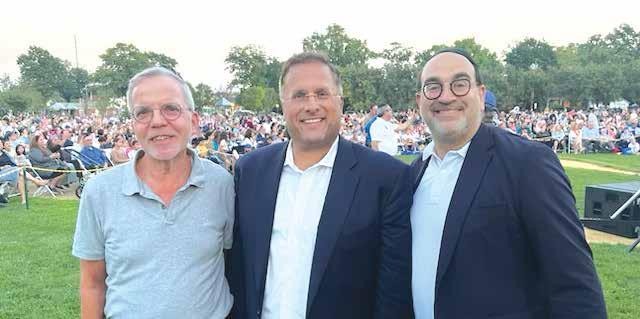
even survived.
The situation bothered the Chazon Ish, and many of those who were close to him knew how hard he tried to find the man. The matter remained unresolved, and the Chazon Ish passed away. At his shivah, a non-religious Jew walked in.
“I saw the notices hanging about the death of R’ Avraham Yeshayah Karelitz,” he told the family members. “I remember him from our younger days, so I decided to come and pay my respects.” He told them his name and where he was from.
“Did you ever loan my brother money?” asked the Chazon Ish’s brother.
The man said that he had done so. The brother took money out of his pocket and paid the man back. Thus, Hashem arranged that even after his death, the Chazon Ish’s debt would be paid off. “Hashem redeems the soul of His servants.”
This pasuk bolsters our bitachon when we keep in mind that it applies to

everyone, not just tzaddikim.



The Five Towns shul l eague , now nearly 20 years old, is showing the level of interest and excitement that can be generated by an enterprise intent on quality softball and achdus. with four teams added to last year’s participants (Y i of o ceanside, Y i of Plainview, north woodmere Misfits, and Aish Kodesh), the connections and competition grew to unprecedented levels. Commissioners Jordan hiller and Dom DeRosa (as their predecessors e li Dworetsky and g ordon Zisholtz did before them) share a vision of a league that brings people together of all backgrounds. There is a certain pride playing for your shul. a nd there is a certain bond that all teams have knowing that it is a league built on the traditions and passion

associate with shul, a dedication that emanates from the relationships formed between brachos and kiddush. we hope it will only grow and include more kehillos from the Five Towns and beyond. The A League playoffs included last year’s Champs, the YIW, as well as KAY Shul (formerly Pickwick), woodsburgh, and e dward avenue. in the semis, KAY, as the 1 seed, played Woodsburgh and held on to win 4-1. YIW took care of business against woodsburgh on the ageless arm of Steve Pollan. In the finals, Pollan stepped up again, and pitched 7 scoreless, as Y iw goes back-to-back and beats KAY and their very talented lineup by a score of 2-0. Con-

gratulations to the entire team and Captains Rabbi nussi l ieberman and Yehuda Konig.
The B League playoffs had a surprising start but a familiar finish.
The 1 seeded Aish Kodesh team in their first year in the League got a lesson in post-season softball, as last year’s finalists, Ohr Torah, knocked them off their pedestal winning by 6 runs (11-5). Meanwhile, the 3 seeded Shteeble beat 2 seeded Forest handily, being that shteeble is a well-rounded, professional team always playing efficient, smart softball. In a rematch of last season’s epic finals, which Shteeble won in ridiculous comeback fashion, ohr Torah and shteeble played a defensive grudge match, with shteeble prevailing 2-1. Congratulations to Captain Mendy Wechter on the dynasty you have built.





When push came to shove, I took the bull by the horns and decided to kill two birds with one stone. At the end of the day, it was do or die, so I went back to the draw ing board. Lo and behold, I hit the jackpot and made hay while the sun shone. Every cloud has a silver lining, and I was over the moon when I realized I’d knocked it out of the park. That being said, I didn’t want to put all my eggs in one basket or count my chickens before they hatched. Time was of the essence, and I was burning the candle at both ends while burning the midnight oil. I had to shape up or ship out, so I bit the bullet and went the whole nine yards. Long story short, I rolled up my sleeves, put my nose to the grindstone, and left no stone unturned. I crossed my t’s and dotted my i’s, making sure to dot every i and cross every t. It was sink or swim, so I pulled out all the stops and gave it my all. I was in it to win it… When the chips were down, I played my cards right and aced it with flying colors.

When the dust settled, I’d passed with flying colors and came out smelling like a rose. It wasn’t rocket science, but it was a tough row to hoe and a hard nut to crack. I had to take the rough with the smooth and roll with the punches. At times, it felt like I was beating a dead horse or barking up the wrong tree, but I stuck to my guns and weathered the storm.
In the nick of time, I turned the corner and saw the light at the end of the tunnel. It was music to my ears when I realized I’d hit the nail on the head. I was firing on all cylinders, cooking with gas, and firing on all four burners. Still, all’s well that ends well, and now I’m sitting pretty on cloud nine, feeling like the cat that got the cream. I’m on top of the world, riding high, and living the dream. It just goes to show, when life gives you lemons, make lemonade, and you can have your cake and eat it too.
(Submitted by Moshe Hoffman, utilizing AI)
Create a 7 word sentence using the word “was” 5 times and the other two words being “before” and “is.”
Answer: Before was was was, was was is.

Guess the cliché based on the origin
1. Refers to timely sewing, where fixing a small problem early prevents a bigger one.
2. Refers to avoiding hitting the bird directly by beating bushes to scare it out.
3. Originates from the mistaken release of a cat hidden in a sack instead of a pig in marketplaces.
4. Refers to infrequent astronomical events when the moon appears blue.
5. Comes from early military practices, when soldiers bit bullets to endure pain during surgery.

11. From Ancient Greece, where votes were cast with beans; spilling the beans revealed the outcome early.
12. A phrase of solidarity referring to passengers in a ship sharing the same risks.
13. Biblical phrase describing a narrow escape.
14. From horse riding, when holding the reins too tightly controls the horse poorly.
15. Refers to someone being deceived, from an old practice of pulling wigs over the eyes.

6. From tennis or basketball, where the responsibility to act shifts to the other player.
7. Refers to being born into wealth and privilege.
8. From medieval times when someone who was caught red-handed was found with blood on their hands.
9. From old shipping practices where ships would break the ice in waterways to allow navigation.
10. From falconry, where hooding a bird keeps it calm.
16. Refers to a U.S. weather scale where cloud nine represented the highest height for clouds.
17. Refers to someone taking credit for another’s idea or success, from early theater disputes.
18. Comes from fairs and carnivals where cigars were given as prizes, but near misses earned nothing.
19. Early sailing phrase, indicating when a ship was at risk of losing control.
20. Ancient Roman practice, where a grain of salt was taken to counteract poison.
Clichés:
1. A stitch in time saves nine.
2. Beat around the bush.
3. Let the cat out of the bag.
4. Once in a blue moon.
5. Bite the bullet.
6. The ball is in your court.
7. Born with a silver spoon in their mouth.
8. Caught red-handed.
9. Break the ice.
10. Keep it under your hat.
11. Spill the beans.
12. In the same boat.
13. By the skin of your teeth.
14. Hold your horses.
15. Pull the wool over someone’s eyes.
16. On cloud nine.
17. Steal my thunder.
18. Close, but no cigar.
19. Wild goose chase.
20. Take it with a grain of salt.
Law and order are the hallmarks of a functioning democratic society. The concept that one can receive fair redress for damages and hurts through an equitable system of established justice is central to the concept of a free society that provides individual rights to its citizens. However, dictatorships also provide law and order for those who live under their rule – a little too much law and order. And therein is the eternal contest: between an ordered and properly functioning society and an individual’s inherent freedoms and rights.
There is a great deal of space and latitude between anarchy and dictatorial rule. The Torah speaks to this issue but allows for a great deal of human and national choice in the matter. The general tenor of Jewish tradition is to be wary of big and powerful government. Avot teaches us not to be known to government and that the nature of government is to demand, albeit apparently lovingly, much from the individual when it is for its own benefit but to be unavailable to help the individual when

By Rabbi Berel Wein

one is hard pressed and in need of outside help. Yet Avot also stresses the necessity for government and the requirement to pray for its success and welfare, for otherwise society would be unliv-
equitable standards of law enforcement.
The Torah is clear in its condemnation of corruption and bias, especially in judicial and legal matters. The poor and the wealthy, the scholar and the
As in all matters of human existence, the Torah here demands from us a good sense of proportion, wisdom and sophistication in dealing with government and society.
able. As in all matters of human existence, the Torah here demands from us a good sense of proportion, wisdom and sophistication in dealing with government and society. The Torah does not deal with us in absolute specific terms but rather establishes general parameters of righteous judicial systems and
unlettered, the well-connected and the unknown, all are to be equal before the eyes of judges and the law. The Torah defines true justice as being the pursuit of righteousness and fairness by just means. No unjust means can be condoned even in the pursuit of apparently righteous causes.
The Torah abhors corruption in all forms and methods. The premise of the Torah is that corruption is a natural state of being for humans. We are all somehow corrupted by our past experiences and our preset worldviews. It is interesting to note that, for example, the results of many cases brought before the United States Supreme Court are almost always predictable because of the previous strongly held views of the individual justices. They are certainly not corrupt in the criminal sense of the word, but in the world of the Torah they are certainly not freed from the taint of corruption. The Torah demands an open mind, a listening ear, flexibility of thought, and an understanding of human nature and of the ways of the world from those who would serve as judges of other humans. These qualities are not found in abundance, but they are to be searched for and respected in Jewish life and law. True and absolute justice may be unattainable in this world. But the concept of true justice must always be present in all matters of Jewish law and society. Shabbat shalom.


By Rav Moshe Weinberger
Adapted for publication by Binyomin Wolf
The Torah teaches us in Parshas Shoftim about the Jewish way in war. We learn who is fit to go out to the field of battle and who is exempt. The first three exemptions (Devarim 20:5-7) are one who has built a new house but not yet inaugurated it; one who has planted a vineyard but has not yet redeemed it; and one who has betrothed his wife but has not yet married her. But the most fundamental of the exemptions is the last one (ibid. 8): “And the officers shall continue to speak to the nation and say, ‘Who is the man who is fearful and faint of heart, let him go and return to his house and not weaken the heart of his brothers to be like his heart.’”
It is clear that the presence or absence of fear is the most crucial factor in war. Victory in battle depends primarily on the morale, spirit, and disposition of the troops. This is true both in terms of people’s belief in what they are fighting for as well as their confidence in their own victory. When soldiers believe in the justice of their cause and in the ultimate success of their efforts, they invest their entire heart and soul and are ultimately victorious. But if they are filled with self-doubt, worries, and fear, or if they are ambivalent about the cause they are fighting for, it is almost certain that they will be defeated.
This is why this parsha, which is devoted to how to prepare for battle, focuses primarily on the morale of the soldiers when they go out to war. The Torah says (ibid. 1-4):
When you go out to war against your enemy and you see horse and chariot, a nation greater than you, do not be afraid of them, for Hashem your G-d, who lifted you up out

of Egypt, is with you. And when you approach the war, the kohein shall approach and speak to the nation and say to them, “Listen Israel! You are approaching war with your enemies today. Let not your hearts become faint. Do not be afraid. Do not tremble and do not be terrified before them, for Hashem your G-d goes with you to do battle for you with your enemies to save you.”
Even though the Jewish soldiers might be tempted to be afraid because they see an enemy with more soldiers than they have and more powerful weapons than they possess, the kohein anointed for war was commanded to reassure them that they had no reason to fear because Hashem, Who performed all the miracles for them in Egypt, would personally arrange their victory. This message was not directed only at “the man who is fearful and faint of heart” but at the entire nation. Hashem knew that His people would never be
successful if they were filled with fear or self-doubt. They had to feel certainty and confidence in their ultimate success or else they would not be victorious.
Yeshayahu says in the haftorah (51:13), “And you will forget Hashem Who made you, Who spread out the Heavens and founded the earth, and you are always afraid all day because of the fear of the terrorizer who is preparing to destroy….” He was rebuking us for being unnecessarily afraid and not internalizing the Torah’s reassurances. The Radak explains this pasuk as follows: “You should have realized that the One Who created the world has the power to save you from a human being. How were you afraid of a person and did not remember G-d, Who, if you return to Him and ask Him, will save you from his hand?” We must know that if we trust in G-d and thereby feel confident in battle, victory is ours.
We need this reassurance today more than ever. Hashem’s message to
us through the Torah is that He “has our backs.” Our cause is just, and we should fight those who seek to harm us with confidence in the morality of our efforts and in the certainty of our ultimate victory.
But Hashem’s message to us as we go out to battle is not only relevant to physical battle, which is not something that every Jew has to face. There is another type of battle hinted at in the parsha which does apply to every Jew at all times. It is now Elul, time to fortify ourselves for the ultimate battle. The Ohr Hachaim Hakadosh, zy”a, offers an explanation of the pasuk, “When you go out to war against your enemy.” He says: “Perhaps the pasuk hints at a person’s war with his evil inclination and [the Torah] comes to remove the faintness from his hearts and says, ‘When you go out to war,’ the well-known [war] greater than any other.”
In this spiritual war, just like in a war against a physical enemy, victory depends on a feeling of confidence and a lack of fear and faint-heartedness. The greatest danger is when a person wants to return to serve G-d but is afraid that he is simply too weak and that he will not be successful in battle. In the words of the pasuk, he is afraid of “horse and chariot, a nation greater than you.” The Ohr Hachaim explains that these three things hint at the three main factors that take away a person’s confidence in his battle against the evil inclination.
“Horse” hints at the fact that one sees the evil inclination as a horse ready for battle, strong and powerful. The person, however, feels weak and ill-equipped
for spiritual war. The Hebrew word for chariot, rechev, is connected to the word “mixed, murchav.” Fighting one’s evil inclination is hard because we have mixed feelings. We desire not only holiness and goodness but also physicality. Because we are not exclusively committed to our own side, we are afraid that we will not be successful. And “a nation greater than you – am rav mimecha ” can also be translated to mean “a great nation from you.” We are afraid that our past sins have created a great nation of sins and evil forces which handicap us in our fight against the evil inclination. If we had to fight this spiritual battle on our own, we might have reason to fear. But thankfully, we need not be afraid because we have our own kohein anointed for war, Rav Avraham Yitzchak Hakohein Kook, zy”a , who shows us (Oros Hateshuva 14:4(1)) how the Torah’s message applies to us in our own fight against the evil inclination. He says, “Most failures come because a person does not believe in the ease of teshuva.” It is actually a cinch! A person thinks it is impossible for him to beat the evil inclination because he is under the impression that spiritual battle must be
difficult and drawn out with many casualties and much pain. The truth is in the war of teshuva, victory is easy and guaranteed! The Holy One Blessed be He promises: Go out to war! Be a soldier! And I promise you, “G-d will not abandon you into his [the evil inclination’s] hand” (Tehillim 37:33). “Hashem your G-d goes with you to do battle for you with your enemies to save you.”
Each person has his or her own favorite phrase hinted at by the letters of the word “Elul.” The most well-known is “I am my Beloved’s and my Beloved is mine, Ani l’dodi v’dodi li .” But there are several other, less well-known acronyms which correspond to the word Elul. One of the more interesting ones is “sending gifts a man to his friend, and gifts to the poor, Ish l’ray’aihu u’matanos l’evyonim” from the book of Esther (9:22). Yet another one is “And Hashem your G-d will circumcise your hearts and the hearts of (es l’vavcha v’es l’vav) your children” (Devarim 30:6).
But Rav Naftali Ropshitzer, zy”a, in the sefer Zera Kodesh has one that many

people are not familiar with, which is particularly appropriate to the topic at hand: “For Hashem your G-d goes in the midst of your camp to save you and to give over your enemy before you –L’hatzilcha v’laseis oyvecha lefanecha – [so] your camp shall be holy…” (Devarim 23:15). Hashem is in our midst, fighting for us in our physical battles as well as our spiritual battles, so we need not be afraid. If we give ourselves over wholeheartedly to G-d in the battle for teshuva and thereby fulfill “I am my Beloved’s,” then we know Hashem will reciprocate – “my Beloved is mine.”
Chabad chassidim have a tradition regarding another acronym for Elul: “Leibedik un vayter leibedik – lively and more lively.” If we fight with confidence and joy because we trust in the fact that Hashem will make us successful in the battle against the evil inclination, the battle of teshuva, then it is certain that He will fight for us and we will win.
As we say in L’Dovid starting in Elul, “Hashem is my light and my salvation, of whom should I be afraid?! Hashem is the might of my life, of whom should I be terrified?!” We must approach the battle for teshuva, for spiritual growth,
with joy, confidence, and strength, and not with fear, dread, and hopelessness. As Rav Kook says (Igros Haraya II p. 36), “The foundation of everything is that one must come to explain the over-arching principle of the unwavering trust in teshuva, the powerful serenity, and joyful might in which every person in whom the light of teshuva illuminates his soul must enclothe himself.”
May we merit to remember Hashem’s love for us and His promise that He will do battle with our physical and spiritual enemies. By doing so, we will fight with confidence and certainty and Hashem will cause us to be victorious over those who would harm us physically and over the evil inclination. May we thereby merit to see the complete conquest of our enemies and the slaughter of the evil inclination with the coming of the complete redemption, may it be soon in our days!
Rav Moshe Weinberger, shlita, is the founding Morah d’Asrah of Congregation Aish Kodesh in Woodmere, NY, and serves as leader of the new mechina Emek HaMelech.

By Rabbi Avrohom Sebrow

When Moshe Rabbeinu wanted to dissuade the populace from joining Korach, he made the following profound proclamation:
“If these men die a natural death, that means G-d did not send me. But if G-d will make a new creation such that the earth opens its mouth and swallows them alive, then this will prove that G-d did send me” (Bamidbar 16:29). This declaration, though seemingly harsh, was a necessary measure to halt the rebellion’s progress. But why did Moshe Rabbeinu choose such a seemingly severe punishment for the followers of Korach, that the ground would swallow them alive? Wouldn’t it have sufficed if the ground swallowed the followers of Korach after they already perished?
The Belzer Rebbe, zt”l , said we can find the answer from a Rashbam on the following Gemara in Bava Basra (74a): Rabbah bar Bar Channa met an Arab merchant. The merchant told him, “Come, I will show you the men of Korach that were swallowed up.” He showed him two cracks that emitted smoke. Rabbah
bar Bar Channa took a piece of clipped wool, dipped it in water, attached it to the point of a spear, and let it in there. When he took it out, it was singed. Thereupon the merchant said, “Listen attentively to what you are about to hear.”
Rabbah bar Bar Channa heard chanting from the followers of Korach: “Moshe and his Torah are true, and we are liars.” Whereupon the merchant said, “Every 30 days, Gehinnom causes them to turn back here as one turns flesh in a pot, and they say thus: ‘Moshe and his law are true and we are liars.’”
The Rashbam comments that the followers of Korach could only say that Moshe Rabbeinu and his Torah are true because they went down to the grave alive. The Belzer Rebbe, zt”l, commented that this was precisely Moshe Rabbeinu’s intent. He wanted the followers of Korach to have a chance to do a measure of teshuvah. Had they not descended to the grave alive, they never would have had the opportunity. At least now they were able to show their contrition by admitting the error of their ways. Even after they publicly
performed a terrible sin, Moshe Rabbeinu still wanted them to be able to do teshuvah. As they were being swallowed alive, they were able to declare, “Moshe and his Torah are true, and we are liars.” This story is a powerful reminder that no matter how dire the situation, the opportunity for teshuvah is always present, offering hope and redemption.
We similarly find the power of teshuvah late in the game from a different aspect of the Korach incident. Rashi on Chumash (Bamidbar 16:7) wonders, since Korach was so bright, why did he instigate such a foolish rebellion that was doomed to failure? He answers that Korach had a prophecy that Shmuel HaNavi would be one of his descendants. Korach reasoned that if he perished in this rebellion, Shmuel could not be born; therefore, he would not die in the uprising, and Shmuel would be one of his great-grandchildren. It is a decent argument. Where did Korach go wrong?
Korach’s sons joined him in the rebellion. He assumed they would share the same fate as him. That was his error. Kor-
ach failed to take into account the possibility of teshuvah. Even though his sons supported the rebellion and were part of it, they had the free will to discontinue any time they wanted. Sure enough, at the last minute, they did teshuvah. The Gemara in Sanhedrin says that his sons did not share the same fate as he did. Hence, Shmuel could be born.
Rashi states that Korach was a smart man. He was a Torah scholar. Yet even he could not realize this awesome potential of teshuvah. Korach assumed that if he was wrong, there was no way his children could recover from such a terrible error. But Korach was wrong about that, as well. No matter how far a person has strayed or how late in the game, the gift of teshuvah is available to all.
Rabbi Avrohom Sebrow is a rebbe at Yeshiva Ateres Shimon in Far Rockaway. In addition, Rabbi Sebrow leads a daf yomi chaburah at Eitz Chayim of Dogwood Park in West Hempstead, NY. He can be contacted at ASebrow@gmail.com.
By Rabbi Yair Hoffman
Their names and holy souls pull at the heartstrings of any feeling Jew. Many of them exemplified remarkable heroism and sacrifice. They went back to save friends and protect others. We all davened and said Tehillim for them for the past eleven months. And now, sadly, six of the 250 kidnapped neshamos have been brutally and depravedly murdered – 2.4 percent.
Ori Danino, Hy”d Carmel Gat, Hy”d
· Hersh Goldberg-Polin, Hy”d
· Alex Lubanov, Hy”d
· Almog Sarusi, Hy”d Eden Yerushalmi, Hy”d
The Rambam in his Yesodei HaTorah of his Mishna Torah writes about them. These six precious souls were murdered solely because they were Jewish, and the Rambam writes in Yesodei HaTorah (5:4), “There is no virtue above their virtue.”
The Rambam applies to those who are murdered solely because they are Jewish. Two verses in Tehillim refer to this: (44:23) “It is for Your sake that we are killed all the time, that we are considered as sheep for the slaughter; and Tehillim (50:5), “Gather to Me My devoted ones, who made a covenant with Me over a sacrifice.”
Let’s focus on two aspects of this Rambam for a moment. They are called, “Harugei Malchus ” and they are also called, “My devoted ones.” But the Rambam lists among them Chananya, Mishael and Azaryah – and they did not die! They were ultimately saved!
That’s one question. But let’s also ask a second question – a question that applies to our current situation. Almost every day we cry. We read in the news of remarkable soldiers who were taken in the prime of their lives. The second question is: how do we get out of this?
The resolution to the first question

is that Chananya, Mishael, and Azaryah were willing to die.
The obvious extension is that every fighting soldier involved in the three conflicts currently facing Israel is included in this category as well.
Which brings us to the answer for
neighbor as ourselves.
So, in order to get out of this, we must all markedly increase our observance and appreciation of this mitzvah of ahavas Yisroel. And we must daven, pray, and search for every means at our disposal to help our brethren out. At ev-
At every opportunity we should be melamed zechus on Klal Yisroel.
our second question. But first, a remarkable Shela HaKadosh (found in Shaar HaOsios Brios). The Shela notes that there are 620 letters in the Aseres Hadibros, the Ten Commandments. The last seven of these letters form the two words “asher l’rayacha,” a term intimately associated with the mitzvah of v’ahavta l’raya kamocha – loving our
ery opportunity we should be melamed zechus on Klal Yisroel and not like those who assume the worst. We should also practice the notion of “Resha versus Rasha. Always remember the following dictum: ‘Hate the Resha but love the Rasha. Hate the notion of evil but love the Rasha.’” This refers to acheinu bnei Yisroel The pasuk in Vayikra (19:17-18) tells
us not to hate your brother in your heart but practice v’ahavta l’rayacha kamocha.
The Gema in Brachos (32a) says that our care and concern for others must be to the point that in our ahavas Yisroel when we hear of their difficulty that we become sick over it, citing a drasha of a pasuk, “vayichal Moshe.”
In the Gemara in Yuma 75a, it states, “If one has anxieties, he should relate them to someone else.” The Sefer entitled “Igra d’Pirka” gives an interesting explanation to this. He asks what is the reason for this Gemara. He answers that it will help enable a cure. How so? He can say, “Look, Hashem, I understand why I have received this punishment or travail. But why should my friend also suffer stress on account of this?” With this valid claim, one can shift or change a Divine decree.
Sharing the burden thus helps his or her own situation.
I would like to add another two thoughts. The first is that the Gemara (Bava Kamma 92a) tells us that whoever prays for his friend is answered first. The causing of your friend to pray for you will cause his or her own prayers to be answered first. Having this in mind is a manifestation of ahavas Yisroel as well.
The second thought is that the TaZ tells us that whenever one prays for another person he should always add the words that Hashem should provide that person with greetings of a refuah shleimah among the other cholim of klal Yisroel. He writes that this, in fact, effects a quicker and better cure.
All this shows the incredible power of ahavas Yisroel.
This article should be viewed as a halachic discussion and not practical advice. The author can be reached at yairhoffman2@ gmail.com.
What’s normal?
No one was worried when my husband Bob retired that he would lack things to do; he is the kind of guy who does well with his own company. Bob can learn Torah, sit and read, or watch TV.
We share values and goals, but we have very different personalities, not the same at all. When I became a principal with a jam-packed schedule and a crazy two hour commute, Bob became the chef and house manager. We had a woman who cleaned the house, but he did all of the shopping and cooking. I would ask him what the kosher pedigree was of a new utensil. Bob’s cooking skills are famous in our community.
Now that I am no longer driving nor an administrator tasked with never-ending prep, phone calls and emails, there is real worry about what I will do to fill my time.
Our apartment in Israel has a black giant screen Apple TV that is supposed to ensure that we will never be bored. We have not once turned it on for our own entertainment in the seven weeks that we have been here.
This year marks the first time in my adult teaching life that I am not getting ready for “September/school.” I have been thinking about these weeks all summer; as we planned our move, settled into our apartment, went from appointment to appointment and back again (especially banks) and began the complicated process of figuring out what to do with our now free time.
I have never been one to spend days in pajamas watching TV or reading; even during COVID, I would need to do three things at a time while out and about inside my house. Every afternoon during those locked in months we would take long masked walks.
Now that 5:00 a.m. wakeup days are behind me, you can find me on Usishkin, the main thoroughfare, on my way to the gym by 7-ish in the morning. It’s me and the people running for the bus or on their way to minyan.

By Barbara Deutsch
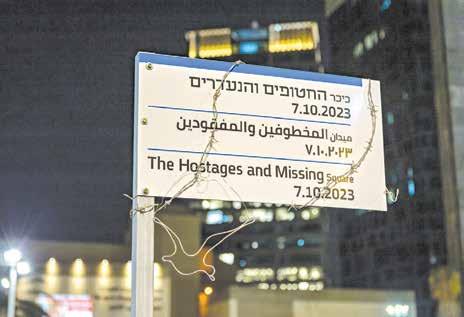
Old habits die hard.
Even as a kid, I always loved the cooler days of late August; it reminded me of sharp, pointed pencils, brand-new notebooks, a new outfit and, later as I began my teaching career, empty rosters that soon would be filled with the names of the students who would be in my brandnew class.
I love it – still do.
A teacher is the lucky individual who gets to explore, guide and support children hungry for an understanding of the unknown in all things social, emotional and academic. A child’s teacher spends most of his or her waking hours playing and learning together. It’s an incredible journey of discovery; I will miss traveling that road with my students and colleagues.
Friends and family have been nonstop offering me support and encouragement to find “other” opportunities. I have to figure it out myself.
It seems that I have returned to being a student. Bob and I are navigating the unknown in our aliyah together; there is an overwhelming amount to learn and figure out, and we are lucky to have a partner. We have found that some things can be told to you, but most things need
to be experienced in order to understand.
Just this week, I realized that when I speak Hebrew, most hear English. That became clear to me when I attended a spin class with a Russian instructor. This lovely woman instructed the class participants in a fluent but heavily accented Hebrew; I heard Russian. Were it not for the fact that I have been using a spin bike for over 15 years and instinctively know the moves, I would be clueless.
I have not started Ulpan, so my Hebrew is mostly gym words. Ulpan is on chofesh, along with the rest of the country.
Sigalit, my new Israeli lovely manicurist, speaks no English; between us there are a lot of hand motions, smiles, friendly gestures, and broken gibberish. We have determined that I will only speak Hebrew to her English. It’s better for me not to remember the metallic color I finally took off this week.
I asked her for the name of someone as good as she is to cut my hair. Everyone who knows me knows that I have a “thing” about it; if the cut is good I don’t have to do anything but wash it daily, which I do. I don’t even own a comb or brush. “Shai is the best; you can trust him to do what you need. He has Tourette’s but he speaks English.”
I did speak to him. He seems nice and speaks English. I haven’t made an appointment yet.
Dear friends are here visiting. It’s been wonderful to catch up and share lazy meals. In New York, we would never have allowed ourselves that luxury. We went to Hostage Square, a deeply depressing place, together. We bought t-shirts and listened to testimony and looked at posters of what we hope are still vibrant faces.
Why are they still not home?
Last week, we were supposed to host a barbecue for soldiers with a lot of people from Rechavia; the bombing shut that down. It was very disappointing to plan to do a good thing and have it canceled. People from “home” kept calling to check if we were okay.
I was annoyed by the canceled barbecue and not worried about the bombing.
When we went for brunch in Tel Aviv, the restaurant was packed with hungry vacationers. It is located right across the street from Hostage Square so it gets good business from the tourists and school groups. When we asked for a table, the owner chastised us for having no reservations.
“I am a new oleh, and don’t know better,” I told her.
“Are you kidding me?” she responded in disbelief. Five minutes later, we were seated and ordering delicious food and planning good times with the rest of the vacationing crowds.
It’s an upside-down world!
Being a student is exciting with or without pencils and notebooks. I’m that quick learner working hard to figure it out every day; it’s my new normal.
Every day in Israel is a gift!
Barbara Deutsch is the former associate principal at HANC, middle school principal at Kushner, and Dean of Students at Yeshiva of Flatbush. A not-retired educator, she is trying to figure out life in Israel through reflections on navigating the dream of aliyah as a wife, mother, grandmother, great-grandmother and friend.
By Gedaliah Borvick


Ioften write articles about people whose names adorn street signs in cities across the State of Israel to learn about individuals who have left their mark on the Jewish nation. Nowadays, new names are emblazoned in public areas across our country, and their legacies are inspiring our country.
Since October 7, grassroots campaigns have taken place to educate the public about our heroic warriors who died Al Kiddush Hashem protecting our nation. The medium used is the humble bumper sticker. These stickers usually feature the person’s name, photo, date of passing, and a quote or value reflecting their spirit.
What began with a few stickers has evolved into a widespread movement of creating multiple-sticker memorials. These memorials now appear in various public spaces—elevators at Ben Gurion Airport, bus stops, lamp posts, train stations, and pedestrian bridges—basically, wherever people gather.
All of our fallen heroes leave behind legacies worthy of emulation. One poi -
gnant example is my dear friend Eli Moshe Zimbalist. Despite his passing at just 21, Eli Mo left a profound impact.
The fact that I call Eli Mo a dear friend, when he was barely a third my age, high-
ical hands that he used to fix and build, his powerful work ethic, his disdain for wasting time, and his tremendous love of family and community, but the sticker campaign is a good start. Eli Mo’s legacy
His sticker bears the Hebrew words “Don’t wait for them to ask, just help!” encapsulating his essence as a caring, proactive individual.
lights his unique ability to create meaningful relationships with people of all ages and all backgrounds. His sticker bears the Hebrew words “Don’t wait for them to ask, just help!” encapsulating his essence as a caring, proactive individual. Obviously, a bumper sticker cannot properly reflect the fullness of a person’s essence. There is so much more to say about Eli Mo, including his mag-
of unity and responsibility serves as an inspiring message for our nation.
The proliferation of stickers has prompted many to photograph them, ensuring that the memory of these fallen heroes is preserved. Observing these photographers evokes a range of emotions, eloquently captured by Rabbi Dr. Allen Selis in his poignant recounting of one such encounter.
“I’m about to step onto the train when I catch one last glance of the soldier opposite me. He’s done snapping pictures, but pauses before he turns away from the Coke machine. He reaches up and touches one of the stickers, then pulls his hand back to kiss his fingers. The way we kiss a mezuzah upon leaving home. Or the way many kiss a Torah scroll when it passes near us in synagogue. Or the way we caress a gravestone before leaving the cemetery, embracing the memory of the one we’ve lost by sharing one last kiss. Train doors open. Separately we climb on board. Both of us holding onto something that we can’t quite leave behind.”
May we never leave our courageous and holy heroes’ legacies behind.
Gedaliah Borvick is the founder of My Israel Home (www.myisraelhome.com), a real estate agency focused on helping people from abroad buy and sell homes in Israel. To sign up for his monthly market updates, contact him at gborvick@gmail.com.


By Eliyahu RosEnBERg
t the beginning of 2019, athletes from all around the world came to Israel to run in the Jewish state’s annual national championship race – the Tiberias Marathon. Hundreds stood at the starting line – some professional racers, others new to running – waiting for the race to begin. The marathon’s 26-mile course stretched along the shores of the Sea of Galilee, winding through towns and beaches. It wouldn’t be an easy course to
traverse – nor would it be an easy race to win – especially not for relatively new runners, like Beatie Deutsch, a frum Israeli mother of five.
Did anyone expect Beatie to win? Well, her coach did, and she did, too; after all, she wasn’t in this race to lose. But if you’d look at her from a purely objective standpoint, you probably wouldn’t bet on her victory. Putting her then-inexperience aside, it was her outfit that seemed to un-
shabbos is a very special mitzvah to me. i love that shabbos is an opportunity to disconnect from everything and to be so present with my family and with hashem. There’s nothing like it. it really does feel like a taste of olam haba in a certain way, and i love it.
if you recognize a talent that you have or something that you’re good at, you have an obligation to use it. l ike, it’s not actually even an option. hashem gave it to you, and you have to run with it. you have to figure out how you can use it to make a difference. a nd practically, you just need to start with one small step.
i never want to live my life from a place of fear, because fear is not a helpful emotion; it holds us back. i want to live my life choosing to do this because i believe this is right.
dermine her athletic ambitions the most. While her competitors sported typical running attire, Beatie was dressed in a modest manner that was rather unusual for an athlete; she wore a headscarf, a long skirt, and a long-sleeved shirt. Her clothes, while tzinius, were not conducive to running long distances, let alone winning 26mile races. But she didn’t seem to care. Her attire, while somewhat uncomfortable and disadvantageous, was a source of strength for her, for it reminded her that it wasn’t just her running all on her own; with every step, with every sprint, she knew that she was running with Hashem.
And then, the race kicked off and the sea of athletes swarmed the streets, running along the shores of the ancient lake. The marathon was going swimmingly for Beatie, who was enjoying the thrill of competitive running; the air blowing on her face, her heart racing with excitement. But, as Beatie found herself approaching the race’s halfway point, her heart suddenly sank. From the corner of her eye, she saw a blurry figure running in the distance – far, far ahead of her. “Who is that?” she wondered. Beatie continued running and squinted her eyes until her competitor came into view. It was another Israeli woman.
It was a sobering realization. Beatie couldn’t comprehend how she had fallen so far behind one of her fellow runners. Her flushed face turned red, her nostrils flared, and her heart pounded in anger and disappointment. Was it even possible for her to catch up?
“At that point, I knew that the odds were against me. But in my head, I said to myself something that had really gotten me through many of the hard workouts where I wasn’t at all sure if I’d be able
to keep up with the pace,” Mrs. Deutsch recalled. “I said, ‘I am connected to HaKadosh Baruch Hu. I have a Tzelem Elokim inside of me, and Hashem is infinite. There’s no limit to what HaKadosh Baurch Hu could achieve. So, by that same token, I am connected to infinity; there’s no limit to what I can achieve.’”
Her coach’s warnings echoed in her head, “Do not increase your speed before the 20-mile mark. Do not do it. It would be foolish to sprint for miles and miles.” But Beatie ignored that advice. With several miles left of the race, she started picking up the pace, running as fast as she possibly could. All the while, she kept repeating to herself, “Hashem is with me every step of the way. Anything is possible.”
Eventually, Beatie caught up with the woman. Two minutes later, Beatie’s competitor, exhausted and panting, turned to the frum mother, saw the determination in her eyes, and said, “I’m finished. This is your race; keep going…”
Beatie ended up crossing the finish line, miraculously winning first place as the marathon’s fastest female runner. In just two hours and forty-two minutes, Beatie Deutsch completed the Tiberias Marathon’s 26-mile course, a not-so-insignificant feat that landed her on the Israeli Olympic Committee’s radar. Soon after the race, the committee reached out to Beatie, inviting her to become a professional runner for Israel. With encouragement from her husband, family, and rav, Beatie Deutsch accepted the offer and hasn’t looked back since.
As Beatie puts it, “I always knew I enjoyed being active, but never in my wildest dreams would I have imagined that I’d get to run every single day, twice a day, for my job.”
Beatie Deutsch was born in Washington, D.C., and when she was a young girl, her family moved to Passaic, New Jersey, where she spent most of her childhood. From a young age, she loved athletics, a passion that was all but forgotten when she entered adulthood. She also had a deep love for Eretz Yisrael and decided to make aliyah after attending seminary.
It wasn’t until around eight years ago when Beatie, at age twenty-five, decided to try her hand at running.
“Basically, I was an out-of-shape mom of four. I gave birth to, baruch Hashem, four kids in six years. I was barely surviving every day, working a full-time job and taking care of my family,” she recounted. “And I just felt like I needed to make a change in my life. So, I told my husband that I was signing up for a marathon at the end of that summer. And my husband actually did not blink an eye. He was super supportive.”
That first race, which she ran in 2016, led her to running more marathons and half-marathons. After running several races and miraculously winning the 2019 Tiberias Marathon, Beatie’s running hobby became her career. And after she went pro, it didn’t take too long for her to set her sights on the 2020 Tokyo Olympics, a goal that was, perhaps, a tad bit too ambitious, considering the fact that it was nearly impossible to qualify for the race. However, against all odds, Beatie qualified for the games by ranking as one of the top 80 female runners in the world.
“Things got very complicated, because the date of the Tokyo 2020 marathon for women was moved to Shabbos. Not for men – only for women,” she recalled, chuckling at the irony of the situation. “As soon as they announced that, it was obviously clear to me that I wasn’t running on Shabbos… Running was my job, and I don’t work on Shabbos. And it also felt clear to me that maybe Hashem’s entire mission for me was to

say, ‘Even though I made it to the highest level in sport, there’s something more important, and that’s Shabbos.’”
Although Beatie tried to fight the decision to schedule the marathon for Shabbos, the International Olympic Committee was unwilling to accommodate her religious request. It was disheartening, but she knew she would never choose personal ambition over her frumkeit.
Alas, Beatie’s participation in the 2020 Olympics was never meant to be, as the games were pushed off and everyone was required to requalify for the marathon.
Although Beatie was close to requalifying, she missed the new Olympic standard by just two minutes.
“It’s almost embarrassing to say that you failed. And I embrace that part of my journey because I think you can never get to the depths of your potential and who you possibly could be if you’re too afraid to try and fail. Every failure that we have is a necessary step to bringing us closer to who we can possibly become,” Mrs. Deutsch declared.
“I am definitely hardwired to be resilient… And I think that is a very important strength of being an athlete. It’s part of what allows me to do my job so well. But also, with the challenges and failures I’ve gone through, I’ve had to remind myself to give myself space to deal with the loss,” she adds. “When you invest your whole heart in something, you can’t just say, ‘Oh, it didn’t really matter.’ Like, of course it mattered, of course it affected me, of course it was really hard. But, if I give myself the proper space to absorb that, then I can also move forward with resilience and strength.”
Then again, Beatie’s story isn’t yet finished. And with Hashem’s help, who knows? Perhaps one day she will fulfill her dream of running in the Olympics.
* * *
In 2021, Adidas launched an inspirational campaign, featuring a few athletes, including Beatie Deutsch. The campaign’s
tagline was “Impossible is Nothing” and featured an image of Beatie, running in her tzinius running attire, on billboards.
“I have always felt like running is really a vessel for me to share more of Hashem’s light into the world. And what Adidas saw in me was my uniqueness as a proudly religious, observant athlete, who isn’t afraid to stay strong and stay committed to her values, and that’s what they chose to highlight on the billboard,” Mrs. Deutsch explained. “I never wanted to be famous; I still kind of think it’s weird. And I’m very happy to be that anonymous runner who just does her thing, but I was grateful for the opportunity to be on a billboard, just for women all around the world who care about tzinius, modesty, to be able to say, ‘Wow, she’s tzinius and she’s a runner, and we could do it, too! We could push ourselves, we could pursue our dreams and passions, and it doesn’t mean we have to compromise on the values that are important to us.’”
Beatie isn’t embarrassed to admit that being tzinius is a mitzvah that, as a professional runner, is challenging for her. There’s no doubt that she would be able to run faster if she wore typical running clothes. But she knows that, fundamentally, her success as an athlete, at the end of the day, comes from Hashem.
“I care deeply about my relationship with Hashem, and this is what He’s asking of me, and this is important to me. And I find ways that are personally meaningful to me for why I am dressing tzinius, even though it’s boiling hot, even though it’s cutting off seconds of my time, even though it’s not nearly as comfortable,” Beatie Deutsch shares. “I feel like it’s a character trait. Like, being modest is something that I want to embody and live with at all times. And when you’re an athlete who works really hard and dedicates so much of your time and energy to getting faster, and then you have a great race, it’s easy to be like, ‘Oh, it was all my hard work that got me here. I worked hard and
that’s why I achieved this.’ For me, when I dress modestly, I remind myself every single time I’m running, ‘It’s not me; it’s Hashem. My strength is not coming from me, it’s from Him.’”
As an Orthodox Jew, Beatie’s favorite mitzvah is Shabbos. She was, after all, willing to sacrifice what could have been the biggest break in her career to avoid desecrating the holiest day of the week. In Beatie’s words, Shabbos is like a “taste of Olam Haba,” as it allows her to disconnect from the mundane world and be present with Hashem and her family.
Beatie is often referred to as the “Marathon Mother.” Although she is a proud runner, she is an infinitely prouder mother. As Beatie explains, the one thing she wants to be remembered as – more than as an athlete or a runner – is as a great mother. While she knows that her role as a runner is ultimately replaceable, she understands that she is the only person in the world who can be a mother to her children.
Beatie believes that every person has a unique gift and an irreplaceable role in this world, and she urges everyone to recognize and act on their one-of-a-kind talents.
“If you recognize a talent that you have or something that you’re good at, you have an obligation to use it. Like, it’s not actually even an option. Hashem gave it to you, and you have to run with it. You have to figure out how you can use it to make a difference. And practically, you just need to start with one small step,” Beatie Deutsch advises. “If you’re doing something every single day that’s bringing you a little bit closer, and you just break it down into the tiniest, tiniest baby steps until it’s manageable and less scary, then you know you’re moving in the right direction. Always find people who believe in you, support you, and want to help you become your best self and maximize your potential. Find those people and just keep them in your life close to you.”
Moderated by Jennifer Mann, LCSW of The Navidaters

Dear Navidaters,
I look forward to reading your column every Shabbos. I’m twenty and grew up in Lakewood. In the mornings, I learn in a local kollel in the Five Towns. In the afternoon, I work at a Jewish bookstore. The girl I’m currently dating is nineteen. She recently got back from seminary and plans to work as a teacher’s assistant. She has a lot of bitachon in Hashem and would make a wonderful mother. These are things I look for when it comes to shidduchim. We have been dating for three weeks now. While things are going smoothly there is something that concerns me. Recently, I was made aware that two of her brothers went off the derech. The reason this concerns me is I’ve been told many times regarding shidduchim that the children turn out like the mother’s brothers... Is this a reason to call off the shidduch?
Regards, Naftali*

Rebbetzin Faigie Horowitz, M.S.
What you are referring to is advice that has a source in Torah Sheba’al Peh. It says that one should investigate the potential partner’s brothers for this reason. There are many factors that are taken into account in such a situation according to the sefarim. Consult a rav on this matter.
Keep in mind that, unfortunately, many families have children off the derech today. Fortunately, many do come back to the fold. It is important that there are healthy relationships in all families, especially those with kids experiencing challenges.
I do think that you should take this shidduch slowly if you are given the goahead. The young woman is just out of
seminary and may be on a spiritual high from the special environment in Eretz Yisrael. Take the time to get to know her and her family well. Take the time to figure out finances and not rely on bitachon alone. The cost of living in the Five Towns is not cheap. Do your hishtadlus and make sure you can handle marriage, both its emotional and practical ends.
I believe you should not take this information as a concern about the shidduch and move forward. Perhaps over time you will get to know her brothers and see that even though they are off the derech, they have positive qualities to them that you can hone in on. Who knows? You might even make an amazing impression and eventually be a catalyst to help the brothers get closer to Yiddishkeit.
One more thing I would like to mention. It is important for you to ask yourself if there is something else that is bothering you about the shidduch. Are you simply looking for a way out?
Dear Naftali,
Shutting things down because of this newfound information about the girl you are dating’s brothers would be wrong. Simply look around, and you will find so many choshuv families who have sons who are off the derech. Does this mean that their daughters are unmarriageable?
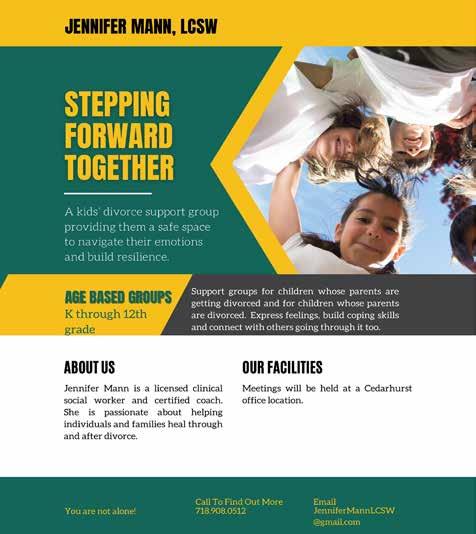
It’s important that you give the most important decision you will ever make the attention and time it deserves.
Tzipora Grodko
I’m just going to be super simplistic and say that comment about “mother’s
brothers” is simply not true. On a completely different note, I would encourage you to explore if there is SOMETHING ELSE that’s bothering you, and if you’re just using this example as a scapegoat to justify a different concern that you might be suppressing.

Please, please take the time you need to explore this relationship with professional guidance. (Professional means someone licensed to assist you.) There is NO PRESSURE to make a decision if you’re feeling doubtful. There is NO RUSH. This is your life, and it’s important that you give the most important decision you will ever make the attention and time it deserves.
Dr. Jeffrey Galler
Let’s see. You’re 20 years old, and every morning you learn in a kollel, and every afternoon you work part-time in a Jewish bookstore.
That sounds like an absolutely wonderful lifestyle. That is, for a semi-retired gentleman between the ages of 70 and 80.
Yes, going to the kollel is won -
derful for learning Torah, and yes, working in the bookstore is wonderful for learning how to deal with people and how to develop a healthy work ethic.
But – is that it? What are you going to do with your life? Until you have some clarity regarding your future, should you really be going on shidduch dates?
Here are three issues for you to please consider:
Issue #1- Kollel
Kollel can be amazing and transformative and can help you develop into a tremendous talmid chacham , but you need to go in with a plan. What are your goals? What is your end game? What do you want to come out with?
Seek guidance from your Rosh Kollel and seek mentorship from more experienced, more mature colleagues and chavrusas in your Kollel.
Issue #2 – Part-time employment
For someone who cannot afford to attend kollel full time, part-time gainful employment is very admirable. Working
The Navidaters
Dear Naftali,
Thank you for your email!
I certainly don’t have the answer as to whether or not to turn down a wonderful human because her brothers are off the derech. I can understand that this is of concern to you because people are telling you that your children may follow in their uncles’ footsteps and this would be deeply upsetting to you. I validate this concern fully.
I would like to present the idea that every family has some people and
presenting qualities and charac - teristics that may be un - familiar, scary or downright unsavory. In my humble opinion, while we do marry into a family, we shouldn’t be quick to dismiss someone because of people who are out of our control. In this family, there are “off the derech” brothers, in someone else’s family there may be an uncle sitting in jail, or an alienator, or a few narcissists, or a meddling family
in a Jewish bookstore is safe, educational, and enjoyable but perhaps it would be wiser to find a job that potentially could lead to future career paths.
For example, how about working in a real estate office? Or, working as an assistant to a plumber, electrician, photographer, printer, locksmith, or caterer?
Issue #3 – Part-time education
If a future in a Torah-related occupation, like being a mashgiach or a yeshiva rebbe, is not for you, then you might wish to consider professions that are attainable through part-time study.
For example, you may wish to explore studying to become a sonographer, radiographer, medical assistant, respiratory therapist, bookkeeper, graphic designer, digital marketer, or data analyst.
Your Question:
But let’s address the question that you asked our panel. You are worried that your future children might turn out like your girlfriend’s brothers, who went “off the derech.”
Please note: A nephew shares approximately 25% of his genes with his uncle. This is why a nephew might look somewhat like his uncle. They can have sim-
The question is, do you like or love this woman enough to navigate this family?
ilar facial features, hair color, or height. However, even though genetics contributes to physical traits, they do not predetermine behavioral outcomes, like going “off the derech.” That problem usually stems more from other very important factors, like family upbringing, environment, education, lifestyle, or happenstance.
Your question, and very legitimate concern, underscores how very, very important it is to spend time with, and get to know, a prospective mate’s family. Best wishes to you on your journey.
member. It really is always something. The question is, do you like or love this woman enough to navigate this family? Because someone else will.
In my findings and work, I have found that many people forget what this is really about. It’s about finding your partner. Life is hard and challenges are plenty. We all come with a pekaleh. And if you can walk away from someone wonderful because of her brothers, we do need to explore the depths of your feelings for this woman and also what it is you are looking for in a relationship. There are many wonderful frum families whose children have chosen a different path. And if you are reading this (and I know you are), I want you to know that your children are worthy
of love and you are worthy of love and likely have done a wonderful job raising them and showing them Yiddishkeit. And if they make a different choice, this is most likely in no way a reflection of you or something you did wrong. They are worthy of getting married and so are your other children. I couldn’t not make this point.
I think the world of shidduchim is so messy and confusing and the people dating are receiving a lot of these “scary” messages. Let us remember that Avraham Avinu’s father worshipped idols, and he turned out pretty great. Just some food for thought.
Sincerely, Jennifer
By Etti Siegel


Q:Dear Etti,
Welcome back. I hope you had a nice summer. I hope you will choose to print my letter when you start your column again for the new school year. I really missed reading your insights.
Here is my question: There are more and more young teachers than ever, and my children keep getting first year teachers as their morahs for the year.
I miss the days of the experienced morah who ran the classroom. I miss the advice an experienced morah could give me.
How should I view these new teachers? Should I worry that my children are getting a subpar education?
-A Concerned but Resigned Mommy
A:Dear Concerned but Resigned Mommy,
Thank you for your kind words. I hope you had a rejuvenating summer and are ready to get back to school-schedule life.
To address your important question: I’d like to change your signature to “Grateful and Hopeful Mommy”!
There is something so refreshing about a new morah. She is excited, she is ready to change the world, and she is full of great ideas. Nowadays, she also has probably had teacher-training, she probably has a mentor, and she probably has a principal or curriculum advisor guiding her. She wants to make a difference.
It is true that an experienced morah is wonderful, but unfortunately, there are less and less experienced morahs to hire. Though earnings have been increasing and perks have been added, I don’t need to tell you that
a larger family cannot live on a teacher’s salary.
The young teacher, however, is living on inspiration. And your daughter gets to bask in that presence!
Here are some tips that can help make sure your inexperienced teacher serves your child well. (These are also tips that might be wise to adopt for experienced teachers, too. Let’s return the job of teacher to its former exalted status!)
We need them to impart the wisdom and knowledge that we need our children to learn.
Be positive. Be respectful. Know that anything you say will be absorbed by your child and will affect her ability to listen and like her teacher, for good or for bad.
Be welcoming. Bring something for her when you come to Orientation/Meet the Teacher night or send something in for Rosh Hashana. It is the thought that counts – and she is anxious and wondering if the parents are happy with her. She is working so hard and is so nervous. She is not a mind reader. Send her an encouraging note.
Be specific. Tell her what you enjoyed. Tell her what you noticed.
Keep your eyes open. Noticing the good will affect how you view the teacher and will affect how your child views the teacher. Not only is this nice for the teacher, but it is also the greatest gift you can give your child. Have a complaint? Swallow. Ignore. It is probably a smaller problem than you realize. Most school stuff is! If you feel you must address it, wait. See if you still feel it must be dealt with after you let it ride a bit. You decided you must bring it to her attention? Turn it into a question.
Be kind. The teacher is new, and perhaps she did not realize what she said/did, etc.
We all are limited on time, but perhaps sending a complimentary note is as important as other tasks you find time for. Maybe you can stick pretty paper in your pocketbook and jot such a note the next time you are waiting in an office or another such venue.
Not only is it difficult to find good teachers, but it is also difficult to keep them. Schools ask a lot from their teachers. They ask them to prepare material from scratch, write lesson plans, create material for children who need modifications, mark tests, call parents, deal with parents… all while they ask them to be informative, innovative, and relevant in the classroom. They are critiqued by their principals and by their students, which means they are constantly judged by the parents (who might forget to filter what their children tell them).
We need these wonderfully courageous girls to jump in and teach. We need them to impart the wisdom and knowledge that we need our children to learn. They will make rookie mistakes. They will say or do something in a way you wish they wouldn’t.
Bu the truth is, we are all ma’aminim. We all believe that Hashem has a master plan. Last Rosh Hashana Hashem chose this teacher for this class. This is part of the plan. Live it. Believe it. Model it.
May this be a year of positive growth for our children…and for us!
Kesiva v’chasima tova, -Etti

By Sara Rayvych, MSEd
The summer flew by, and this week most of our community’s students are returning to school. There will be a mix of emotions: some children excited with the potential of a new year and others nervous, unsure of the uncertainty. There will even be students experiencing both emotions simultaneously!
Change is hard for children and adults alike; there is uncertainty and the unknown ahead. There is comfort in the familiar, and there can be fear in moving away from that. Most of our children will be in the same school as last year with the same class. But many of our students will be changing schools and peers – a full upheaval of all they’ve known.
Of course, we want our children to focus on the positive and potential ahead of them, but we also need to be sensitive to the many changes they will be experiencing and how this will affect them. Transitions –the movement and adjustment from one activity to the next – are a known struggle for many children. Our precious students may need extra support and understanding as they transition and adjust to a new reality.
There are many changes students experience in September/Elul. It’s a new beginning, and this comes with both excitement and trepidation.
When children walk into the classroom there will be a new adult in front of that big desk. Their rebbi, morah and teachers are likely different from the previous year and may be completely unfamiliar to them. Your child, as well, is unknown to this new teacher. It’ll take them time to understand each other and build that crucial kesher.
Each year there are some adjustments to the class make-up. Students leave the school, others join. Children can be switched between parallel classes, mixing up the previous groupings. Your child will be walking into a new group of peers, and this can be stressful for some youngsters.
Our community had many graduates in June. Most of those proud students will transition into a new educational framework. Preschool moves to elementary, middle school into high school, and eventually they move on to yeshiva/seminary/college. This is a major adjustment in many areas. Just one of these adjustments is to go from being the oldest kids in their school to the youngest. Those big sixth graders are now little seventh graders when compared to their surroundings.
Graduates often move into a new building with a different structure to the classes. I went to camp in my future high school so I knew where the classrooms were, but I can only imagine how confusing it was for the others. It’s scary not knowing where to go or how to get there.
Students slowly transition from one or two teachers for the entire day until they have a new teacher in a separate classroom for each subject. This, too, is an adjustment we take for granted. Each teacher assigns their own homework and tests, causing the student’s workload to increase dramatically. It’s a major change for a child or teen, and we need to be sensitive to this.
As they reach the older grades or posthigh school, many students will move into dorms. Sleeping away from home is a very emotional adjustment for teens (and parents!). We’re no longer present for them each day as everyone balances the child’s new independence with the unchanging need for guidance and love.
Just being sensitive to these changes provides a measure of emotional support, helping them adjust to the next exciting stage.
It can be hard for children to open up and discuss what’s bothering them. They may lack the vocabulary or emotional maturity to verbalize their feelings. Perhaps they feel foolish having these concerns or feel alone in their emotions. Parents can

help by gently bringing up the topic and giving their child a safe space to unburden themselves.
It helps to remember that at this time children don’t want lectures; they want compassion. They need validation, not to hear they’re “being silly.” Only after they’ve felt heard and understood can they think about a practical response.
Parents know their children and recognize who is more likely to have a challenge adjusting. This can guide parents in deciding whether their child needs that talk now or requires a wait-and-see approach. It’s important to remember that children can surprise us, and the often easy-going child may struggle at times, while the generally harder-to-transition youngster may slide into the new year with a smile. Watch your child and their behavior to gauge their ease of adjustment.
When possible, before the first day, parents should prepare their child for any anticipated changes. They will feel more comfortable having the knowledge and awareness of what to expect. Perhaps it’s their teachers’ names, driving past the new building the week before, or sharing with them the name of a familiar classmate who will be with them.
Parents don’t need to know it all themselves. Please reach out to your child’s teacher (current or previous), principal or a professional therapist if questions come up or the child is seriously struggling.
The Benefits of Change
Children are not meant to be chil-
dren forever. It’s our goal to raise healthy, well-adjusted adults who can live independently of their parents. We want them to be able to start families of their own –not depend on us for their entire adult life. We want to support our children, validate their feelings and love them. We don’t want to stifle their development or prevent them from experiencing all discomforts. Change is inevitable, at times painful, but often a tremendous source of growth.
Learning how to move through changes and adjust to the world around them is a crucial skill for children to learn. Throughout their life they will encounter new situations and people. Being able to regroup and process these changes will help them as they move through each new phase of life.
Many children who didn’t succeed in one environment may flourish in the next one. It may be the extra caring teacher that believes in them, or perhaps it’s the different extracurriculars that help them recognize their capabilities. New situations can be opportunities to restart and succeed in ways not previously possible.
Beginnings are often difficult. Knowing to anticipate these challenges helps, as does remembering that things do get easier. I wish all of our students and their families a new year of successful growth and positive opportunities.
Sara Rayvych, MSEd, has her master’s in general and special education. She has been homeschooling for over 10 years in Far Rockaway. She can be contacted at RayvychHomeschool@gmail.com.

Ilove this time of the year: back to school. It engenders warm, fuzzy feelings of optimism and hope as we embark on a new school year with the Jewish New Year not far behind. Even people who have “aged out” of this phase of back-to-school are caught up in this mood.
Like most things, some planning can help to make a “win-win” for back to school for you and your children. Here are some proven tips to help your family during this important time.
Public service announcement – sleep with a regular sleep schedule is the best. Getting enough sleep is critical for success in school, including college and graduate school – for most areas of life. Sleep is synonymous with health. Getting sufficient sleep contributes to improved attention, safer driving, less health risks, and a more consistent mood. Honestly, most people are nicer when they have slept.
School-aged children need 9 to 11 hours of sleep nightly and teens need 8½ to 9½ hours. Yes. Those are real numbers.
What should we do to achieve this?
Pay attention now to timing. Shift slowly and start getting ready now. Labor Day weekend is a good time to refocus on sleep schedules. If bedtime has migrated to 10 p.m., for example, and you’re hoping to have your kids sleeping by 8 p.m. for school, start now. Move bedtime forward about 30 minutes every 3 to 4 days.
Next: screens, phones, iPads, computers, etc. – put them away at least 60 minutes before bedtime. It’s no secret that using any kind of screen and exposing ourselves to the light they emit handicaps our natural sleep hormone melatonin from rising and helping our brain drift off to sleep. There should be a hard “cut off” time nightly when all the “toys” are laid to rest. One hour prior to the de -
By Hylton I. Lightman, MD, DCH (SA), FAAP

sired sleep time is the minimum. Rather than having them languish on night tables or desks in rooms, have all screens, tablets, phones, and laptops transition back to “sleeping” in the kitchen.
There’s something endearing about seeing kids with their knapsacks. Backpacks are a popular and practical way for children, teenagers and college students to carry schoolbooks and supplies. But they must be used correctly as they are designed to distribute the weight of the load among some of the body’s strongest muscles.
When choosing a backpack, look for:
• Wide-padded shoulder straps. Narrow straps can dig into the shoulders, causing pain and restricting circulation.
• Two shoulder straps. One-shouldered bags running across the body cannot distribute the weight evenly.
• Padded back. This protects against sharp edges on objects inside the backpack and increases comfort.
• Lightweight backpack. The con -
tents are heavy enough. Let’s not exacerbate things.
Do the following to prevent injury when using a backpack:
• Always use both shoulder straps.
• Tighten the straps so they are close to the body. The straps should hold the pack two inches above the waist.
• Pack light. This sounds obvious but please, the backpack should weigh no more than 20% of the person’s weight.
• Organize the backpack to use all of its compartments. Pack the heaviest items closest to the center of the back.
• Use school lockers instead of shlepping everything from room to room, up and down stairs. Parents may have to speak to schools about allowing enough time for this.
• Use both knees when bending down.
• Learn back-strengthening exercises to carry the knapsack.
Making the First Day of School Easier
Many children become nervous about
new situations, including changing to a new school, classroom or teacher. This may occur at any age or stage. If your child seems nervous, it can be helpful to rehearse entry into the new situation. Take them to visit the new school before the first day of school. Perhaps they can visit the playground in order to become more familiar with their new environment. Remind them they will see old friends and will meet new ones.
Touch base with your child’s new teachers at the beginning or end of the day so that the teacher knows how much you want to be supportive of your child’s school experience.
You know this, but it is worth repeating. Studies show that children who eat a nutritious breakfast function better. They do better in school and have better concentration and more energy. Some schools provide breakfast. If yours does not, make sure your child eats a breakfast that has some protein.
Most schools regularly send schedules of the lunch program in school or have them posted on the school’s website. With this advance information, you can plan on packing lunch on the days when the main course is one your child prefers not to eat.
Look into what is offered in your school’s vending machines. All foods sold during the school day must meet nutrition standards established by the U.S. Department of Agriculture (USDA). Let’s aim for a sugar-free or very minimal sugar environment. When a child hits the afternoon energy lows, the front desk should have apples waiting –or the vending machine, which should have zero junk snacks, and is loaded with them together with low-fat dairy products (Cholov Yisrael, of course) and water.
Please don’t tell me these are tacky ideas. I invite you to submit your sug-
gestions how we can begin putting sugar in its place so it topples from its ubiquitous place in our children’s lives (especially schools) while we energize our children properly.
Each 12-ounce soft drink contains approximately 10 teaspoons of sugar and 150 poisonous calories. Drinking just one can of soda daily increases a child’s risk of obesity by 60%. Not enough said, but I’m leaving it alone for now.
Starting at a young age, create an environment that is conducive to doing homework. Children need a consistent work space. Some like the desk in the bedroom. My children have an affinity for the dining room table. What matters is the space is quiet, without distractions and promotes study.
Establish a household rule that television and other electronic distractions stay off during homework time. Many of our children need the computer for homework. Parents: monitor, monitor and monitor, and I’m not talking about a noun that’s part of the computer set-
up. Be vigilant and know what goes on. Need guidance? Reach out to Smart Connections at http://www.smartconnectionsny.com/
Be available to answer questions and offer assistance. Never do a child’s homework for him.
If a child is struggling with a particular subject, speak with the teacher
a homework sheet (younger grades) and then graduating to a homework assignment book.
Some children need help organizing their homework. It’s okay to be a “helicopter parent.” The best way to build independence in a child is to help them to become self-sufficient. And the earlier you start, the better. Some
Studies show that children who eat a nutritious breakfast function better.
for recommendations on how you or another person can help the child at home. If you have concerns about the assignments your child is receiving, talk with his teacher. But not the first week of school. Let things settle in a bit. And teachers are also overwhelmed, too, with the school year kick off.
Help your child remember his homework assignments by tracking them on

kids need help organizing their binders, notebooks, whatever. Checklists, timers and parental supervision (this does NOT mean doing their work) can help overcome homework problems. When your child tastes success in this area, he will want to do more.
Your child may be medicated for
ADD or ADHD, perhaps 365 days per year, perhaps on school days only. If your child’s medication regimen is on hiatus during the summer, before returning to school is the best time to reintroduce the medication protocol. Your child will then have time to adjust. Perhaps the dosage has to be tweaked. Please start this process the week before school resumes.
Structure your child’s environment for success. Plan for healthy sleeping and healthy eating. Make sure your child has the physical “props,” including knapsacks and homework assignment books, to succeed. Go to the Back to School nights where you meet the teachers and hear directly from them about the plans for the school year. Help build your children from the inside out and grow from strength to strength.
As always, daven.
Dr. Hylton I. Lightman is a pediatrician and Medical Director of Total Family Care of the 5 Towns and Rockaway PC. He can be reached at drlightman@totalfamilycaremd. com, on Instagram at Dr.Lightman_ or visit him on Facebook.

As the summer comes to a close, many of our children will be leaving home for college or their year in Israel. College, yeshiva, and seminary bring new exciting experiences for our kids and offer opportunities to gain greater independence. One challenge that many of our kids face is maintaining a healthy diet while living in a dorm. Between the lure of unhealthy food options, take-out, and the pressures of a busy academic schedule, it can be tough to prioritize nutrition. However, with a little planning before the school year starts, eating healthily while in the dorm is entirely achievable.
Let’s discuss the challenges of eating healthy in dorm life, strategies for eating away from home, and easy, dorm-friendly meals and snacks your kids can make.
Challenges of Eating Healthily in a Dorm
Before we discuss strategies on how to eat healthily in dorm life, it’s essential

By Aliza Beer MS, RD, CDN

to recognize the challenges that dorm life can bring to your child’s nutritional habits.
1. Limited Kitchen Facilities: Most dorms provide minimal kitchen amenities, often limited to a microwave and mini-fridge. Without a full kitchen, cooking fresh, nutritious meals can be difficult, leading students to rely on pre-packaged or convenience foods that are often less healthy.
2. Busy Schedules: The demands of academic life, including classes, homework, exams, and extracurricular activities, leave little time for meal preparation. When you’re constantly on the go, it’s tempting to grab fast food or snack on less nutritious items rather than preparing a balanced meal.
3. Social Pressure and Dining Halls: Dining halls often feature a variety of food options, including indulgent items like pizza, pasta, fried chicken, and desserts. In your kid’s year in Israel, dining hall food may be the only meal option
available. If there’s a kosher meal plan at your child’s college, it’s more tempting to choose unhealthier options. Peer pressure and the social aspect of eating with friends can also make it harder to choose healthier options, especially when everyone else is indulging.
4. Lack of Cooking Experience: Many students enter college, yeshiva, or seminary without much experience in cooking or meal planning. This lack of knowledge can make it challenging to create nutritious meals, leading to reliance on processed or ready-made foods.
5. Emotional Eating: The stress of college life, homesickness, and the pressures of academic performance can lead to emotional eating. Students might turn to comfort foods that are high in sugar and fat, which can provide temporary relief but contribute to poor nutrition and energy crashes.
6. Limited Storage Space: Dorm rooms often have limited storage space, making it difficult to stock up on fresh
produce and other perishable healthy foods. This can lead students to rely on shelf-stable but often less nutritious options.
7. Late-Night Eating Habits: Late-night study sessions or socializing can lead to unhealthy eating habits, such as snacking on junk food or ordering takeout. These habits can disrupt sleep and contribute to weight gain.
While there are many challenges to eating healthily in a dorm, there are several ways for your child to stick to their healthy nutritional habits away from home.
1. Stock Healthy Staples: Even with limited kitchen facilities, your kids can keep healthy, non-perishable foods in their dorm. Some great options include:
a) Whole grain cereals, whole grain bread, oats, or granola
b) Canned beans and tuna
c) Nut butter and whole-grain crackers
d) Nuts, seeds, and dried fruits
e) Fresh fruits and vegetables that don’t need refrigeration, like apples, oranges, bananas, and bell peppers
f) Spices: Spices are great to have on hand to enhance flavor. Your child can get small spice jars of garlic powder, onion powder, everything bagel seasoning, pepper, and salt.
If a fridge is available in your child’s dorm, they can stock up on healthy essentials to support their nutrition. These include fresh fruits and veggies, Greek yogurt, eggs, hummus, milk or plantbased milks, and frozen veggies. The amount of items your child can buy will be dependent on how much fridge space they have.
2. Teach Your Kids How To Cook: While cooking the basics can be straightforward, your child might find it intimidating if they lack prior cooking experience. To help ease this transition, it’s beneficial to provide guidance on simple recipes and basic cooking skills. Examples of basic healthy meals to teach your child are:
a) Brown rice and quinoa
b) Microwavable or oven-roasted sweet potatoes
c) Roasted vegetables like cauliflower, broccoli, and carrots.
d) Hard-boiled eggs
e) Chicken or fish
3. Utilize the Microwave Creatively: You can cook surprisingly healthy meals with just a microwave. Here are a few ideas:
a) Microwaveable oatmeal: Add nuts, seeds, or fruit for extra nutrition.
b) Microwaved scrambled eggs: Crack eggs into a microwave-safe bowl, add veggies, and cook in short bursts.
c) Steamed veggies: You can steam vegetables in the microwave using a microwave-safe container and a small amount of water.
d) Other: Rice or quinoa microwavable packets, sweet or regular potatoes, and fish can also be made in the microwave.
4. Plan Balanced Meals: When your kids eat in the dining hall, they should aim for balanced meals that include a variety of food groups. A good guideline is to fill half your plate with vegetables and fruits, one-quarter with lean protein, and one-quarter with whole grains. When the school year begins, your child should get familiar with the
dining hall food within the first week so that they already know what foods to expect at each meal for the remainder of the meal. If the dining hall offers a salad bar, use it to build salads with a variety of vegetables, lean proteins, and healthy fats like avocado or nuts. If they’re grabbing a sandwich, choose whole-grain bread and add plenty of veggies. Limit fried foods and sugary drinks to twice a week. If healthy options are limited, your child should try their best with the food available and they can resort back to the healthy non-perishable foods they have in their dorm.
a) Portion Control: Dining halls often offer buffet-style options, which can make it easy to overeat. Your
b) Air Fryer: This is useful for roasting fish, chicken, vegetables, and most things that can be done in an oven.
c) Toaster Oven: Since it’s multifunctional, it can be used for toasting, baking, and broiling.
d) Electric Kettle: Useful for boiling water quickly for tea, coffee, and instant oatmeal.
e) Rice Cooker: Great for cooking rice, but also useful for making grains like quinoa and oats
f) Betty Crocker Pizza Maker: An amazing and multifunctional gadget that I usually recommend my clients take on vacations when there is no access to kosher food. One can
When your kids eat in the dining hall, they should aim for balanced meals that include a variety of food groups.
child should be mindful of portion sizes and listen to their body’s hunger and fullness cues. Just because the food is there, doesn’t mean they have to eat it! Encourage them to make their meals one-plate meals and not go for seconds. It’s okay to indulge occasionally, but balance is key.
b) Stay Hydrated: Drinking plenty of water is essential for staying healthy. Your child should carry a reusable water bottle and refill it throughout the day. Sugary drinks and sodas should be limited, and they can try incorporating green tea, herbal teas, and flavored seltzer if they want something different.
c) Mindful Eating: Mindful eating involves paying attention to what and how you eat. Encourage your child to try to eat without distractions, like using their phone or laptop while eating, and they should chew and eat slowly. This can help with increasing meal enjoyment and avoid overeating.
5. Purchasing Small Cooking Gadgets: If allowed, your child can bring dorm-friendly cooking gadgets for them to prepare their own meals. Here are examples of some small kitchen appliances.
a) Mini Slow Cooker: Perfect for making soups and stews with minimal effort.
easy to prepare with minimal kitchen equipment:
1. Microwave Oatmeal: Combine oats and water in a microwave-safe bowl. Microwave according to package instructions. Top with cinnamon, fruit, and nuts.
2. Veggie and Turkey Wraps: Spread mustard on a whole-wheat or lowcarb tortilla, add veggies and turkey, and roll it up.
3. No-Cook Tuna Salad: Mix tuna with Greek yogurt or mayo and chopped veggies. Serve on whole-grain crackers, bread, or as a wrap filling
4. Greek Yogurt Parfait: Layer low-fat yogurt with nuts, fruit, and high fiber cereal in a bowl or jar.
5. Avocado Toast: Toast bread (if toaster is available), mash avocado with salt and pepper, and spread on the toast. Add flax or chia seeds for additional protein and crunch! You can also top the avocado on rice cakes or crackers.
6. Low-Carb Pizza: Layer a lowcarb tortilla with no-sugar added tomato sauce, low-fat cheese, garlic and onion powder, and bake in a toaster oven or Betty Crocker.
easily make eggs, fish, healthy pizza, or chicken in it. Order it on Amazon, and you can also purchase individual round parchment papers to use with it, which makes clean up super easy!
6. Encourage Physical Activity: Encouraging physical activity in college is essential for maintaining overall health, reducing stress, and enhancing academic performance. Here are some ways to promote and integrate physical activity.
a) Fitness Centers: Your child can take advantage of campus gym facilities, which often offer free or discounted access to students. If there is no gym on campus, finding a dorm-friendly workout on YouTube will suffice.
b) Sport Clubs: If your child likes to play sports, they can join intramural or club sports teams to stay active and meet new people.
c) Walk or Bike: If the weather permits, walking or biking outdoors is a great way to incorporate more physical activity during the day. Your child can also use their study breaks as an opportunity to stretch or go for a short walk.
Dorm-Friendly Meals
If you’re looking for healthy dorm meal ideas, here are a few meals that are
As summer comes to a close and students prepare to attend college, yeshiva, or seminary, it may be hard to maintain a healthy diet while living in a dorm. The transition to greater independence comes with the excitement of new experiences but also with the challenge of navigating limited kitchen facilities, busy schedules, and social pressures that can impact nutritional choices. By understanding the common obstacles and implementing effective strategies, your kids can overcome these challenges and enjoy a balanced diet away from home. With careful planning, stocking up on healthy staples, and making the most of available resources, maintaining good nutrition in a dorm setting is achievable. Teaching basic cooking skills, utilizing simple cooking appliances, and making mindful food choices can significantly enhance their ability to eat well. Additionally, encouraging regular physical activity complements a healthy diet and supports overall well-being. By being proactive and prepared, students can thrive in their new environment while keeping their health and nutrition on track.
Aliza Beer is a registered dietitian with a master’s degree in nutrition. She has a private practice in Cedarhurst, NY. Patients’ success has been featured on the Dr. Oz show. Aliza can be reached at alizabeer@gmailcom, and you can follow her on Instagram at @alizabeer
By Chaim Loeb

Jewish men often face unique challenges when it comes to consistently prioritizing their health amidst religious and cultural obligations. These challenges range from weekly big meals on Shabbos with other events happening on Shabbos (i.e., kiddush, shalom zachor, etc.), community events with an abundance of food, chagim (especially 3-dayers), and economic pressures, all of which can impact eating habits, available time, stress levels, and overall well-being. Balancing religious responsibilities with personal health goals requires thoughtful strategies and mindsets focused on prioritizing our health sustainably.
One of the most significant challenges is Shabbos. Every week, we come together in the most beautiful way. While spiritually and emotionally nourishing and essential for family and community bonding, these gatherings can make
it difficult to maintaining healthy eating habits. Traditional Shabbos meals are often abundant, featuring multiple courses, which can lead to overeating. The nature of these gatherings poses a challenge for those trying to support their health goals. With meals lasting hours, the temptation to continue to eat can be strong, and resisting it requires prior intentions, which we will go through below.
Yomim tovim present another set of challenges. Pesach and Sukkos include multiple large meals a day and limit opportunities for physical activity. Those don’t even include Chanukah parties! These extended celebrations disrupt regular eating and exercise patterns. Many struggle to “get back on track” after the chag. This highlights the need for proper strategies.
In addition to Shabbos and yomim tovim, events such as weddings, bar
mitzvahs, and other communal gatherings can also interfere with health goals. These events, often featuring lavish meals and desserts, make the challenge of prioritizing our health all that more challenging. Furthermore, the social aspect of these gatherings can lead to social eating, late nights, and reduced sleep, which further impacts overall health. The challenge lies in finding a balance between participating in these important events and developing the skills to support your health within them.
Economic pressures add another layer of difficulty. Financial stress can lead to unsupportive coping mechanisms such as letting self-care get pushed to the “waist side” (pun intended). Working long hours to meet financial demands leaves little time and energy for what it takes to prepare nutritional meals and exercise. The stress associ -
ated with financial instability can drive some to seek comfort in unhealthy foods or to skip physical activity altogether. This highlights the importance of stress management routines and time-efficient health practices.
Balancing religious responsibilities with personal health goals requires thoughtful strategies and a mindset focused on long-term wellness. For many Jewish men, learning and davening take precedence over personal health, making it challenging to find time for exercise and healthy meal preparation. To address these challenges, focusing on consistency over perfection is crucial. Emphasizing small, sustainable changes in nutrition and exercise rather than aiming for perfection can lead to significant long-term benefits. I’ve heard from many men, “Once I mess up once, it’s over.” Consistency in making healthier choices, even if they are small,
can accumulate to create a substantial impact. For example, missing your fitness training for a few days due to your kids being sick or for whatever other reason and then continuing to train after that situation ends is consistency. This approach reduces the pressure of perfection. Perfection in fitness training is similar to restricting within your nutrition. Long-term restriction leads to resentment, rebellion, regret, and many times rebellion again.
Developing the mindset of “decision-making” rather than “reacting” will also support your goals of sustainably prioritizing your health. This can be done by “internal” and “external” actions. “Internal” would mean taking the time to think through your decisions before the challenge arrives. “External” involves game-planning time to prepare supportive food, prioritize meal times, and incorporate physical activity into your daily routines. Choosing to bring leftover homemade dinner for lunch rather than snacking or ordering fast food is a way to set yourself up to be in a decisionmaker’s mindset.
Celebrating small wins is another effective strategy. Acknowledging your
positive efforts and celebrating every step towards better health, whether it’s choosing a healthier meal or sticking to an exercise routine despite a busy schedule, or if you have been doing it for a year already, can foster a mindset encouraging continued effort toward health goals.
Guys, listen, prioritizing protein is a game-changer, and it’s especial -
a central component of your diet can help stabilize your blood sugar levels and prevent the spikes and crashes that often lead to overeating. Think about how often you’ve woken up uncomfortable after a late-night snack session. By prioritizing protein, you can wake up feeling lighter and more energized, ready to tackle the day with a clear mind and a healthy body. It’s about
on consistency over perfection is crucial.
ly crucial for those facing the unique challenges discussed. Protein not only supports muscle repair and growth but also plays a significant role in keeping you feeling full and satisfied. By incorporating adequate protein into your meals, you can feel less of a need for those late-night temptations to raid the pantry after dinner. Making protein

creating a sustainable eating pattern that supports your overall well-being. The right guidance and accountability can and will make all the difference in achieving your health goals. Imagine having a coach or mentor who understands your unique challenges and provides personalized guidance to help you navigate them. Given that you have
multiple top priorities, such as family, work, and religious obligations, having someone to guide and hold you accountable can alleviate the mental burden of managing everything on your own. It’s not just about following a plan; although having a structured roadmap is important, it’s about setting yourself up for sustainable success.
Prioritizing physical health as a Jewish man involves navigating unique challenges with intention and resilience. By adopting strategies that emphasize consistency, decision-making, celebrating small wins, prioritizing protein, and fostering the right guidance and accountability, you can achieve an approach to prioritizing your health sustainably. This balanced approach not only improves physical health but also supports spiritual and emotional wellbeing, leading to a more fulfilling and harmonious life.
Chaim Loeb is an online health and fitness coach. He says, “I identify as a Jewish man who prioritizes his health and fitness.” Chaim can be reached at chaim@thefityid. com or at 516-302-5672.

By miriam Liebermann, msW
There are so many terrific, wise women living here in the Five Towns. Meeting with them one on one and conducting a proper interview is such an immense treat for me. Within a formal interview, one can pose questions that would not normally be part of a casual conversation. There is so much for us to glean from those who’ve “been there and done that,” especially those who have been places I’ll never get to and have accomplished that which is totally out of my reach. What a thrill! Thank you to my dear friend and neighbor, Dr. Deena Bernstein, for agreeing to be interviewed. This has been a pleasure and a privilege! We sat together in her gorgeous backyard, where her very green thumb is most apparent. Pure bliss!
By way of introduction, to her grandchildren, Deena is known as “Babzy,” a rather unusual title. I, of course, inquired as to the origin of this title. Says Deena, “My mother was the originator of that name. I’m following her lead. My dear mother announced when she warmly and gratefully welcomed her very first grandchild, ‘I’m now a Babby, but I’m also a bit jazzy, so I’ll become a Babzy!’”
This name fits Deena perfectly. Behind her sweet smile and calm, relaxed demeanor, there is so much strength and determination. There is pizzaz! And charm!
Deena was born in Williamsburg and moved to Crown Heights as a toddler. Her father, eager to live near the ocean, soon moved with his family to Far Rockaway. Deena continued her
schooling in HILI, where she claims she received an excellent education.
For all camp lovers, here’s an interesting tidbit. Deena attended Camp Chedvah in its inaugural season, back in the ‘50s. The counselors spoke in Ivrit! All camp announcements were in Hebrew.
Deena was 10 years old when she visited with a young girl who had an obvious disability.
“Maybe you can engage with her,” Deena was told. And so she did. She returned home that day and announced that when she grows up she wants to help children who are unable to speak properly. Those years flew by. Deena pursued her degrees planning to work with disabled children and adults: BA from Bklyn College, Master’s degree from Temple University in Pennsylvania. Ultimately, Dr. Deena received her Ph.D. from the Graduate Center of CUNY in 1978. An interesting fact – her major at Bklyn College originally was in speech and theatre. This was then considered one singular department. Speech pathology as a science was a relatively new development then. And Deena soon became a major player in this development. With research into neurological and organic disorders, brain injury and stroke, speech pathology eventually was given the respect and attention it deserves.
Deena worked for several years in the public school system, helping her young charges deal with late language development and stuttering. She would work with children on the spectrum, who at that time were considered to be intellectually deficient. She would assist
children with cleft palates, empowering them, helping them deal with their obvious handicap.
Deena’s husband, Dr. Joshua Bernstein, was simultaneously pursuing his own career and earned his Ph.D. from the University of Pennsylvania in International Relations and Public Policy. Upon moving back to New York, Josh became a professor at Baruch College. In 1978, Josh had a sabbatical year and moved with his family to Israel for the year where Deena taught in the Department of Communication Disorders at the University of Tel Aviv. Returning to the States, Deena became an assistant professor at Lehman college of CUNY. Deena, slowly but surely, worked her way up, shattering that glass ceiling high above, eventually becoming a full professor. Deena was then voted by the department to take over as Chair of the Department of Speech, Language and Hearing Sciences, serving in this capacity for eight years. Deena also served as the dean for the Division of Arts and Humanities. She was responsible for budgeting, filling faculty openings, and advocating for the needs of not only her “beloved” department but for all the departments in her division. Deena continuously provided supervision for her graduate students, truly relishing this particular role.
Speech has long been a popular field of study and area of employment for our young people. Lehman College was the college of choice for quite a few of our talented, young adults, and Deena was there to coach and mentor them in this field. She has much nachas today from
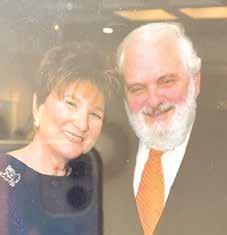
her former students, several of whom still keep up with her.
In 1985, Deena authored a textbook, coauthored by Ellen Morris Tiegerman, published by Merrill Publishing Company that was well received and even translated into Japanese and Chinese. Language and Communication Disorders in Children went through three printings and was the authoritative text on the subject for years.
Referring to highlights of her long, successful career, Deena mentions the fact that she had been honored in 1991 at the National American Speech, Language and Hearing Association. Several years later, she was invited to attend a conference in California in order to formally introduce the provost, Dr. Norma Rees, who had been her mentor at CUNY. Another highlight: Deena had been selected to be an external evaluator for the Council of Higher Education in Israel, evaluating all the graduate programs focusing on communications disorders. Among her favorite moments: at the graduations at Lehman College, Deena would walk down the aisle, garbed in the ceremonial robe with the mortarboard cap and tassel, strategically placed. That was always a thrill for her. Deena takes pride in the convivial atmosphere that permeated her department. Consisting of Hispanics, African Americans, as well as our own, acheinu, there was a spirit of friendship and harmony amongst all. Quite an accomplishment, especially given today’s atmosphere on our college campuses.
Deena retired approximately 10 years ago but still lives a full and mean-
ingful life. She keeps up with the latest literature in her field and remains up to date and well informed, able to be helpful to her former students who still consult with her today. A voracious reader, history books are a favorite of hers. For many years, Deena participated regularly in the Amen group meeting in Sutton Park, where she connected with friends and neighbors. Deena would take classes in the School of Continuing and Professional Studies at NYU, focusing on music appreciation and film history. This is certainly a very eclectic, well-rounded individual!
Speaking only Yiddish till she was five years old, Deena was later drawn to the pathos and passion of the Yiddish Theater. Today, the Yiddish Theater performs in the Museum of Jewish Heritage, located in downtown Manhattan. The plays are performed in Yiddish, with English subtitles being provided. Before Act I begins, the director will welcome the audience and share details of the plotline, so that all can easily follow the action. At the end of the play, a discussion is led, focusing on the themes of the play. Deena became a board member of the Yiddish The -
ater and eventually encouraged CUNY to host the Yiddish Theater troupe on campus! If you recall, speech and theater were originally grouped together, so this was a natural for Deena.
Deena and Josh enjoy traveling, creating their own itineraries, expanding their world as they explore our great, big
mighty, returned recently from Gaza. Their granddaughter is working in intelligence, out of the “kiryah” in Tel Aviv. Their son Chaim is a Maggid Shiur in Waterbury. He had always wanted to be active in the chinuch world and, together with his wife and children, is now living his dream. Deena and Josh have
“find what talks to you!” advises deena.
world. Visits to China and Russia were particularly monumental and thoroughly enjoyed.
“Find what talks to you!” advises Deena. As we get older, we must be proactive in filling our days. Remember, don’t just count the days; make the days count!
Deena and her husband Josh thankfully have much joy from their progeny. Their daughter, Ariella, lives with her family in Baka, Jerusalem. Their grandson, with many thanks to the Al-
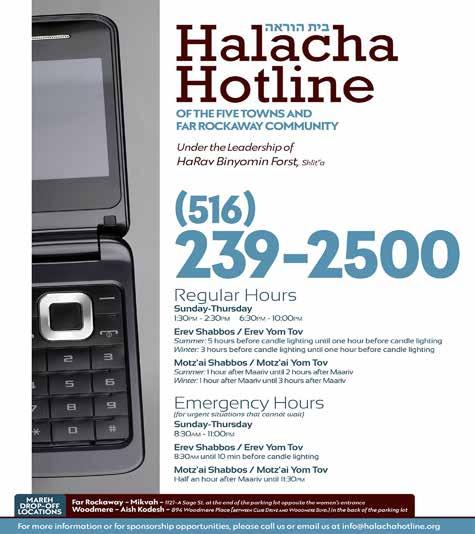
another son, Yaakov, who joined their family when he was 13 years old. Of Russian origin, his father had deserted his family and his mother had tragically died young.
Chaim shares the following: “I was in tenth grade in Yeshiva of Far Rockaway. Rabbi Brafman, our menahel, entered our classroom soon after Sukkos and shared with us the terribly sad news that a ninth grader was sitting shiva for his mother. As he had neither mother nor father, they were seeking a foster
home for him. I returned home that day and reported this to my parents. My parents contacted Rabbi Brafman and Rabbi Yaakov Bender to hear further details.”
With room in their huge hearts and in their lovely home, Chaim received a very special gift for Chanukah of that year: a new brother! And Yaakov was gifted with a nurturing, welcoming home. He is now, thank G-d, happily married with children, living in Phoenix, Arizona. Bravo to Deena and Josh for their generosity in welcoming this young boy to their home and raising him as one of their own.
Deena and Josh have lived in Lawrence in the same gracious home for over 50 years. What an exceedingly wise, accomplished, generous and jazzy woman we have with us! G-d bless you, dear Deena! May G-d bless you and your dear husband Josh with many healthy, happy years up ahead!
JWOW! is a community for midlife Jewish women which can be accessed at www.jewishwomanofwisdom.org for conversation, articles, Zoom events, and more.


By Naomi Nachman

I love the idea of a sheet-pan dinner. It’s easy to make, bake, and serve all on one pan, and it comes with a built-in side dish. You can use any kind of vegetable here as long as it’s cut thin for faster cooking. You can also swap out the chicken for salmon if you prefer a pareve option.
◦ 8 boneless, skinless chicken thighs (pargiyot)
◦ 1 cup potato starch
◦ 1 teaspoon salt
◦ Pepper, to taste
◦ 1 large red onion, chunked
◦ 8 ounces brown mushrooms, whole
◦ 1 zucchini, cut into 1-inch slices
Sauce
◦ ½ cup teriyaki sauce
◦ ¼ cup honey
◦ 4 cloves garlic, minced or 4 cubes frozen garlic
◦ 1 teaspoon kosher salt
◦ 2 tablespoons olive oil
1. Preheat oven to 400° Fahrenheit. Line a baking sheet with parchment paper and set aside.
2. Mix the potato starch, salt, and pepper in a bowl and dredge chicken pieces in the mixture. Place the chicken on the baking sheet and continue until all the chicken is coated. Place vegetables on top and around the chicken.
3. In a small bowl, mix sauce ingredients and pour over vegetables and chicken, making sure everything is well-coated.
4. Bake uncovered for 45-60 minutes, or until brown. Remove from oven and mix well. Serve and enjoy!
Naomi Nachman, the owner of The Aussie Gourmet, caters weekly and Shabbat/ Yom Tov meals for families and individuals within The Five Towns and neighboring communities, with a specialty in Pesach catering. Naomi is a contributing editor to this paper and also produces and hosts her own weekly radio show on the Nachum Segal Network stream called “A Table for Two with Naomi Nachman.” Naomi gives cooking presentations for organizations and private groups throughout the New York/New Jersey Metropolitan area. In addition, Naomi has been a guest host on the QVC TV network and has been featured in cookbooks, magazines as well as other media covering topics related to cuisine preparation and personal chefs. To obtain additional recipes, join The Aussie Gourmet on Facebook or visit Naomi’s blog. Naomi can be reached through her website, www.theaussiegourmet.com or at (516) 295-9669.

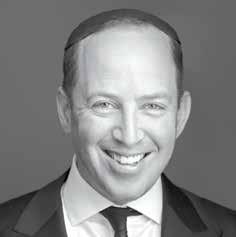
This column features business insights from a recent “Mind Your Business with Yitzchok Saftlas” radio show. The weekly “Mind Your Business” show – broadcasting since 2015 – features interviews with Fortune 500 executives, business leaders and marketing gurus. Prominent guests include John Sculley, former CEO of Apple and Pepsi; Dick Schulze, founder and Chairman Emeritus of Best Buy; and Beth Comstock, former Vice Chair of GE; among over 400+ senior-level executives and business celebrities. Yitzchok Saftlas, president of Bottom Line Marketing Group, hosts the weekly “Mind Your Business” show, which airs at 10pm every Sunday night on 710 WOR and throughout America on the iHeartRadio Network.
When I first started my business, I was the only one there full-time. I had some people that I would hire to work per diem for me. If we had a trip, they’d come in and they’d get paid. But I eventually recognized that I needed help. So, I hired a Director of Development, a Chief Flight Coordinator, and a CFO to come work in the company. That freed me up enough to enable me to go out and expand the business. Any person who’s looking to grow their company has to build a team. You need to have the resources behind you. Sometimes it’s very difficult, because when you’re a CEO or you’re an entrepreneur who’s just starting off, every dollar means so much to you. But this is money you need to spend. You really need to spend money to make money. It can be hard. That’s why it’s also helpful to get yourself a business coach, someone you can
directly ask, “Am I making the right decision?” If there are things that I’m doing right now that an assistant can do for me for $25-$30 an hour, it would be silly not to hire them. If you’re trying to grow your business while also making catering orders or booking car services, then you’re digging yourself into a hole that you might not be able to get out of. If you have a great executive assistant, a great right hand, or a great Director of Development, somebody who could work alongside you, you should be able to double, triple, or even quadruple your business.
H I re for e xper I ence
When building your team, it’s really important that you take your time in the hiring process to find the best people available. I can’t tell you how many resumes we go through before we find the perfect hire. That’s what it takes to
Since 2015, Yitzchok Saftlas has been speaking with leading industry experts on the “Mind Your Business” show, sharing insightful business and marketing strategies.
On a recent addition of the “Mind Your Business” show, Yitzchok Saftlas sat down with Sim Shain, founder and CEO of ParaFlight Aviation and UrgentFlights.com.
Read on for the top 5 highlights in which Sim discusses his thoughts on teambuilding, investing in yourself, and pursuing your passion.
find someone with the right set of skills and experience. I’ve been working in the aviation business for over 10 years, but I actually have the least amount of actual experience of anybody on my team. When it comes to such a complicated and fast-moving business, I don’t hire anybody with less than 10 years in the industry. We have a commercial pilot who has been working in the industry for at least 20 years. Our Chief Flight Coordinator has been in the business for over 30 years. You have to recognize when starting a business, in any industry, that there is so much to learn, and it takes a while. That’s why it’s so valuable to hire people who can fill in that experience you may lack. Even our Chief Flight Coordinator, with over 30 years of aviation experience, didn’t have a tremendous amount of experience in the organ transplant side of our business. That’s the value of having a team with a cumulative wide range of experience. We are able to train and teach each other, so that we can keep up in an industry
where everything has to happen very, very quickly.
The one thing that no one can ever take away from you is what you invest in yourself. Even if somebody goes from one job to another, or one industry to another, the skill set that they develop is something that no one can ever take away. And that creates a tremendous sense of value. Warren Buffett, who was a tremendous mentor to many people, said that the one diploma he keeps up on his wall is his Dale Carnegie diploma for public speaking. A public speaking course is really one of the most powerful ways you can invest in yourself. Years ago, I would have never had the confidence to do this interview. At my son’s bar mitzvah, I was terrified to speak. I actually had to hire a speechwriter, drink quite a bit, and just read the speech right off the sheet. I said to myself, “This is terrible. How am I going to run a business if I
Any person who’s looking to grow their company has to build a team.
can’t get up there and speak?” So, I took a public speaking course, and it provided me with the tools I needed to succeed. Since finishing my course, I’ve spoken in front of schools, at dinners, at conventions, at seminars – you name it. As long as they give me the time to prepare, I can do it. I still have to push myself out of my comfort zone and it’s not always easy, but I prepare and I understand that I want to try to share my message.
This doesn’t only apply to public speaking. It’s all about learning. I also learned Excel and another language. Anything you want to do, you can build your skill set. We need to invest in ourselves, because when we invest in ourselves, we end up investing in others as well by making our team even stronger.
tA ke cA re of Your cl I ents
Take care of your clients, and your clients
will take care of you. Clients appreciate transparency and honesty. They say that the best lie is the truth. There are many challenges that arise in every industry and business. Sometimes there are hiccups, certainly in the aviation industry, whether it’s a delay, bad weather, or mechanical issues. Some things are in our control, but most things are not in our control. But when you’re straight up with your clients, put all your cards down on the table, and show them, “Hi, we’re here for you. We’re here to support you,” that will be the thing that sticks with them. That’s the most important thing. It’s not always about price. In fact, I think that most of the time it’s not about price. Clients just want to know that you’re committed to them. They want to know that you’re loyal to them. This goes for both clients and vendors. We thank every single person involved after a trip. Every time an invoice goes out to a client, there’s a note saying, “Thank you for allowing us to provide services to you.” When we’re sending very large wires to our vendors,

we say, “Thank you so much for taking the trip, because we recognize that we need every single part of the business to work seamlessly in order for everybody to be able to work together.”‘
Don’t chase money. Yes, we all need money in order to survive, but that shouldn’t be the end goal of our pursuits. Chase your dream. Chase your passion. Find a purpose or an industry that means something special to you. I think that if you do that, and you become the absolute best in your industry, learn everything about your business, you will become an expert. I think what makes somebody an expert is if they are someone who not only believes in their craft but hones their craft. They know everything about it. So much so that when you speak to them, you’re like, “Wow, they are truly an expert.” There’s no expert course that you can
take, but if you hone your craft, and you believe in yourself, and you’re prepared to go in and share your message with others, then people will believe in you and you’ll be able to continue to pursue that passion. That’s what I try to do. I invest in myself, I believe in myself, and I share my message with others.



The stories I could tell. Not the type of character you want making decisions about your future.
- Jeff Walz posting on Facebook about his estranged brother Tim Walz, who is Kamala Harris’s running mate
Haven’t spoke to him in 8 years. I’m 100% opposed to all his ideology.
- Ibid.

Hersh Goldberg-Polin, Carmel Gat, Eden Yerushalmi, Alexander Lobanov, Almog Sarusi, and Ori Danino. This ongoing grief and outrage was brutally sown on 10/7. Hamas owns this entire humanitarian catastrophe and my support for Israel is unbreakable.
– Tweet by Sen. John Fetterman (D-PA)
We would have had a lot of time to study the jet completely in peacetime, but we do not have the time.
- Oleksiy “Moonfish” Mes, one of only a few Ukrainian pilots trained to fly U.S.-made F-16 fighter jets, several weeks before he was killed when his jet crashed on Monday
Americans have long assumed that the Constitution could save us; a growing chorus now wonders whether we need to be saved from it.
- Canadian-born writer Jennifer Szalai’s in a New York Times oped
Trump owes his political ascent to the Constitution, making him a beneficiary of a document that is essentially antidemocratic and, in this day and age, increasingly dysfunctional.
- Ibid.
I don’t think that Vice President Harris is a worthy president of this country. I think we need to have a president who can give an interview, who can articulate a vision, who can put together an English.
- Robert F. Kenned, Jr. in an interview with Chris Cuomo
Foo Fighter’s so dumb they forgot they don’t own their songs.
- One of many tweets making fun of the Foo Fighters who made a big stink about Trump illegally using one of their songs which he actually purchased a license to use from BMI’s Songview service which owns the song

[Kamala] also said, “I worked at McDonald’s.”
Turned out she didn’t work at McDonald’s. Did anyone see that? After an exhaustive study that took about 20 minutes, they found out she never worked there.
- Trump at a campaign event
Nobody on the Left is unhappy that she’s suddenly running away from her positions because they know she’s lying.
- Sen. Ted Cruz (R-TX) explaining why Kamala Harris is getting away with all of her flip-flopping
Enough with the games… If Kamala Harris isn’t smart enough to repeat the messaging points her handlers want her to memorize, that’s their problem.
- Jason Miller, senior advisor to Trump, responding to the Harris campaign’s efforts to change the rules for the upcoming debate
They won’t allow Harris to do interviews, they won’t allow her to do press conferences, and now they want to give her a cheat-sheet for the debate. My guess is that they’re looking for a way to get out of any debate with President Trump. Regardless, there’s no way Harris is ready to be commander-in-chief.
- Ibid.
Hamakom yenachem eschem. The Place will Comfort you.
In moments of unspeakable grief, the earth –our very center of gravity – shifts. What once was solid ground opens beneath us and all that felt sure and real now becomes a great void. At this time, we turn to the Light which is unshakable and constant, the Place, the Omnipresent Space, that holds firm, anchoring us to a reality that is steady, eternal and unbroken.
We are hurt and we are suffering, but we will never be broken. Am Yisroel Chai.
- Post by Jerry Seinfeld’s wife Jessica, after the six hostages Hy”d were killed

It was open. She wrapped it up.
- Rep Nancy Pelosi (D-CA) when asked by Bill Maher if it would have made sense to have an open convention rather than just anoint Kamala Harris
I will never forget my meeting last October with the parents of Hersh Goldberg-Polin and other hostage families. Today’s tragic news is a devastating reminder of the need for the unconditional release of all hostages and an end to the nightmare of war in Gaza.
- Statement by Israel hating U.N. Secretary General António Guterres which fails to condemn or even mention Hamas that brutally murdered the six hostages

I am honest. And I say, it is not that Hersh was perfect. But he was the perfect son for me. And I am so grateful to G-d, and I want to do hakarat hatov and thank G-d right now, for giving me this magnificent present of my Hersh…. For 23 years I was privileged to have this most stunning treasure, to be Hersh’s Mama. I’ll take it and say thank you. I just wish it had been for longer.
– From Rachel Goldberg-Polin’s eulogy for her son Hersh Hy”d
President Biden’s Secretary of Commerce Gina Raimondo on ABC News after a report came out that the government inflated the job creation numbers by more than 800,000 over the past year:
Reporter: I am curious as to your thoughts on today the Bureau of Labor saying that more than 800,000 fewer jobs were actually created than initially reported.
Raimondo: First of all, I don’t believe it because I’ve never heard Donald Trump say anything truthful.
Reporter: It is from the Bureau of Labor.
Raimondo: I’m not familiar with that.
Are you questioning the results of a free and fair election, Mark?
- One X user’s response to Mark Cuban complaining about the results of his own poll in which 69% of the over 800,000 respondents said that they would prefer that their child turn out like Trump than Harris, much to the chagrin of Cuban who is a vocal Harris supporter
She’s so fake that she faked trying to be fake and even that looks fake.
- Tweet about Kamala Harris’s bad attempt to avoid questions by making believe that she was talking on the phone as she passed them

Kamala is being accused of using a fake accent after giving a speech in Detroit. You have to give Kamala credit for versatility – she uses a black accent in Detroit and an Indian one when talking to tech support.
- Greg Gutfeld, Fox
This fall Chris Christie will teach a class in Yale about how to run a political campaign. He will discuss everything he has ever done and say, “Don’t do that!”
- Ibid.
Since when does the vice president have what sounds like a Southern accent?
- Fox News’ Peter Doocy to White House press secretary Karine Jean-Pierre after Kamala Harris went viral for putting on a completely fake accent while speaking at a campaign rally
Is that how she talks in meetings here?
- Ibid, when Jean-Pierre made believe that she didn’t know what Doocy was talking about


The Democrats are coming out of their Chicago convention brimming with confidence. But to win in November, Kamala Harris will have to defy history – because only once in the last 188 years has a sitting vice president been elected president of the United States.
Many vice presidents have gone on to become president. Some, like Joe Biden, ran after leaving office. Others, like Theodore Roosevelt, Calvin Coolidge, Harry S. Truman, Lyndon B. Johnson and Gerald Ford, assumed the presidency because of the death or resignation of the incumbent, and then ran for a full term on their own. Still others, including Al Gore and Richard M. Nixon, tried and failed to succeed popular two-term presidents. (Nixon ran again eight years later and won.)
The only sitting vice president to win the nation’s highest office in the modern era was George H.W. Bush in 1988 – and he was the first to do it since Vice President Martin Van Buren, the “Little Magician,” was elected president in 1836. Harris will need some magic of her own to pull off the same feat. Bush succeeded where other modern vice presidents failed for one simple reason: Americans wanted a third Reagan term. Today, no one wants another Biden term. (If voters did, then Biden, and not Harris, would still be the Democratic nominee.) Ronald Reagan left office with a 63 percent approval rating. Today, Biden has 57 percent disapproval.
When Bush ran in 1988, it was still “Morning in America.” The economy was growing, and inflation was finally under control. Well, it’s not Morning in America today. Americans are still struggling under the weight of the historic inflation that Biden-Harris unleashed, as well as skyrocketing interest rates. Six in 10 are racking up record credit card debt just to
By Marc A. Thiessen

pay for groceries and other necessities.
In 1988, the world was at peace. Russian troops were withdrawing from Afghanistan, the Berlin Wall was soon to fall, and the Soviet Union would peacefully collapse not long after. Today, the world is on fire, with wars raging on two continents and Iranian-backed proxies attacking U.S. troops with impunity in Iraq, Syria and the Red Sea.
The closer historical analogy to Harris’s bid is not 1988 but 1968, when Vice President Hubert Humphrey ran to succeed the deeply unpopular Johnson amid crushing inflation, global turmoil and antiwar protests. The difference between then and now is that Biden is almost 10 points less popular today than LBJ was in 1968, when voters rejected Humphrey as his successor.
Democrats are hoping that voters were concerned with Biden’s mental fitness rather than his unpopular policies and that forcing him off the ballot will have solved their problems. The catch: Harris was the co-architect of those policies.
The vice president was clearly hoping that the anti-Israel movement on the left would not hold the Biden policies they dislike against her. Those hopes were dashed by the protesters in Chicago, who transitioned seamlessly from chants of “Genocide Joe” to “Killer Kamala.” For better or worse, Harris owns the administration’s national security policies.
The same is true for the border. Harris is bending over backward to deny that she was ever the administration’s “border czar” – which is an admission that Biden’s border policy is an unmitigated disaster. If it were a success, she’d be wearing the “border czar” title as a badge of honor. If she wants to distinguish herself from the border failure, she has to explain what she would have done differently. And the truth is, her border policies are in fact more radical than Biden’s. In 2019, she promised to decriminalize illegal border crossings and provide taxpayer-funded health care for illegal migrants, which would have created an even more power-
ful incentive for illegal entry.
On the economy, 60 percent of Americans say Harris should make major changes or take a different approach from Biden’s. But, as president of the Senate, she cast the deciding vote for all the profligate spending bills that unleashed the worst inflation in four decades. And in her first economic policy speech, she proposed $2 trillion in new spending, along with socialist price controls that would lead to scarcity and cause prices to skyrocket even further. So, Harris is trying something no sitting vice president has ever attempted: running as an insurgent and treating Donald Trump as the incumbent. In her telling, she is the fresh new face on the political scene, while Trump is the one running for reelection. She is asking voters to forget that she co-presided over an unprecedented panoply of disasters over the last four years and is now campaigning on a message of denying Trump another term.
This is absurd. Democrats have been in power for the past 3½ years and have held the White House for 12 of the past 16 years. But, so far, that strategy is working.
A new Post-ABC News-Ipsos poll finds that 64 percent say Harris had only some or very little influence on Biden’s economic policies, while 57 percent say she had only some or very little influence on his border policies.
Trump needs to make clear that Harris not only helped craft those Biden catastrophes, but also she plans to double down on the administration’s failures – and that a Harris presidency would be a second Biden term. Because history shows that when a sitting vice president runs to succeed a sitting president, the election is a referendum on the current commander in chief.


Supreme Court Justice Neil M. Gorsuch’s new book, which slays a cliché, should disturb prudent citizens. His readers will never again say ignorance of the law is no excuse for breaking it. If prosecutors had the inclination, most Americans could be convicted of felonies.
In “Over Ruled: The Human Toll of Too Much Law,” Gorsuch, with his co-author, Janie Nitze, notes that the Roman emperor Caligula posted new laws on columns so high, and written in a hand so small, that people could not read them and hence lived in dread of committing criminal infractions. Gorsuch is too judicious to say so, but an ideological tendency is primarily responsible for the resemblance between Caligula’s Rome and this Republic. That tendency is progressivism.
Less than a century ago, Gorsuch notes, a single volume contained all federal statutes. By 2018, they filled 54 volumes — about 60,000 pages. In the past 10 years, Congress has enacted about 2 million to 3 million words of law each year. The average length of a bill is nine times what it was in the 1950s. Agencies publish their proposals and final rules in the Federal Register, which began at 16 pages in 1936, and now expands by an average of more than 70,000 pages annually. By 2021, the Code of Federal Regulations filled about 200 volumes. And in a recent 10-year span, federal agencies churned out approximately 13,000 guidance documents.
Ignorance of the law is no excuse? It is inevitable. Recently, Congress has added an average of 56 new federal crimes every year. Some scholars say — no one really knows — there are more than 5,000 federal statutory crimes. And at least 300,000 federal agency regulations — none written by Congress — carry criminal sanctions.
Of the many illustrative episodes Gorsuch recounts, even the ludicrous are sinister. After a children’s show at a Missouri library, a magician was accosted by a U.S.
By George F. Will

Agriculture Department official who demanded, “Show me your license.” For what? For using a three-pound bunny in his act. Decades ago, Congress had passed a law requiring dealers of certain animals for research to have federal licenses, then
bureaucrat said his travel cage needed a sticker pointing up to indicate how to carry it. The magician said perhaps the handle on top sufficed. No, the bureaucrat said, and the government sent him 200 stickers pointing up.
As a result, Gorsuch says, a legal scholar estimates that “70% of adult Americans today have committed an imprisonable offense — many, maybe most, without even knowing it.”
amended the law to require licenses for animal “exhibitors,” such as “carnivals, circuses, and zoos.”
The magician’s license imposed obligations: surprise inspections of his home, the requirement to notify the government of his out-of-town itineraries, and contingency plans for hypothetical disasters that might endanger his bunny. A federal
In October 2003, pistol-packing federal agents dressed in black body armor poured from three pickup trucks to place a 67-year-old Georgia man in handcuffs and leg shackles for the alleged crime of importing orchids without proper documentation. Criminal law no longer enforces, in Gorsuch’s words, “a relatively small number of pretty intuitive and
widely accepted norms.”
Increasingly, it expresses progressivism’s incontinent itch to boss people around and a nasty thirst to punish deviations from ever-more-minute strictures promulgated by experts whose expertise supposedly encompasses how everyone else should live. As a result, Gorsuch says, a legal scholar estimates that “70% of adult Americans today have committed an imprisonable offense — many, maybe most, without even knowing it.”
Such conformity-enforcing progressivism encourages vindictive meanness. Until a unanimous Supreme Court swatted it down, Philadelphia, displeased with Catholic Social Services’ refusal to place children in foster care in unconventional families, blocked children reentering foster care from reuniting with siblings who were with CSS families.
Progressives think progress depends upon (that is, they sometimes define progress as) the concentration of power as high as possible in government’s regulatory apparatus. Hence, between 1960 and 2019, the 900% increase in federal grants to states — from $70 billion (adjusted for inflation) to $700 billion — came with strings, resembling chains, attached.
James Madison foresaw our current condition, in which laws are “so voluminous that they cannot be read, or so incoherent that they cannot be understood” and “undergo such incessant changes that no man, who knows what the law is today, can guess what it will be tomorrow.” Hence, Madison’s paradox: The multiplication of laws undermines the rule of law. “Law is defined to be a rule of action; but how can that be a rule, which is little known, and less fixed?”
What we have become is unbecoming of a free people. Caligula’s ghost is grinning.
By Bret Stephens
Of all the world’s injustices, perhaps the saddest is that so many of them are simply ignored.
Protesters the world over loudly demand a cease-fire in the Gaza Strip; a dwindling number of people still take note of Russian atrocities against Ukraine. Otherwise, there’s a vast blanket of silence, under which some of the world’s worst abusers proceed largely unnoticed and unhindered.
Let’s try to change that. For this week’s column, here are some alternative focal points for outrage and protest, particularly for morally energetic college students from Columbia to Berkeley. Venezuela. Last month’s election was stolen in broad daylight by the socialist regime of Nicolás Maduro. He has enforced this theft by using his security services to round up and jail around 2,000 people suspected of dissent, promising “maximum punishment” and “no forgiveness.” This is from a regime that has already caused starvation and the desperate exodus of millions of poor Venezuelans. As of last year, more than 10,000 of them were living in New York City shelters.
If ever there was a case of “Think globally, act locally” to adopt the old slogan, this is it. Especially since the usual forces of social protest have something to atone for when it comes to Venezuela: The regime that Maduro inherited in 2013 from Hugo Chávez, his authoritarian mentor, had no bigger cheerleaders in the West than left-wing magazines like The Nation and political leaders like Jeremy Corbyn of Britain. Contrition is a virtue: Now would be a good time for these (hopefully former) comrades to show it.
Turkey. Anti-Israel protesters sometimes respond to the criticism that they are singling out the Jewish state for unfair censure by noting that it receives billions in military aid from Washington. (This pretext doesn’t fly if protests are

in Montreal or Melbourne, Australia.)
But what about another Middle Eastern recipient of U.S. largesse, including the stationing of U.S. troops and nuclear weapons?
That country is Turkey, on paper a secular democracy and a NATO ally. In reality, it’s an illiberal state run for decades by Recep Tayyip Erdogan, an antisemitic Islamist who has jailed scores of journalists while waging — sometimes with F-16 warplanes — a brutal war against his Kurdish opponents in Syria and Iraq. For good measure, Turkey has occupied, ethnically cleansed and colonized northern Cyprus for 50 years. Shouldn’t those who argue that occupation is always wrong trouble themselves to protest this one?
Ethiopia and Sudan. Critics of U.S. foreign policy, particularly on the left, often complain that Washington cares more about suffering among white people than Black people. They have a point. So why do those same critics proceed to largely neglect the staggering human rights abuses taking place now
in Sudan and Ethiopia?
In Sudan’s case, the humanitarian group Operation Broken Silence estimates that at least 65,000 people have died of violence or starvation since fighting broke out last year, and nearly 11 million people have been turned into refugees. In Ethiopia, Prime Minister Abiy Ahmed — possibly history’s least deserving recipient of a Nobel Peace Prize — first turned his guns on ethnic Tigrayans in one of the world’s bloodiest recent wars, with a death toll estimated as high as 600,000. Now the government is waging war against former allies in the Amhara region, even as the Biden administration last year lifted restrictions on aid owing to its abuse of human rights. How many college protests has this elicited?
Iran. The regime in Iran ought to tick every box of progressive outrage. Misogyny? As CNN documented in 2022, the government responded to mass protests against mandatory hijab by systematically assaulting protesters, men as well as women.
Then there is Tehran’s imperialism. The regime doesn’t merely make a habit of taking unlucky visitors hostage. It takes entire countries hostage, too, none more tragically than Lebanon. Hezbollah, which parades as a Lebanese political movement, is little more than a subsidiary of Iran. The group has turned the south of the country into a free-fire zone while putting thousands of civilian lives at risk for the sake of its ideological aims against Israel. When Lebanese patriots such as the late Prime Minister Rafik Hariri try to stand in Hezbollah’s way, they tend to wind up dead.
It says something about the moral priorities of much of today’s global left that Iran is one Middle Eastern regime toward which they’ve advocated better relations, including the lifting of economic sanctions, while simultaneously insisting on boycott, divestment and sanctions against Israel. Why that is — the mental pathways that lead self-declared champions of human rights to make common cause with some of the worst regimes on Earth while directing their moral fury at countries, including Israel, that protect the values those champions pretend to hold dear — has been one of humanity’s great puzzles for over a century.
But that puzzle shouldn’t restrain morally minded, globally conscious people from standing up for the oppressed and suffering everywhere they might be. The list I’ve offered above is very partial: There are also Rohingya in Myanmar, Uyghurs in China, Christians in Nigeria and ethnic minorities in Russia, to name a few. They, too, deserve the world’s attention, compassion and, whenever possible, active assistance.
It could happen if only one cause weren’t consuming so much of the world’s moral energies.
© The New York Times
By Adam Goldman, Ronen Bergman and Natan Odenheimer
TEL AVIV, Israel — Hamas’ handbook for underground combat describes, in meticulous detail, how to navigate in darkness, move stealthily beneath the Gaza Strip and fire automatic weapons in confined spaces for maximum lethality.
Battlefield commanders were even instructed to time, down to the second, how long it took their fighters to move between various points underground.
The 2019 manual, which was seized by Israeli forces and reviewed by The New York Times, was part of a yearslong effort by Hamas, well before its Oct. 7 attack and current war with Israel, to build an underground military operation that could withstand prolonged attacks and slow down Israeli ground forces inside the darkened tunnels.
Just a year before attacking Israel, Yahya Sinwar, the leader of Hamas in the Gaza Strip, approved spending $225,000 to install blast doors to protect the militia’s tunnel network from airstrikes and ground assaults.
The approval document said Hamas brigade commanders had reviewed the tunnels below Gaza and identified critical places underground and at the surface that needed fortification.
The records, along with interviews with experts and Israeli commanders, help explain why, nearly a year into the war, Israel has struggled to achieve its objective of dismantling Hamas.
Israeli officials spent years searching for and dismantling tunnels that Hamas could use to sneak into Israel to launch an attack. But assessing the underground network inside Gaza was not a priority, a senior Israeli official said, because an invasion and full-scale war there seemed unlikely.
All the while, officials now realize, Hamas was girding for just such a confrontation.
Were it not for the tunnels, experts say, Hamas would have stood little chance

against the far superior Israeli military.
The underground-combat manual contains instructions on how to camouflage tunnel entrances, locate them with compasses or GPS, enter quickly and move efficiently.
“While moving in the dark inside the tunnel, the fighter needs night-vision goggles equipped with infrared,” the document, written in Arabic, reads. Weapons should be set to automatic and fired from the shoulder. “This type of shooting is effective because the tunnel is narrow, so the shots are aimed at the kill zones in the upper part of the human body.”
Israeli officials knew before the war that Hamas had an extensive tunnel network, but it has proved to be more sophisticated and extensive than they realized. Early in the war, they estimated that it stretched for about 250 miles. Now they believe it is up to twice as long.
And they continue to discover new tunnels. Just last week, Israeli commandos rescued a Bedouin Arab citizen of Israel who was found alone in an underground warren. The government said Sunday that six hostages had been found
dead in another tunnel.
Sinwar, Israel’s highest-value target, has been suspected of managing the war and evading capture from a tunnel.
The records show how both sides have had to adapt their tactics in the war. Just as Israel underestimated the tunnels, Hamas prepared for subterranean battles that have not materialized. Israel was reluctant, especially early in the war, to send troops underground where they might face combat. Hamas has primarily ambushed soldiers near tunnel entrances, while avoiding direct confrontations.
That has left Hamas to use the tunnels to launch aboveground hit-and-run attacks, hide from Israeli forces and detonate explosives using remote triggers and hidden cameras, according to Israeli military officials and a review of battlefield photos and videos.
These maneuvers have slowed Israel’s assault, but its military has still decimated Hamas’ ranks, routed them from strongholds and forced them to abandon huge swaths of the tunnel network that they invested so heavily to build.
Members of the Israeli military dis-
covered the tunnel warfare document in Gaza City’s Zeitoun district in November, officials said. A letter from Sinwar to a military commander was found that same month south of the city. The documents were made available to the Times by Israeli military officials.
A military spokesperson said that “the fact that Hamas is hiding in tunnels and managing much of the fighting from there prolongs the war.” A senior Hamas official declined to comment on the tunnel strategy.
The markings on the documents are consistent with other Hamas materials that have been made public or been examined by the Times. And Israeli soldiers have described details, such as camouflaged tunnel entrances and recently installed blast doors, that are consistent with the Hamas documents. The documents also describe the use of gas detectors and night-vision goggles, equipment that Israeli forces have found inside tunnels.
“Hamas’ combat strategy is based on underground tactics,” said Tamir Hayman, a former head of Israel’s military intelligence. “This is one of the primary reasons they have managed to withstand the IDF thus far,” he continued, using an abbreviation for the Israeli military.
Since the war started, much has been revealed about the subterranean network, which has been called the “Gaza Metro.” Hamas uses some rudimentary tunnels simply to mount attacks. The fighting manual describes how people should maneuver these narrow passages in darkness: with one hand on the wall and the other on the fighter in front.
Other tunnels are sophisticated command-and-control centers or arteries connecting underground weapons factories to storage facilities — concealing Hamas’ entire military infrastructure. In some cases, Hamas has used solar panels installed on the roofs of private homes to provide power underground.
Some tunnels also serve as communi-
cation hubs. This past winter, Israeli forces discovered a Nokia telecommunications system underneath the headquarters of the U.N. agency for Palestinian refugees.
Such Nokia systems provide voice and data services, according to the manual obtained by the Times, and could have functioned as a switchboard for an underground communication network. But the features require additional hardware, and it is not clear what abilities Hamas had.
Hamas has been known to hold Israeli hostages underground, so every tunnel needs to be investigated and cleared, Israeli officials say.
Destroying a tunnel section can take dozens of soldiers about 10 hours, according to a senior Israeli officer who is an expert on tunnel warfare. Last year, the Israeli army discovered a tunnel that had a depth of 250 feet — about the height of a 25-story building. The army said it took months to destroy it.
“I cannot overstate that in any way. The tunnels impact the pace of the operations,” said Daphné Richemond-Barak, a tunnel warfare expert at Reichman University in Israel. “You can’t advance. You can’t secure the terrain.”
“You’re dealing with two wars,” she added. “One on the surface and one on
the subsurface.”
One Israeli special operations officer, who, like others, spoke on the condition of anonymity because they were not authorized to publicly discuss military activities, said that as soldiers approached the tunnels, Hamas sometimes blasted the ceilings, causing cave-ins that would
plosives per kilometer.
The Israeli military estimates that it costs Hamas about $300,000 to build roughly a half-mile-long rudimentary tunnel. Richemond-Barak said that the letter from Sinwar highlighted the expense and sophistication behind the effort.
The letter was written to Mohammed
Last year, the Israeli army discovered a tunnel that had a depth of 250 feet — about the height of a 25-story building.
block the path.
An Israeli military official said it could take years to destroy the entire tunnel network.
Israel’s military leadership has made the tunnels its main target. But the campaign has come at a steep cost for Palestinian civilians. Many of the tunnels snake beneath densely occupied areas. Israel has publicized videos of the military destroying tunnels with more than 16 tons of ex-

Deif, the group’s military commander, who is believed to have been an architect of the Oct. 7 attack. It is not clear when Hamas completed its review of tunnel fortifications or whether it was done in connection to the attack planning. Sinwar wrote that “the brigades will be given the money according to the level of importance and necessity.”
The letter could indicate where the group anticipated the toughest fighting.
Sinwar authorized the most money for doors in northern Gaza and Khan Younis. Indeed, some of the heaviest fighting during the war has taken place in those areas.
“The Hamas tunnel system was an essential, if not existential element of their original battle plan,” said Ralph F. Goff, a former senior CIA official who served in the Middle East.
It is not clear when Hamas started using the doors, but Richemond-Barak said the group’s heavy reliance on them was new. She was not aware of Hamas using them during a 2014 war with Israel.
Blast doors seal tunnel segments from each other and from the outside, protecting against bombings and breaches. They also hamper the army’s use of drones to inspect and map tunnels.
The Israeli military has repeatedly encountered blast doors as they cleared tunnels. Despite the tactics described in the tunnel-fighting manual, once those doors have been breached, Israeli officials say, soldiers seldom find Hamas fighters behind them. They have fled, reflecting an attack-and-retreat strategy that has become commonplace.
© The New York Times

By Avi Heiligman


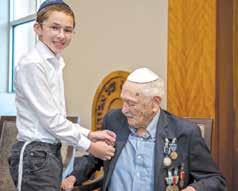
The list of Jewish veterans that have been decorated for actions on and off the battlefield is quite extensive. Books, newspapers and documents are just some of the places where their stories are told. Oral histories and documentaries show another angle to their incredible feats while fighting for freedom. Nevertheless, many of their stories are still quite unknown to the public, and here we are going to highlight a few more of these Jewish Forgotten Heroes.
Only bits and pieces of the army career for Samuel A. Dorshow are readily available. He was a highly decorated army veteran from St. Paul, Minnesota. The day after Pearl Harbor he tried enlisting with the Marines, but they rejected him because he was “too old” at the age of 33. The army took him and made him a forward observer for the 324th Artillery Battalion. Dorshow received three Purple Hearts for wounds while in action but survived despite engaging in one of the most hazardous jobs in the army. It was the job of the observer to get to the highest location to scout out the area, and by doing so, it made him a target for enemy gunmen. He came ashore on Omaha Beach in Normandy and received the first of his purple Hearts for being wounded in the leg. He received three Silver Stars medals for actions in combat, including one for knocking out a machine gun emplacement.
On December 14, 1944, in France, Dorshow moved to a third story observation post that was 75 yards ahead of the American front lines. German soldiers
saw him, but despite heavy gunfire, mortar rounds and artillery shells, Dorshow remained in his exposed location to direct American fire on enemy positions. At one point, a German shell fell on the building, and Dorshow tumbled all the way to the ground. Despite being hurt quite badly, he managed to lead his men 14 miles back to friendly lines. For his dedication to duty despite the hazardous situation, he was awarded the Silver Star for his actions that day. While fighting near the Hurtgen Forest in Germany, he was given a battlefield
him the long overdue medals. In 2022, a ceremony was held at a Chabad center in San Antonio, Texas, and Teldon received the Air Medal, the American Campaign Medal, the European-African-Middle Eastern Campaign Medal, the World War II Victory Medal and National Defense Service Medal. Additionally, he accepted a Distinguished Unit Citation. Members of his family as well as military officers and chaplains were on hand for the ceremony and presented the medals to the 98-yearold veteran.
That general was George Patton who said, “I wish I could do more for you, son.”
commission by a general. That general was George Patton who said, “I wish I could do more for you, son.”
Lieutenant Gerald Teldon was born in the Bronx and joined the Army Air Corps during World War II. Starting in 1944, he flew P-47 Thunderbolts for squadrons in the Twelfth Air Force. His first mission was to destroy ground targets, and he took out a train. Altogether, he flew 62 missions during the war and flew over Italy and the Balkans. For some reason,n he never received the medals that he earned during his time in combat. His family reached out to the military, and they agreed to award
American marines fought some of the most brutal battles in the most unforgiving of battlefield environments. Iwo Jima is a volcanic island measuring just 8 square miles that could mostly be viewed by the Japanese-occupied Mount Suribachi on the southwest tip. The Japanese fortified the island with pillboxes and gun positions as well as an extensive network of caves and tunnels. It was on this battlefield that Lieutenant J. Gene Hochfelder earned his Silver Star.
Hochfelder was born in New York City and grew up in Lawrence, NY, before joining the Marines in 1942. He first went
through boot camp at Parris Island and then became an officer after going through OCS. Hochfelder also went through parachute training before being assigned as an officer for the 3rd Marine Division stationed at Bougainville. Then he joined the 26th Battalion, 5th Marine Division in Hawaii and was sent overseas again for a second tour of duty. This time, the destination was Iwo Jima. He was just one of two officers in his battalion to survive Iwo Jima without being killed or wounded.
On February 22, 1945, Japanese forces surrounded Hochfelder’s unit on Iwo Jima and were infiltrating the battalion’s rear positions. Hochfelder quickly organized a defense force in an attempt to repel the Japanese. The defense was successful as he killed two enemy soldiers and cornered the rest into a pit. The next day, the rest of the enemy troops were wiped out. For his actions in combat, Hochfelder was awarded the Silver Star, the Bronze Star and the Presidential Unit Citation. Additionally, he assisted the Jewish chaplain that was assigned to the division.
These three servicemen are just the tip of the iceberg of the stories of the many Forgotten Heroes from history. It is history that is rarely told, as their bravery, dedication and sacrifice was an integral part in the war effort.
Avi Heiligman is a weekly contributor to The Jewish Home. He welcomes your comments and suggestions for future columns and can be reached at aviheiligman@gmail.com.
classifieds@fivetownsjewishhome.com • text 443-929-4003
MAJOR APPLIANCE REPAIR
Servicing Washers , Dryers , Refrigerators , Dishwasher, stoves
All work guaranteed. Call 718 3762288
VACUUM SALES AND REPAIR
All areas call Max Flam 718-444-4904
THE LEATHER SHOPPE
The spot for all your custom leather Judaica. Tallis/tefillin bags, lulav and esrog bags, havdallah sets, challah covers, shtenders, pesach sets, matzah/afikomen bags. WhatsApp: (732) 523-0007 or email: theleathershoppe732@gmail.com for a full catalog. We ship.
MY MOTTO IS DON’T WAIT TO buy real estate
Buy real estate and wait
Your realtor for life 516-784-0856 Alexandra at Realty Connect USA
PEACEFUL PRESENCE STUDIO
Men’s private yoga, Licensed Massage & Holistic Health Guidance 436 Central Ave, Cedarhurst Info. & free video training www.peacefulpresence.com 516-371-3715
READING SPECIALIST
Trained in Orton Gillingham and many multisensory reading programs. Specializes in dyslexia and auditory processing disorder and other reading difficulties.
Rhess.education@gmail.com
Call or Text (516) 220-2059
GERBER MOVING
FULL SERVICE MOVING
Packing Moving Supplies
Local Long Distance. Licensed Insured
1000’S Of Happy Customers
Call Shalom 347-276-7422
HANDYMAN AVAILABLE
For big or small jobs, Sheetrock, carpentry, painting, electrical, plumbing, install & repair appliances Call Ephraim at 347-593-4691
MANAGEMENT STAFF WILL ASSIST you with: * Obtaining Medicaid and Pooled Income Trust
* In-home Assessments, Individual and Family Counseling
* Securing reliable home care assistance
* Case and Care Management services
Dr. S. Sasson, DSW, LCSW (718) 544- 0870 or (646) 284-6242
HAIR COURSE:
Learn how to wash & style hair & wigs. Hair and wig cutting, wedding styling Private lessons or in a group Call Chaya 718-715-9009
ZEVIZZ WOODTURNING JUDAICA Challah knifes, batei mezuzah, besamim holder, kiddish cups, havdalah candle holders, yad for sefer torah, pens, stenders, bowls and more 952-356-2228
Don’t miss this opportunity! 4 Bedroom 21/2 Bathroom House Perfectly located in Cedar Bay Park, walking distance to all. Oversized property for expansion, A Must See. LOCATION, LOCATION. For More Info call (516) 881-7727 Leave Message
Beautiful, brick, colonial boasting 5 bdr 3.5 Bth in pristine condition. Excellent location, near all! Move right in! RCUSA 516-512-9626
WOODMERE
Introducing a stunning 14-side hall colonial home in the Hewlett Woodmere School District. Formal living room, formal dining room, den with a skylight. Eat in Kitchen, two sinks, a double oven, a warming draw and a microwave. First floor bedroom, a full bathroom and laundry room. Two-car garage. Upper level has four bedrooms, two full bathrooms. Finished basement with playroom, storage and utilities. Well-groomed exterior with porch adjoining the master bedroom. Hardwood floors and back patio. Central air conditioning, inground sprinkler system, alarm system. Close proximity to schools, shopping centers, restaurants, and transportation options.
Mark Lipner Associate Broker Berkshire Hathaway Laffey International 516-298-8457 mlipner@bhhslaffey.com

CAN’T AFFORD YOUR PROPERTY TAXES?
MORTGAGE?
Must sell for any reason? Call for FREE Consultation. Call now 212-470-3856 Cash buyers available!
Spacious home within school district 14 with exquisite upgrades and central air conditioning, splendid kitchen with dual sinks, five bedrooms. Main level encompasses a spacious great room, office space, complementing the formal living and dining areas. Unfinished basement, detached garage. Expansive lot, measuring 80 x 100. Conveniently located near shopping, railroad, restaurants and places of worship. Mark Lipner Associate Broker Berkshire Hathaway Laffey International 516-298-8457 mlipner@bhhslaffey.com
DON’T GET STUCK WITH A TWO STORY HOUSE YA KNOW, IT’S ONE STORY BEFORE YOU BUY IT BUT A SECOND STORY AFTER YOU OWN IT!
Call Dov Herman For An Accurate Unbiased Home Inspection
Infrared - Termite Inspection Full Report All Included NYC 718-INSPECT Long Island 516-INSPECT www.nyinspect.com
OF CEDARHURST
Entrance off Gourmet Glatt lot, second floor, shared bath, ideal for therapist/ office work, includes utilities, $600. Call 516-371-3715
Trustee Sale. 10 Cents on the dollar. 2. AC Farmhouse. Elmer. NJ. And 12.000. Sq. Ft commercial lot South. Brunswick NJ. Accepting all offer. 212-470-1708. Text or leave message

BIG FULLY RENOVATED,
Woodmere, spacious 4bedroom 2 full bath split level.2 car garage +driveway. Backyard on water SD#14. W&D. Tons of storage space. 347-517-3552
SEEKING ELA TEACHER
Teaching position for Gr. 6. Mon.-Thurs., afternoon hours. Far Rockaway/5T area. Great salary, warm, supportive environment. Training in our curriculum is provided.
Teachersearch11@gmail.com
HIGH SCHOOL TEACHER
Shevach HS has a position for an Earth Science teacher. 4:14 to 4:54 pm M-Th. Please send resume to mshepard@shevachhs.org
BNOS MALKA ACADEMY
In Queens is seeking assistant teachers. AM/PM/Full time. Competitive salary and supportive administration. Please send resume to rungar@bnosmalka.org
WORK FROM HOME
Easy, fun with lots of potential to grow big. Call 718-490-9118 for more details.
REGENTS EXPERT
Tutoring regents in Algebra and Geometry A Darchei Torah instructor. Guaranteed results Text 347-491-8045 WhatsApp 347-767-1755
classifieds@fivetownsjewishhome.com • text 443-929-4003
5 TOWNS BOYS YESHIVA
Seeking Elem Gen Ed Teachers
Excellent working environment and pay. Only lic/exp need apply. Email resume to yeshivalooking@gmail.com
SEEKING ASSISTANT teachers for elementary General Studies classes for ‘24-’25 school year. Candidates should have skills to take over for teachers if needed. M-Th, PM hours, strong support. Far Rockaway area. Send resume to teachersearch11@gmail.com
BOOKKEEPER
Excellent growth potential, Frum environment, Excellent salary & benefits. Email resume to: resumetfs1@gmail.com
DELIVERY PERSON NEEDED to deliver this Newspaper every Thursday morning to locations in Brooklyn. Must have Mini van or SUVand availability to work Consistently every week. Good pay
Please email gabe@ fivetownsjewishhome.com or call (917) 299-8082
5 Towns area Nursing Home management office seeking a Regional/Corporate level MDS Nurse to work in our office. Must be an RN. Regional experience preferred. 2-3 years MDS experience with good computer skills required. Position is Full Time but Part Time can be considered. Great Shomer Shabbos environment with some remote options as well. Email: officejob2019@gmail.com
Is looking for a qualified Nutrition teacher to teach 11th grade students Monday and Wednesday afternoons. Please send resume to mshepard@ shevachhs.org
A multi-tasker needed for general office work. The ideal candidate is someone who is detail-oriented, responsible, and can take ownership. Looking for someone who is eager to learn, and expand his/her skill set while possessing the ability to work independently and as part of a team. Experience with Excel required. Five Towns location. In-office position only, not remote. Please send resume to 5tpart.timecareer@gmail.com
SEEKS:
The right candidate will possess leadership skills and have experience in adolescent counseling and case management. She will work as part of a professional, clinical team in collaboration with school staff, parents, and students. This is a full time administrative position.
Kindly email resume to clinicalteam@shevachhs.org
A YESHIVA IN QUEENS
is looking for an experienced part/ full time secretary, 2-year-old morah, kindergarten morah, kindergarten morah assistant and Pre-1A English teacher for the 2022-2023 school year. Nice and timely pay. Please email resume to mshelt613@gmail.com or call/text 718-971-9799.
YESHIVAT KOL YAAKOV
In Great Neck, NY, is seeking general studies teachers for both the elementary and middle schools, for the upcoming academic year. Mon-Thur afternoons. Competitive salary, warm and supportive environment. Send resume to m.kalati@kolyaakov.org
SPECIAL ED TEACHER
HASC seeks Special Ed Teachers for our Early Learning Program. Warm, supportive and enjoyable working environment. Great Pay and Benefits! Sign on Bonus! Referral Bonus! Please email resume to jobswd@hasc.net
(Chesed) Free Shadchan service for the special needs community. We help those with Medical, Physical, Emotional or Intellectual challenges find their spouse. Strictly confidential. Email for more info. Nefesh.matchmaking@gmail.com
SHMIRAS HALASHON
Text 516-303-3868 with a time slot of your choice to be careful on lashon hara. Be a part of the 1,000 people for klal yisroel!
First Seder Kollel in 5 Towns Limited Slots Available Learning Hilchos Kashrus Competitive compensation Call/Text (718) 207-1050













By Rivki D. Rosenwald Esq., LMFT, CLC, SDS

What to do with overlapping simchas?
There’s nothing much going on in your schedule. Your time is pretty flexible. Then you get that first invitation.
Yay, great your friend, cousin, valued associate, etc. is getting married. You put the date down on your calendar and mentally make a note of the time and date.
A week later, you see an e-vite. Your best friend’s son is getting married. Finally, he’s picked the girl, he’s set the date, he’s moving on.
Yes, exactly the same time, the same day that you’ve recorded on your calendar.
One major glitch: “geographically undesirable locations.” In other words, too far to get to both!
There are 29 to 31 days in a month. There are 12 months in a year. But you can bank on it, if you have one thing going on, you usually have two.
These are the good but stinky dilemmas.
Just when you want to be in one place you want to, or need to be, at another.
The result: you have to make a painful choice or you miss part of both. Or even, when you’re lucky, cuz the times are different and you think maybe you’ll get to both, so are the neighborhoods. And thus you have to shlep in two different directions. It’s rarely just down the block.
be at both, or they want me at both, or I have no spouse to send, how’s any of that a solution?!
You can opt to decide this one’s closer by – let me just say yes to this one. But, how’s that going to go down with the other friend or relative?
There are 29 to 31 days in a month. There are 12 months in a year. But you can bank on it, if you have one thing going on, you usually have two.
Sometimes you think, well, I can send my spouse to one and I’ll go to the other. That’s only a somewhat workable solution if there’s separate seating and you don’t mind driving alone.
You can then re-think: wait, I want to
This is certainly not a fun dilemma to find ourselves in, yet it’s not uncommon.
In life, you wait for certain events with gusto and then boom, they come at same time – you’ve got to be kidding!
Or maybe you only wait for one with
gusto but attendance at the other has equal importance because it’s an obligation.
Where in the solution books have they grappled with this? One of the great ironies of life: why do events show up in twos?
What can be the fun of having “free choice” if you aren’t challenged to choose?!
The answer to why it happens is as elusive as a formula to decide which to attend.
The only thing I can say is to try to make your decision with flair and aplomb because they’re going to keep coming at you. It may be tough to figure it out but, after all, it’s not what life throws our way that defines us, but how we deal with what comes our way.
Rivki Rosenwald is a Licensed Marriage & Family Therapist working with both couples and individuals and is a certified relationship counselor. Rivki is a co-founder and creator of an effective Parent Management of Adolescent Years Program. She can be contacted at 917-705-2004 or at rivkirosenwald@gmail. com. A book is the ultimate apparatus.

